Everton Independent Research Data
MR. MOORES HIT THE RIGHT NOTE
August 1 1963 Liverpool Echo & Evening Express
By Harry Gee
I take my hat off to Everton chairman, Mr. John Moores, not because of his exalted in the club, but because of the timely hint he gave to his players when they gathered for their first pre-season training. There was no beating about the bush for Mr. Moores, “Don’t argue with the referee,” he told his team of stars who won the League Championship last season. Not that Everton were the sole offenders in this respect. Lots of other teams last season disputed decisions and I must say that when I watched Everton they were quite well-behaved. Obviously Mr. Moores, who saw his side far more often than I did, is intent on seeing that even occasional argument with the man in charge is wiped out. Understandably Mr. Moores wants Everton to gain as good a reputation for sportsmanship as they have for their football.
CRYSTAL CLEAR
It is a commentary on the attitude of many players these days that Mr. Moores has considered it necessary to give a straight from the shoulder hint which will have been noted in towns and countries far from Goodison Park. Players of Everton and all other clubs who play under the world wide International Board laws ought to know by heart that arguing with the referee is a soccer illegality. The appropriate law is crystal clear. Players may not show by world or action dissent from any decision given by the referee. They should also know that by punishment for such an offence is an indirect-free-kick plus a caution from the referee. If a player uses foul or abusive language or if he persists in misconduct after having received a caution he shall be sent off. I wonder how many football clubs have a copy of the Laws of the Game in the dressing room? If I were a chairman I would present any player on my books with one and in addition, hold know the Law sessions to keep their memories fresh.
GOOD OLD DAYS
Reformers usually quote the bad old days. Where football is concerned it must have been the good old days when there were no referees to argue with. The players were expected to carry out the laws and if they were broken it was considered due to accident or to ignorance of the rules of play. On ordinary games the captains settled all dispute. Then troubles began to be awarded and came the days when two umpires plus a referee was the vogue for important matches. It was not until 1891 that the referee with the whistle and notebook was brought from the touchline to be “boss” in the middle with the umpires relegated to acting as linesmen. That roughly, has been the development of player control. The referee us still the man who can make or mar a game, and with incentives for teams becoming ever more valuable his decisions can bring thousands of pounds to a club and its players –or deprive them of the chance to share in huge financial success. Human nature being what it is, I am afraid that some players will go on arguing when an adverse decisions by the referee means the loss of their win-bonus or other award. They must be educated to the fact that by putting their own welfare first they are bringing the game into disrepute. Mr. Moores deserve our thanks for striking a blow in defence or soccer’s high reputation.
BINGHAM AND PORT VALE
Tuesday, August 6 1963 Liverpool Echo & Evening Express
DECISION IS AWAITED
By Leslie Edwards
Billy Bingham Everton’s much-capped Northern Ireland International outside-right is expected to tell Port Vale today whether he is prepared to join them. The clubs agreed a five-figure transfer fee last week. Bingham has visited the Potteries has been shown a Port Vale house and is said to be “quite impressed.” The Port Vale manager Mr. Steele said today. “We expect to hear from Billy today or tomorrow. He has asked for time to make up his mind. We are hopeful that he will join us. He would fit in here very well. Bingham joined Everton from Luton Town three seasons ago. He lost his final team place at Everton when that club signed Scott of Rangers towards the back-end of last season.
CHARITY SHIELD ARRANGEMENTS
Tuesday, August 6 1963 Liverpool Echo & Evening Express
By Leslie Edwards
Everton’s start this season het away with a tremendous burst with the visit to Goodison Park, a week on Saturday of Manchester United in the F.A Charity Shield match. Normally we look upon this annual Cup winners v. League champions game rather academically, but with Everton and perhaps they main Lancashire rivals involved interest is increased ten-fold. Everton announce that the game will NOT be all-ticket. This arrangements are; - admission to the paddock and ground will be payment of cash at the turnstiles on the day of the match. Paddock 4s ground 3s. Ground and paddock season ticket holders can use the normal season-ticket gate, handing in spare coupon. No 43 and the appropriate cash. All stand seats are bookable. Prices are as follows, Goodison Road and Bullens Road stands 10s each goal stand and Gwladys Street stands 8s each. Stand season-ticket holders will be entitled to one stand ticket for each book held. These must be applied for by post, enclosing spare coupon No 43 correct remittance and stamped addressed envelope, not later than August 8. The outside of the envelope-should be marked “Season Ticket M 1” in the top left hand corner. Postal applications from the general public should be marked “M U” in the top left and corner and contain remittance and stamped addressed envelope.
From G. Morris 4 Sunnyside, Moreton Wirrall comes last word on the Cup final colours of 1933. He says; - “No one has stated the correct colours to date. They were –Manchester City in maroon jerseys with white collars. Everton write jersey. In the following season until the war when Manchester City had to change at an away game they always wore maroon shies against Everton. Anybody prepared to bet £500. There is a big difference between ted and maroon. Only two clubs to my knowledge play in maroon –Northampton Town and Scots clubs fears.”
£15,000 AGREED FOR BINGHAM
August 7 1963 Liverpool Daily Post
Everton have agreed terms with Port Vale for the transfer of Billy Bingham, the Irish international outside right. The fee involved is £15,000. Bingham joined in 1959. The decision is left to the player.
FOOTBALL IS BOOMING IN SOUTH AFRICA
Wednesday, August 7 1963 The Liverpool Echo & Evening Express
By Leslie Edwards
One of the first two South Africans to come to Britain to make professional football history; Dave Murray, is on holiday in Wallasey, and has been meeting the many friends he made when he was an Everton player. At 61 he is the fittest looking former professional I ever saw. He brought news of many well remembered South Africans who played for Liverpool, including Dick Kemp, now manager of Cape Town F.C, Arthur Riley who has a sport outfitters in Boksburg, Johannesbury, and Barry Niewuenhuys (“Nivvy”) to us on Merseyside who is also in Johannesburg where he has a post as golf professional.
Murray, Gordon Hodgson and Arthur Riley toured Britain with the South African amateur team in the early 1920’s. Like the more recent tourists (of whom Doug Rudham was one) they were barred from turning professional during the trip. But manager Tom McIntosh at Everton and the them manager at Anfield, George Patterson persuaded Riley and Murray to come back and make their careers here- the first of many who have adopted the professional game in Liverpool. “It was tough going for both of us” Murray said yesterday. At Goodison Park I had to complete for the centre-forward spot with William Ralph Dean. Everton eventually put me in as inside-right, but as I’d never played there before I wasn’t very happy. At Anfield Arthur was in a similarly difficult position. It took him eight to ten seasons to get his first team place against the incomparable Elisha Scott. I meet Arthur now when we complete as rink bowlers –we don’t recognize your crown green game. Our bowls meetings attract as many as 5,000 spectators to championships.”
LAST BOAT OUT
Murray, a tough workmanlike player, was with Bristol City and Cliff Britton and Swindon before he got a coaching job in the Channel Islands before the War. He was on the last boat out when the Germans arrived there. Since then he has been working as an engineer at the Naval yard at Simonstown, in South Africa. He says the professional game in South Africa is making great stride. The expense of air travel makes the financial position of some clubs a little difficult. Cape Town, Kemp’s club, play on Friday evenings. Their floodlit games attract crowds of ten to twelve thousands; at Durban they can command their thirty to forty-thousand spectators. The trend now is for British players to go to South Africa, though South Africa footballers who think they can make good here are still prepared to take their chance. Leary the Charlton forward and Kent cricketer was recommended to Jimmy Seed by Murray who was a contemporary on the field of the boy’s father. British players who go to South Africa as player managers or player-coaches are assured of good conditions good money and a job “on the side.” Dave Murray would have liked very much to attend with other former Everton players the club’s championship celebrating dinner in Liverpool early in September. But he’ll be back in Cape Town then. He has been staying in Greenheys Road, Wallasey, with relatives of his wife, who as Miss Pat Atkinson was a well-known Wallasey swimmer.
BINGHAM MOVES
Billy Bingham, of Everton, signed for Port Vale this afternoon.
HELP FOR BOROUGH U
August 8 1963 The Liverpool Daily Post
EVERTON CHAIRMAN GIVES £100
Mr. John Moores, the Everton chairman, had sent Borough United, the Welsh League Division 1 club, a personal gift of £100 for the fund to help meet their expenses in the European Cup Winners Cup Tournament. In the first round of the competition Borough meet Sliema Wanderers on September 15 in Malta and on October 3 at Wrexham. Mr. Moores sent his cheque to Borough’s chairman, Mr. Arthur Totton, with the message; See that you bring the Cup back. The very best of luck.” It was a big surprise coming from the leader of the First Division champions to me as the chairman of the Welsh of the Welsh League title-winners,” said Mr. Totton.
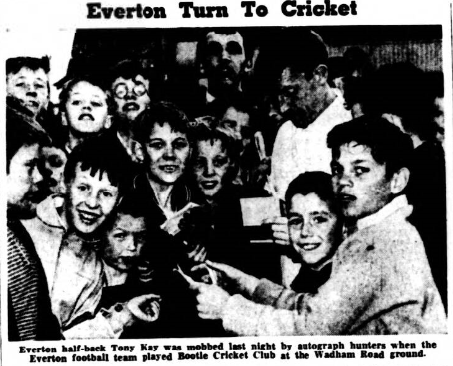
LETTER
By George Harrison
Liverpool Echo - Friday 09 August 1963
Mr. G. L. Holt, 38 Barnes Street, Liverpool 6, sends me a picture of the two football teams of the Laconia and the Ulster Prince, when they met for the old “Goodfellows Fun” in Liverpool. He tells me; it’s a pretty historic photograph in its way, for bang in the middle you will see none other than the great Bill Dixie Dean, next to his good friend the late Jimmy Best, senior. Dixie was referee for the occasions. At the time the picture was taken, he had captained Everton to the top of the First Division and was only about 18 months off the F.A. Cup Final at Wembley with ‘em. The picture was taken at the Cunard ground and I’ve often wondered in the years since then, how many of those grand Laconia lads survived,” said Mr. Holt. I am truly sorry I have been unable to give no more than snippets from these wonderful letters. But maybe I can do more on another occasion.
Note
Silema Wanderers, who meet Borough United in the European Cup Winners Cup, have accepted an invitation from New Brighton to play at the Tower on October 7. The Maltese club are due to play Borough at Wrexham on October 3. The following day their players and officials will attend the Everton v Arsenal match at Goodison Park.
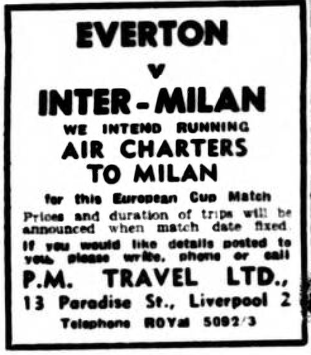
EVERTON WIN
Liverpool Echo - Saturday 10 August 1963
It took only 120 minutes for Everton F.C. to reach the required 119 runs and beat Bootle C.C. on the second evening of their annual cricket match last night. Albert Dunlop (39 not out) put Everton well on the road to victory. Second highest scorer was Gordon West (21), while Ales Young (14) shared a fifth wicket stand of 39 with Dunlop.

EVERTON AGREE TERMS FOR HILL
Monday, August 12, 1963 The Liverpool Echo & Evening Express
NORWICH FORWARD
SCHEMER
By Leslie Edwards
Everton and Norwich City have agreed terms for the transfer to Goodison Park of Northern Ireland International inside forward Jimmy Hill. The player a schemer, and utility man –he can play at either inside-left or right- is coming to Liverpool tomorrow to discuss personal terms and to see club houses. Mr.Catterick the Everton manager announced the deal today from Norwich where he had been on a mission which successfully everyone in the dark.” Hill stands 5ft 8ins and weighs 11 stone. He is in his mid-twenties joined Norwich from Newcastle United. He was born in Carrickfergus, Northern Ireland. Hill is more of a schemer than a goal scorer. The fee Everton are likely to pay is not disclosed.
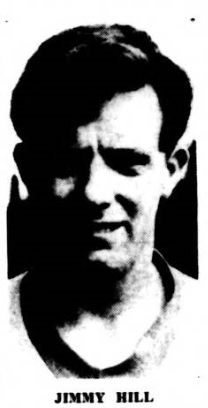
NORWICH STAR FOR EVERTON
Tuesday, August 13, 1963 Liverpool Daily Post
Terms have been agreed for the transfer to Everton of Norwich City’s Irish International inside0forward Jimmy Hill. Hill has played four times for Ireland –against Wales in 1958-59 and 1959-60 against West Germany in 1960-61 and Scotland in 1961-62.
CATTERICK MOVES TO REPLENISH STRENGTH
Tuesday, August 13, 1963 The Liverpool Daily Post
EVERTON WILL PAY £20,000 FOR HILL
NORWICH STAR AT GOODISON TODAY FOR MEDICAL
By Jack Rowe
Everton manager Harry Catterick yesterday made his first move to replenish the Goodison Park playing strength, depleted by the departures of Billy Bingham and Frank Wignall, by travelling to a secret rendezvous near the East Coast and agreeing terms with Norwich City acting manager Ron Ashman for the transfer of the East Anglican club’s Irish international inside forward Jimmy Hill. When he returned to Liverpool last night Mr. Catterick said Hill would be at Goodison today for a medical check and that once that was passed he was expected to sign. Although neither club would reveal the fee involved it is believed to be in the region of £20,000 Hill, in his middle twenties and known to Norwich fans as Tiger Hill has the reputation of being a clever ball player, quick off the mark and willing to shoot. He has played four times for Ireland- against Wales in 1958-59 and 1959-60 against Germany in 1960-61 and Scotland in 1961-62. He joined Norwich from Newcastle in June 1958 and has made 195 League and Cup appearances scoring 66 goals. Hill played a notable part in his first season at Norwich when the club reached the semi-final of the F.A Cup. When the then Norwich manager Archie Macaulay bought Hill from Newcastle he was a right winger and shaped only moderate until he was converted to an inside forward. That move transformed his whole play and led to his selection by his country.
CONTROVERSY
The decision to transfer Hill will cause controversy in Norwich and the club chairman, Geoffrey Watling said last night; “Everton have been interested in Hill and they are one of the top clubs in the country. “If we were to say ‘No’ just like that, a player like Jimmy would obviously get to know about it and realize he had lost his chance of playing in European Cup football, possibly at Wembley and had missed all the other great things that happens to a great club like Everton. “That is as far as we have gone, but is on good terms here, but we have let him go up to Liverpool to explore the possibilities. At the moment he has not signed. Possibly I will have something to say if and when he does.”
JIMMY HILL JOINS EVERTON
Tuesday, August 13, 1963 The Liverpool Echo & Evening Express
PASSES MEDICAL CHECK-UP AT GOODISON
FROM NORWICH
By Leslie Edwards
Jimmy Hill, the 27-years-old, Norwich City inside-forward signed for Everton this afternoon. The fee paid for this utility Northern Ireland International over whom the two clubs agreed terms yesterday is believed to be about £20,000. Hill was at Goodison Park this morning to negotiate the terms of his contract with Everton. This was done so quickly he was able to train with his new colleagues at Bellefield. The only formality afterwards was for Hill to pass the medical check which Everton make as a matter of course before they sign anyone, Hill did this at mid-day and signed shortly after 2 o’clock. The new man stands 5ft 8ins and weighs 13 stones. He was one of the heroes who helped Norwich to the Cup semi-final of 1958-59. Hill, who is married with a six-month-old daughter, first heard of a possible move at 9 o’clock on Sunday evening when Norwich manager Ron Ashman visited his home. He had re-signed for Norwich this season so the news of Everton’s interest in him came as a complete surprise. This afternoon Hill said he regarded his move to Everton as a challenge. The opportunities are there and it’s up to me now,” were his sentiments.
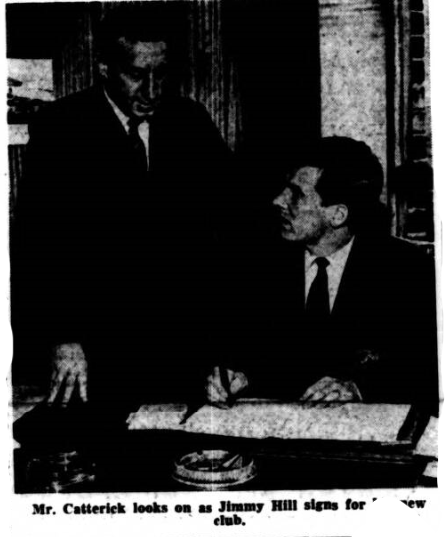
A SCHEMER, BUT HE GETS AMONG THE GOALS
Tuesday, August 13 1963 Liverpool Echo & Evening Express
By Leslie Edwards
If all the star players Everton were said to be about to sign during the past twelve months were laid end they’d stretch from Victoria Street to Goodison Park. Ironic, but apt, but Manager Catterick should swoop secretly for the one man they never mentioned –Matthews James (Jimmy) Hill, Northern Ireland International inside forward from Norwich City. The clubs soon agreed terms for Hill’s transfer and the player came to Liverpool today to negotiate a new contract and see club houses. The other and more famous, Jimmy hill is, of course the present Coventry City manager, the former bearded Fulham forward and controversial one-time chairman of the Players Association. Odd that Everton should go for one Northern Ireland player and let another one, Billy Bingham depart –all in the space of a few days. Could it be that recommendation of Hill came from Matt McPeake, the old-time Everton player, who is also from Ulster and knows the form of all Irish players? Or did it come from the former Derby County crickter and footballer, Harry Storer, recruited to Everton’s staff as Midlands scout mid-way through last season? Everton fans will be glad the club have still further strengthened their side. I take it that Hill, who is 27, will act as deputy, as and when needed, for either Roy Vernon or Dennis Stevens. It would not surprise me if Everton made yet one more move between now and the start of the season, if not in time for the Charity Shield match against the Cup holders, Manchester United, at Goodison Park on Saturday. Though Everton scouts cover so enormous area in their daily searches for talent the club are still capable of cloaking their real intent and Mr. Catterick’s performance yesterday was another indication of how wide of the mark guessers were when they “placed” him in Scotland over the week-end.
MAY CAUSE A STORM
If the transfer goes through as everyone expects there could be quite a storm of disapproval for Norwich. Hill, a slim pleasant character, was one of the heroes of Norwich’s run in the Cup semi-final in 1958-59 and has become tremendous popular with the crowd. His started his career with Newcastle United, after leaving his native Catterickfergus, but was troubled a lot there by a troublesome ankle injury. Indeed, when Norwich signed him from Newcastle in June, 1958 there was an understanding between the clubs that if his ankle trouble cleared up Norwich would pay a little more than the initial fee. This they did. He joined as a right winger, but his physique was not suitable for that position and he never settled down. He was on the verge of being transferred to Mansfield Town when manager Archie Macauley had a brain wave – he switched him to inside left. There his scheming –he is a great ball-player-gave him a new lease of life. He’s scarcely been out of the side meantime and has collected caps against Wales (1950 and 1960), West Germany (1960) and Scotland (1961). In 195 Cup and League games for Norwich he has scored 66 goals- not a bad record for a man stated to be more a goal provided than goal scorer. He was joint top scorer with 16 last season. Mr.Catterick’s latest move cuts the ground from under the feet of Mr. J. Hogan, of 76 Garner Avenue, Liverpool 4, whose letter on the need for another trade forward –a schemer –came to me only a day or so ago. Because this reader of the column weighed the Everton inept so accurately I give his “complaint” full reign. He says; “With the season nearly here I note the laudable efforts of Mr. Shankley to remedy Liverpool’s weak spot. One wonders, therefore, why Mr. Catterick with his vast financial resources is not engaged in a similar venture. Some people say Everton need another striker, I say they need a schemer. If we had one like Wally Fielding in the present forward line we should really go places. “Industry in a player is one thing but don’t let us confuse industry with achievement… Good work Messrs Catterick and Hogan.
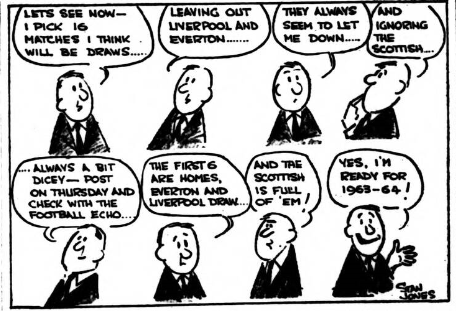
JIMMY HILL WILL SIGN FOR EVERTON TODAY
Wednesday, August 14 1963 The Liverpool Echo & Evening Express
£18,000 FEE AGREED WITH NORWICH CITY
MORE FORMIDIABLE TEAM ON WAY- HARRY CATTERICK
By Horace Yates
Irish international inside forward Jimmy Hill, of Norwich City, is expected to become an Everton player today. He spent some time at the ground yesterday and met the champions’ players, after undergoing the customary medical check-up to which all newcomers to Goodison and subjected last night manager Harry Catterick said; Everything appears to be all right. I cannot see any snags and Hill will complete the transfer forms today.” The fee agreed with Norwich City is £18,000and no doubt Mr. Catterick move to bolster his playing resource stems from the departure of Billy Bingham and Frank Wignall with the resultant weakening of the pool of players experienced enough to come into Everton’s League team in emergency. The speed with which Mr. Catterick went to work was dictated partly by the fact that tomorrow is the last day for signing of players eligible to take part in the forthcoming European Cup competition. Able and matured as Hill undoubtedly is, I do not believe for a movement there is an immediate intention to thrust him into the first team in preference to any of the neb who shot Everton to the top of the table last season, but it is an acknowledged fact that a team only as good as the reserves it has available in time of need
THE BIG TEMPERAMENT
In the event of injury or loss of form of any of the inside forwards. Mr. Catterick could turn to Hill with confidence, for while he has score recently; been playing in Second Division football, he has acquired the big match temperament when assisting Norwich to their Cup triumph of 1958-59 season, when they reached the semi-final of the competition and he has appeared for Ireland in four occasions. When Mr. Catterick first joined Everton one of his principal worries was the absence of what he considered really suitable immediate first team talent among the reserves, Hill’s incoming will not only become a new insurance, but at the same time will be a spur to the men in possession to keep right on top of their game.
EVERTON SOUVENIR
I have just received a copy of the Everton championship souvenir in words and pictures, now available at half a crown. In a foreword Mr. John Moores the club chairman, says it would be just if the directors failed to proclaim publicity, their gratitude and thanks to the prime movers in Everton’s 1963 championship success –the players. The men who for 42 slugging matches have invariably given of their best, win, lose or draw, men who have endured the quick swing from thunderous applause to ultra severe criticism, and have nevertheless done these job of course he firmly embraced within this vote of thanks . Quickly at all times – imperturbably when the going was a little hard –Mr. Catterick’s handling of the reins has been sure, firm and inspiring. He is ever the first to give credit for the great help of his most able assistance. It has been said that Everton are lucky in so far as it has the most able assistance. “It has been said that Everton are lucky in so far as it has the most doggedly faithful following of supporters of any club in the country. This can be believed and let no one doubt it- this type of support is of far greater value than just money at the turnstiles.
MORALE BOOSTER
The value of this support as a morale booster is not easily calculated. Its worth to the players is obvious. How inspiring how stimulating the Goodison roar must be to the man in the middle, only he can describe. There is no way of measuring what share in the championship triumph this vital support must have had. It is equally true to say it must be a great share. “One thing the fans can be promised. There will be no smug satisfaction, or sitting back contented with the club’s present position. The management are aware that the Evertonian knows, appreciates and very rightly demands football of the highest class. “The efforts to meet this demand may not always be spectacular –they will always be there. The management’s most strenuous efforts will be directed always to deserve continued success.
“May it be hoped that this book of triumph will be thoroughly enjoyed –and may it be joined by a library of others in the years to come.
MR. CATTERICK’S VIEW
Mr. Catterick takes a realistic view of the requirements of modern day football when he writes. “The yesterday’s are gone and today will soon be a thing of the past. It’s the tomorrow’s we must look to – and that means finding the talents to carry on when out present day stars no longer fill the bill. That’s not being hard hearted. It’s a down to earth sensible outlook. The keen sensible outlook. The keen Everton supporters will not be satisfied with past achievements. The fans went success and more success. To achieve this I feel Everton must have 15 or 16 players who can be labeled first teamers. I make it clear to all players that I am their boss –that all matters, between club and player must be dealt with by me. When it comes to team selection, I can choose only eleven. Those left out must fight to win back their places. There is no room for complacency in any plan for success. We want only players who will bring glory to Everton. That is our aim whether we are handling out big fees by finding the youngsters full of football promise. “Last season was a wonderful season but I feel there is a more formidable Everton on the way. “Now we have three immediate targets –the League title, the F.A Cup and the European Cup. I’m doing that Everton supporters will be cheering at least one of these successes in 1964. The book is full of excellent pictures, statistics and biographical details together with autographs of all the stars, and a wonder job of rejuvenation among the directors. I think this is a publication which most Evertonians will wish to have and if the sale is commensurate who will begrudge the reward it will bring to the players?
HIS DREAM TEAM
That incomparable champion of Wally Fielding, Mr. A.J.Higgins or Great Crosby, now comes up with his dream for Everton this season. He says “In less than two weeks it will be time once more for long or joyous faces. As a true Blue I hope that the coming season will see the championship trophy staying in its rightly place at Goodison Park with the F.A Cup thrown in for good measure. A publicity friend of mine a red hot Liverpudlians is yearning for the day when Liverpool Corporation take over Goodison Park as a corporation council estate if the then Liverpool manager lays the first brick he will be close behind with mortar, trowel and the second brick. Being a little broader minded for my part if Everton can’t do the double well let Liverpool share the spoils even though I would only visit Anfield. If Everton were playing, there. Good luck to both teams. If is high time that the North, Liverpool preferably; stole the thunder-shredded wheat and all that notwithstanding.”
BUT NOT THE CUP
The Liverpool Echo & Evening Express – Thursday August 15, 1963
By Leslie Edwards
Manchester United haven’t won either of the two full-scale public games they have played so far this season, but they will be all the better, at Goodison Park on Saturday, for having been fully extended by Eintracht in mid-week and by Glasgow Select last Saturday. Everton have confined themselves to full-scale trial among themselves at Bellefield. The news about the likelihood of Denis Law being fit for the Everton match is good. I hear he was left out of the partly which went to Germany more as a precaution than anything else. He is suffering a pulled thigh muscle, but there are good hopes that he will be fit for the Shield game. None of the United team which met Eintract suffered serious damage, so the chances are that both League champions and Cup holders will field the teams which won the honours a season ago. United fans will be at Goodison Park in force. For some reason no one has thought fit to ask United to bring their trophy with them. To have paraded the two major trophies of professional football round the ground before the game would have been an attraction- unless, of course there are fears that some of the train bandits might appear-dressed as mascots for the occasion. Time was when clubs paraded their trophies on their board room sideboards. In 1963 it is the hardest thing to discover just where the baubles are held for safe keeping. Incidentally the Everton souvenir edition we publish on Saturday morning has an unusual picture of the late W.C Cuff when the club possessed even if only temporarily both F.A Cup and League championship trophy. They won the League in 1931-32 and the Cup in 1933 and clearly had possession of both trophies for some time even though their performance did not rate the orthodox “double.” “When one wonders will the two trophies he held by one of our clubs again?
UNITED GAME PLANS
Everton announce that for the game against Manchester ignited, at Goodison Park on, Saturday. Ground and paddock season ticket holders can enter at the season ticket turnstiles, tendering spare coupon No 43 and the necessary each. This will save them queueing at the cash gates. Ground season ticket holders will hate entrances at each end of Goodison Road and:paddock season ticket holders entrances at either end of Bullens Road.
ROY VERNON SAYS…
Liverpool Daily Post – Friday, August 16, 1963
EVERTON RE HUNGARY FOR MORE SUCCESS
If last year was a season of great expectations for Everton, this season of necessarily be a season of even greater expectations, for having tasted success the lads at Goodison have developed an appetite for more, and with the European Cup as a new and dazzling attraction we can hardly wait to get started. As it will be our first venture in this competition, I hesitate to make any sort of predication except to say that if we will be inclined to fancy our chances more than a little, but nearer home I cannot see any club better fitted to win the Championship than Everton. I may b wrong, but I feel that with the knowledge that we can face the rest of the League and beat them we are confident that with a settled and reinforced side we will whip them again.
A GUARANTEE
One thing we do not intend to do, and that is win the title twice over as we had to do last season. Remember, we were out in front at the time of the freeze-up, and had there been no alt that is the way it would have stayed, but it would have stayed, but then came the slips, leaving us to win the title all over again in the last round-up. The electric blanket now laid at Goodison should be a guarantee against any weather upsets this time and in a full-scale practice match we had with the reserves at Goodison Park on Wednesday, the first team played almost as though they had never final tally was something like 7-1! The Charity Shield game with Manchester United tomorrow will give us a sterner test, especially as Mr. Busby’s boys have already undertaken two full matches against first team opponents. United were last season’s mystery side so far as I was concerned. Two of the best games were against them, and it was my firm opinion at that time of there was one club which would be treading on our heels for most of the way in the title hunt it would be United. They failed to live up to expectations, and then finished in a blaze of Cup glory. It is certain to be a great battle tomorrow, and although in a way it is a pipe-opener for us, I have no fear United will come to Goodison and conquer. Our wonderful consistency in front of our supporters was a great plank in our championship platform, and I believe it will be the same again. Hospitality at our ground will start only after the matches are played! Since we ran down the curtain we have parted company with our friend, Billy Bingham. We shall always have a kindly thought for Billy as he continues his career with Port Vale, and to him like Frank Wignall at Nottingham Forest, we offer our best wishes for their success. My reading of the crystal ball is that Tottenham Hotspur’s challenge not fade a little this time and Burnley will find the going harder. It may be that Leicester City and Liverpool will he hotting up the pace- but only as challengers, not leaders! The Everton players are rented a shop close to the ground for the sale of our club brochure. We have all spent a lot of our spare time getting the place ready and we are hoping it will be opened to-day. There are 30,000 copies printed and I expect that by week-end well over half of them will have been solid. On Tuesday, the figure was 11,000 and I don’t think we are being too optimistic in looking forward to a complete sell-out. Nothing would pleas us better than to order a reprint!
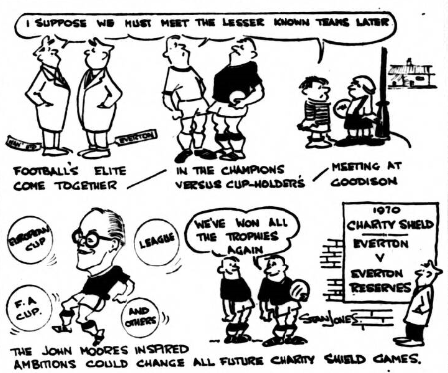
EVERTON AND UNITED AT FULL STRENGTH
Friday, August 16, 1963 Liverpool Echo & Evening Express
F.A. CHAIRTY SHIELD
AT GOODISON
By Leslie Edwards
The identical League championship and Cup-winning elevens of last season will play for the F.A Charity Shield, at Goodison Park tomorrow (3.p.m). Both Everton and Manchester United have full-strength teams. United had doubts about Denis Law, but he has passed a fitness test. Everton’s new signing Jimmy hill from Norwich, is without a game not being included in the Everton reserve side which plays a friendly at Wellington Salop. Everton; West; Parker, Meagan; Gabriel, Labone, Kay; Scott, Stevens, Young, Vernon, Temple. Manchester United; Gaskell; Dunne, Cantwell; Crerand, Foulkes, Setters; Giles, Quixall, Herd, Law, Charlton.
Everton Reserves (at wellington)-Dunlop; Parnell, Thomson; Jarvis, Heslop, Harris; Shaw, Harvey, Russell, Wright, Veall.
CHARITY AT THE GATE AND ON FIELD PLEASE…
Friday, August 16 1963 Liverpool Echo & Evening Express
By Leslie Edwards
What is the F.A Charity Shield? And why is it? Because so little is known about the trophy for which Everton, league champions and Manchester United Cup holders, complete here tomorrow I thought I had better find out. It was presented away back I 1908 by the late Lord Kinnaird, for competition between the Football League champions and the champions of the Southern League- in those days a much stronger set of clubs than they are now. The first winners? Manchester United! They beat Queen’s Park Rangers 4-0 in Manchester. Lord Kinnaird’s motion about the Shield was that all proceeds from the match should go to charity with the Football Association of which he was president, and the competing clubs naming the organization which should benefit. Thus tomorrow game is one of the few during the season at which all pay. Everton have played for the Shield twice before – first in 1928-29, when they won it by beating Blackburn Rovers 2-1 and then in 1933-34, when they were beaten 3-0 by Arsenal. There were a few seasons when the Shield was completed for by teams representing amateur and professionals. Mr. Joe Richards, one of the Football Association’s senior Vice-Presidents, and President of the Football League is to present the trophy. Let us hope there will be charity on the field too. To have your captain sent off in a friendly before the start of the season was not a happy beginning for Manchester United. What we want from the teams tomorrow is an exhibition of football arts and no rough stuff. There are in the sides players of sufficient talent to make the game memorable for its fine football. After all we don’t want a contentious battle in a competition the result of which is almost of academic interest.
PILLARS OF THE PLACE
The Manchester United Chairman, Mr. Harold Hardman, who adorned Everton teams of pre-war days as an amateur, usually misses all his side’s clashes against Manchester City because the “atmosphere@ upsets him and tends to spoil the match as entertainment. But he will be present tomorrow to renew old friendships made in this city and so will that other pillar of the Manchester United edifice, Matt Busby, the greatest wing half-back ever to pull on the red of Liverpool F.C. Manchester United have been linked with the city in many notable ways. They once won a notable Cup success at Goodison Park –and not against Everton. Liverpool had borrowed the ground for the day because the tie which should have taken place at Manchester could not be put on there owing to both clubs sharing the City pitch for a season or so after the war. United repeated that Cup win at Anfield in more rent times and then, for good measure put Everton out at Old Trafford when it seemed likely Everton would get a semi-final place, at least. But in League games in recent times Everton have been United’s bogey side, with goalkeeper Albert Dunlop –did he not make his brilliant debut against United if Manchester? –usually defying them with magnificent goalkeeping. Considering the ravages of time and of the Munich air crash, United are a remarkable club. They were not fancied for the Cup a season ago and their League performances left a lot to be desired, but when all was to play for at Wembley they put forward a special effort and their triumph was memorable. Just as well they won because Leicester had done so they semi-final against Liverpool would have seemed in retrospect even less worthy.
UNITED MERCURIAL
Because the game has prestige value and because a winning bonus is a winning bonus for a that it could be harder fought than I anticipate. United have had two hard friendly matches to get acclimatized to the new season, Everton will be all out to start as they left –with a victory against Fulham who oddly enough start the League season just a week hence. The attractiveness of the visiting side, likely to have a fully fit Law in their attack and the heightening of interest in Everton now that they are qualified for the European Cup, is likely to produce a big attendance. It depends on the weather and whether Mum insists on a last run in the car, whether it will reach fifty of sixty thousands. The new stand seats under the Bullens Road “umbrella” will be used for the first time; fans elsewhere will find better comfort, I think from the many new tip-up seats installed during the close season. Because Everton proved themselves the best side in England last season over 42 matches and because the Cup produces not the most consistent side but the one which takes its chances best. Everton should win with something in hand. The trouble is that United are very mercurial. They can rise to an occasion. Whether this one will inspire them to do it can only be answered by the scoreline tomorrow evening when the first of a new series of the Football Echo will start the new and, we hope momentous season off with full cover of the big game here and will include the other soccer features which have become so popular with fans in the North-West. This is a match which could become the first of many showpiece fixtures at Goodison Park. Let us hope it brings honour to both clubs, whichever side wins, and to the new capacity crowd whose reputation is likely to depend more and more on their behavior at games limelighted for all the world of football to see.
EVERTON READY FOR THEIR GREATEST SEASON
Liverpool Daily Post – Saturday August 17, 1963
VERNON LEADS TO-DAYBUT SKIPPER WILL BE NAMED DAY BEFORE EACH GAME
By Horace Yates
A supremely interesting attraction to introduce what could be the most rewarding season in the long Everton history, is assured by to-day’s clashing at Goodison Park of League Champions Everton with the F.A Cup winners, Manchester United, in the F.A Cup Charity Shield match. If Everton had been asked to name three sides, one of which they would have chosen to play above all others, as a curtain raiser to the League programme, I am certain United would have been one of them. The other two equally certain would have been Liverpool and Tottenham Hotspur. There is therefore, no compliant that United, by their own merit, have qualified for the role. If conditions are favourable I would not be at all surprised to find an attendance in the region of that which saw last season’s League clash at Goodison between the two sides. To refresh your memory those figures were 69,501 and then, as now, it was the first home game for Everton. Only once was there a higher attendance –the 73,000 to greet the appearance of Liverpool. Those who will go to the ground to-day expecting to see the championship flag fluttering proudly from the club mast, are, I am afraid, due to be disappointed for when I spoke to manager Harry Catterick and secretary Bill Dickinson last night neither was aware of the existence of any official pennant.
THOUGHTLESS OMISSION
It seems a thoughtless sort of omission, for it would be no great hardship on the League to provide such a recognition of the most difficult feat in football. There is nothing, I suppose, to prevent any club from ordering a flag of their own, suitably inscribed, but this is the sort of presentation which should be made at the time the Cup is handed over. If any evidence were needed that the burning enthusiasm which lit up the Goodison scene during the momentous days of last season, it was forthcoming by the announcement, yesterday, that the Everton championship sourvenir, of which 30,000 couples, of which 30,000 copies were printed, is already a complete sell-out. A reprint of this striking publication has been ordered and it is hoped to have them on sale today in a special office opened for the purpose by the players, close to the ground. If we are told on Monday morning that the reprint has gone as well, it would not be surprising in the least!
EVERTON FEVER
The Everton fever has merely been dormant during the last few weeks. Today will see it break out anew and no one will wish to attempt a cure. Those who may be inclined to regard this clash as merely a full dress rehearsal of the show proper, would be just about as wide of the mark as it is possible to be. This will be a genuine Cup-tie for spirit, enthusiasm and the will to win. Fortunately Manchester United expect to field the side which snatched undying glory from a triumphant Wembley display, which helped to prove that top class football can be played at the stadium in a Cup final. Just as happily, Everton are in a position to announce their complete championship side for while Albert Dunlop was a goalkeeping deputy when the title was actually clinched Gordon West was an ever present until eliminated from the last four matches by a shoulder injury, and now he is back between the posts. The signing of Jimmy Hill from Norwich City during the week raised a doubt in some minds as to whether Mr. Catterick would find in the attack, but it seemed reasonably certain that he would leave well alone and let Hill prove his entitlement to a position before giving it to him. Hill will be at the game to see how his new colleagues shape in earnest and to form some idea of the standards he will have to attain if he hopes to oust an established player.
TEMPLE’S CHANCE
We have heard little in recent weeks of any Everton intention to splash one of their big cheques n an outside left, and this, I think, is an open acknowledge of the abundant promise shown by Derek Temple finale. Temple has everything he needs not only to make the position secure for himself but to become one of the most brilliant performers in a role which has few outstanding performers. Temple can do the job most successfully, and once he is fully convinced of that fact his greatest trouble will be over. The cheering in the announcement that Dennis Law, surely one of the most brilliant inside forwards in this or any country, has recovered from the thing injury he received last week in the game against Glasgow Select. Studded as it is with brilliant names, much of the United team glamour departs when law is not there to inspire with true artistry. The match is very important for both clubs, for Everton will want to prove the theory that this season they will be even greater than last, and United perilously close to relegation at varying times must take their Wembley display as a goal to be maintained in their endeavours to challenge Everton for a top place. Their indifferent displays from time to time were a major mystery, but now that there is a pardonable pause in team building many of the unhappy memories should be wiped out.
RIGHT NOTE
Mr. Catterick strikes the right note in his approach to this battle. It must be taken with maximum seriousness “he said. “I am looking to every player to do his best, for only by doing just that will their justify their places. “At this stage there are twenty-two clubs in the division, all determined to make this their season. Only about half a dozen will come near that goal and all I am prepared to say is that I hope and expect that Everton will be one of them. “Last season the side was maturing and should be better for their experience. Record wages were drawn by the Everton players in their Championship campaign, but the opportunity is there for them to leave those totals well behind this time. Every Everton player is able to negotiate individual terms and while almost all of them are now on two year contracts, past experience has proved to them that the Goodison Park club are not ungenerous give them the excuse. When Everton run on to the field to-day Roy Vernon, skipper in all but one of last season’s matches, will again lead the side, but, he was informed yesterday at the players’ meeting that he would be captain, but I gather that Mr. Catterick has turned his back on the policy adopted by most clubs of naming a club skipper for the season. I understand he will nominate a skipper before each match. That does not mean that there will be a different player tossing the coin before every game. It may well be that Vernon will again retain the role. Certainly Mr. Catterick and the chairman, Mr. John Moores, were delighted with the way Vernon rose to the challenge, particularly in the vital closing weeks of last season. His personal example was a big factor in the clinching of the title. It may be worth recalling that in the last seven matches, which produced 13 points. Vernon scored in every game except against Tottenham, a haul of eight goals, some of the most vital h has hit in his career. Goodison Park has seldom looked better and on a picture of a pitch some of the most talented players in the land should produce football in keeping with the surroundings. I don’t think we will be disappointed. Everton; West; Parker, Meagan; Gabriel, Labone, Kay; Scott, Stevens, Young, Vernon, Temple. Manchester United;- Gaskell; Dunne, Cantwell; Crerand, Foulkes, Setters, Giles, Quixall, Herd, Law, Charlton.
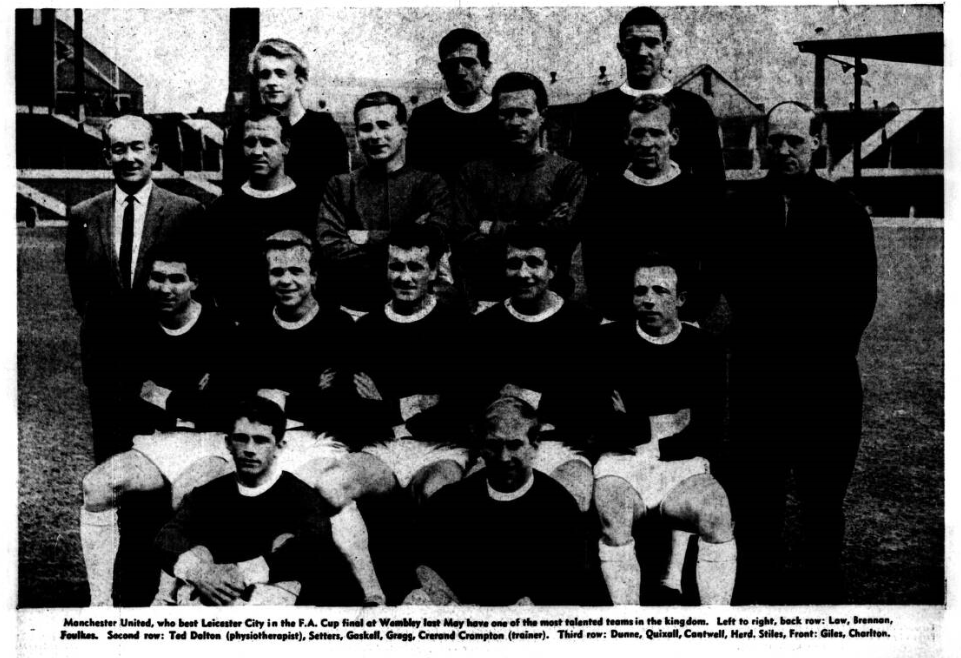
ALL-OUT FOR EUROPE’S CUP
Liverpool Echo & Evening Express - Saturday 17 August 1963
NO RASH PROMISES-BUT WE LOOK FORWARD WITH CONFIDENCE
Says John Moore, Chairman of Everton F.C.
Everton, at the moment, are Champions we're proud of it, willing to talk about it. Proud also of our third and fourth teams, each champions of their own divisions. And of our second team who finished higher in their League than for many years. To have finished the season so successfully is in no small measure due to our coaching staff. Under the firm leadership of Harry Catterick they all pulled together doing a magnificent job. Everton directors are more than satisfied with the overall result. Whilst we did far better than we expected lost year, we mustn't make too many rash promises for this season. But we have learnt a lot; we're all in good heart, and we are looking forward confidently to a successful season. I am constantly asked what our plans are? We have two. The immediate one is the all-out battle for the European Cup. The long term one is a deliberate planning for the years ahead. The European Cup sets a tremendous task. Can Everton succeed where Spurs, Burnley, Wolves and Ipswich all have failed? Can the Continental grip of such teams as Real Madrid, Benefica and Milan be prised loose? These are absorbing questions. They are difficult to answer. The strategy of the Continental teams playing in the European Cup is by now widely known. When playing away, the blanket defence with a draw, or at least a minimum goal deficit in mind; then when playing at home a brilliant all-out attack urged on by the near-hysterical support of a fanatical crowd. That these methods are not always productive of attractive football, is admitted, but this is the strategy adopted and one we must be prepared to face. The interpretation of rules by some Continental referees is another hazard. Heavy penalties have been inflicted time and again for what to us is just orthodox tackling, and we have seen the some referees turn a blind eye to body checking and shirt pulling which to us have seemed to be flagrant obstruction. The tactics of these European Cup games have unsettled British players, and the claim is frequently heard that "conditions put us off our game." As to the justness of these claims I myself am very dubious. My own feeling and opinion is that players in the top grade International football should have the skill, experience and intelligence to adjust themselves to playing under any conditions, with a self-control that refuses to be influenced either by unusual refereeing decisions or the mob hysteria of the crowd.
EASY ENOUGH…
To play well when everything is in his favour is easy enough, but the world class footballer must be able to produce results with the odds against him. Surely one of the attributes of a world class player is to be able to rise above prevailing conditions and conquer adverse circumstances.Can Everton players rise to the challenge when they face their Continental baptism of fire? This remains to be seen. They should and under Mr. Catterick's shrewd guidance I think they will. Turning to our prospects in the League and Cup we believe that success will come if we play attractive football, coupled with the will to win. The first and foremost aim of Everton directors is to offer crowd-pleasing, attractive football, especially as good football is appreciated in this city more than anywhere else in the country. But crowd-pleasing football should also be winning football. Modern football is a highly competitive business in every sense of the phrase. Crowds for the most port do not want to see pretty, exhibition football; they want the emotion-stirring thrills of the tough, hard cup tie, the desperate battle for promotion, the breathless chase of the final points to clinch a championship. This is the type of game the crowd wants. It is in this stern competitive type of football that the British professional footballer shines.
THREE VIRTUES
Modern professional football demands three major virtues – skill, courage and stamina. When these are allied to an inflexible will to win the player becomes a fine character. This is the calibre of the top-grade British professional. Some players earn big money. They usually deserve it. Giving of their best of all times, continually pushed by their Manager, avoiding the prima - Donna temperament, accepting a drop into the reserves during any temporary loss of form. Could those writers and fans who so often grumble about our leading professionals take it in the same measure? Goodison fans demand and deserve entertaining football. They also demand a winning team (or throw cushions!) so from time to time we might find it necessary to sign on outstanding player from outside. But it will always be our main policy to rely on shrewd management and the promotion of young professionals from our own stable. And were very hopeful of being able to do this as at the present time we have a number of apprentices and young professionals of outstanding ability who we are confident will develop into very fine players.
Big money
These youngsters not only have the prospect of earning the big money which a career in football offers to-day, but they have the opportunity through the club of furthering their educational or vocational training. As soon as aboy joins us, experienced interviewers ascertain his wishes, inclinations and needs, and then special facilities are arranged for his further education in accordance with his desires. The club allows him the required time off and pay all necessary fees. This scheme is the first of its kind in this country we believe—and we realise its value and its importance in connection with the training of our boys. The scheme is developing intelligent, well-educated, well-couched player material upon which we hope and plan to build successful Everton teams of the future. In the near future a particular problem arises from the Eastham case. The position at the moment is obscure, and until there has been further clarification comment must wait. Judgment was based on regulations operating in 1959/ 60, but these regulations have already been altered, and will no doubt be further altered before very long. Players may perhaps have a genuine claim to be more free than they are at present, but it is difficult to see how, if there were no transfer fees, the game could be administered on a practical basis. There are many small clubs over the length and breadth of the country training and producing skilled professionals who otherwise might find it very difficult to enter the paid ranks. Many of the smaller clubs depend, to a large extent, on transfer fees. The transfer fee, going as it does from the richer to the poorer clubs, helps to keep football alive in some hard-pushed areas.
National . . .
We must always bear in mind that football is a national game. It is not the game of a dozen highly-paid teams in half-a-dozen big cities, but of the people in places such as Wrexham, Torquay, Gateshead, etc., where the football enthusiasts are just as much entitled to see professional football as in London, Birmingham or Liverpool. The severe winter brought football to a standstill in Britain last season. At Goodison the icing-over of the whole ground necessitated the use of strong de-icing agents, which not only deiced, but also de-grassed the pitch, leaving us with the unenviable and difficult task of re-seeding it. Fortunately, our ground is exceptionally well drained, and the new turf is growing strongly. The ground staff deserve special tribute for the splendid job they have done. We pray it will never have to be done again. We now have a soil warming scheme, with low voltage wiring placed some six inches below the surface. This method uses a small amount of current, and that only when the special cheap rate is in force between midnight and 8 a m.
Usable all season
This same system proved very successful at Murrayfield in Edinburgh when the ground there was usable during the whole of the very severe weather of last winter. We still had most of the gear previously used, valued at between £10,000 and £12,000, and to put the scheme into operation only needed another £2,000 / £3,000 for new wires. Now I think we have one of the finest all-weather playing pitches in the country. Whilst our first aim is to provide attractive football, we are also planning to provide better spectator conditions; to afford as much comfort and weather protection as can be given. Indeed, our plans for the bodily comfort of the Everton fans ore quitebold and for-reaching, but to a certain extent they are governed by the financial position of the club. If the generous support we have received continues our plans should become concrete. The major need is more covered accommodation for spectators. Tough and game though the Everton supporter is, some of the Merseyside weather would test the hardiness of an Arctic explorer, let alone a Goodison fan. We have definite plans to afford adequate shelter from the wind and rain. We have taken a big step forward in this direction with additions to the Bullens Road stand, where we have built additional seats and installed a cantilever roof over the whole of the paddock.
Goal stand next
This roof will afford adequate protection for the majority. Even when the wind is blowing the "wrong" way only those at the front of the paddock will be subject to weather. So we will go on giving urgent consideration to covering other parts of the ground. The goal stand, a monument of bad design, is one of the biggest problems. With the only entrance and exit at the front, a spectator at the back of the stand is there to stay until the end of the match unless he cares to try his physical strength and verbal with in a fight to get out during the progress of the game. Once out, it would be a brave man indeed who tries to regain his place. Behind there is space to spare, and the stand should be re-built as soon as possible, being replaced by a modern version. This would be a major step forward. More comfort and more inventence is what we plan.
Finest supporters
Everton have the finest band of supporters in the country. Fans who know their football, who demand the best play and players and who soy that only the best football is good enough for Everton. The Everton directors are determined to leave nothing undone to give Evertonians a team that can be reckoned amongst the finest in the world together with the best possible spectator conditions. With a continuance of good gates we will do this, too. Everton ore one of the oldest professional clubs; they were playing football even before there was a Football League. In fact, Everton helped to form the Football League as we know it to-day. At Goodison Park we are all unanimous in our determination to do everything in our power to faster and further the game which has become almost part of our national heritage.

“WE INTEND TO STAY AT THE TOP”
Liverpool Echo & Evening Express - Saturday 17 August 1963
INTER-MILAN TIE CANBRING PRESTIGE
By Harry Catterick, Everton F.C Manager
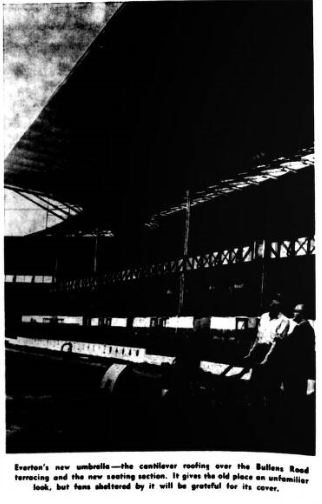
Are we on the thresh-hold of an entirely new Association Football era in this country? The disappearance of the maximum wage clause two years ago, allied to the probability that rules may have to be redrafted to allow for longer-term contracts between club and player point to this. Certainly, if this happens, then will clubs and greater there onus on clubs and managers to select the right material. This will mean, inevitably, a better deal for the good player with corresponding harder times for those who are not so good. The next question, of course, is if this points to the formation in a relatively short time, of a super league? The formation of such a league, however, could not and would not happen overnight. To begin with we are all members of the Football League. It is a league which has withstood the passage of time remarkably well. As an institution it is far stronger to-day than a hundred years ago when it first came into being. A dozen or so clubs would not just walk out and say; “right from now on we are the Super League!” However, I visualize the possibility of the League itself forming a so-called super league. Assuredly our opponents will be taking stock of our players and system. Our present system, after all, is admired throughout the football-playing countries. It has been a model for the rest of the world and, I humbly submit, is still just that. Moreover, let's assume the break-away of a dozen clubs into a super league. What happens to the two teams who finish at the bottom at the end of the season? No matter how expensive the players or how great the wage bill, one team must finish last. Are they to retain their place and just carry on? Is this what the football public really wants? Or do they feel that promotion and relegation supplies some of the real thrills of this great game of ours? I believe they do, for while no fan likes to see his team relegated, without relegation, promotion would not be possible either. The fan demands a great deal of entertainment and excitement for his money and our present system ensures that he gets it.
FURTHER GLORY
The winning of the League championship today, too, brings further opportunities for glory world glory in the football sense. I refer, of course, to the European Cup competition together with its younger brother." the Cup-Winner; Cup. Manchester United, Tottenham, Burnley and Wolves each made some progress in the European Cup which brought glory to the players, greater experience and cash to the coffers of the club. Spurs' magnificent effort in winning the Cup-Winners’ Cup brought a tremendous upsurge of enthusiasm in this country. That allied to the equally spectacular feats of the England team on the Continent during the close season has given English football a tremendous fillip. Naturally, we at Goodison Park are hopeful and, indeed quietly confident of adding to our improved prestige in this respect. Inter-Milan will be our first-ever opponents in our initial bid to gain acclaim for Everton on the football fields of Europe. We realize the immensity of our task. Indeed, we hope our opponents also measure Everton as an equal threat to their lio2cs of progressing in this highly attractive competition.
TEAM SPIRIT
I referred to our own quiet confidence. Let me explain. When the draw was announced, many people uttered the words "poor Everton." as though wewere going like the proverbial lambs to the slaughter. Let me; therefore, put on record the remarks of the players "Well boss." was the general opinion, "we're meeting the best teams in the world in this competition. We've got to meet such as Inter sooner or later. We might Just as well meet them now!" That is the sort of team spirit which helped materially to bring honours to Goodison Park last season. We are a comparatively young side. That experience will have been of immense value to the players. They lived under constant pressure and tension nearly all season. The European Cup, difficult though it is and I am too much of a realist not to appreciate the tremendous fight, determine and skill we will have to call upon to progress against the finest club sides in the world cannot, in the early stages at least, produce more tension than a First Division championship fight. I feel that our supporters too, will have to appreciate the different outlook that may be forced upon us in these games. It has been most noticeable that defensive tactics have predominated this competition. Teams scoring a goal have been content to play in their own half, denying space to the opposition
SECRET IDEAS
I am not suggesting that we, too, will adopt these tacks. We have a few ideas of our own, but they are being worked out secretly. Some will be discarded: others will, no doubt, prove to be less effective against Continental opposition than we had hoped: others, equally, will be highly effective that is why I shall take any opportunity that present, itself 'o watch Inter in action before we meet. Assuredly our opponents will be taking stock of our players and system. At this tremendously high level of professional football, managers, coaches and players become somewhat like chessmen. Very little, indeed if anything, can be taken lightly. Every move and counter move has to be methodically planned.
DEEPER INTEREST
That is why I say that our supporters will have to be prepared for games that may be less exciting than ordinary League or Cup battles, but will be of deeper interest to these fans who are prepared to take the game seriously and study the basic pattern of play presented on the field. There will be exciting moments but against such highly skilled opponents it is not only a case of the survival of the fittest, the most mentally alert, the, most skillful, but also of the side than on the particular occasion makes less mistakes than the opposition. Nerves, tension, method. All this enters into it; I think that our quite remarkable record last season proved finally that we were the best equipped side to represent England this year in the European Cup competition. We are well aware of the tense battles that face us. We have applauded the efforts of other English clubs in this competition. It has brought home to our footballing millions the wonderful play of surely the greatest club side of all time, Real Madrid. It has made household words of names like di Stefano, Puska, Gento, Santa Maria. Of wonderful little Benfica, who toppled these mighty champions from their perch. We are new to Europe but hope to make many new friends; we would like to think that Everton's name becomes as respected abroad as it has always been at home.
TRADITION
We, too, have a tradition at Goodison Park and hope to be adding to it in the weeks to come. If sooner is going to become more world-embracing with teams from every Continent participating in a super league or super cup competition, then, naturally, we all hope that Everton will be fore-most amongst the British clubs competing on equal terms with great overseas sides. Having reached the top, it is our intent and purpose to stay there. These are not brash, over-confident words. It is merely the desire of everyone connected with the club. We have wonderful support and supporters, excellent facilities that are improving all the time and a bunch of lads who have given me everything they have since I took over. We’ve had problems and difficulties, but we have always talked them over and reached agreement. I hope they do well for their own sakes as well as the club’s. Certainly no club that has preceded us into Europe will be trying harder. That’s for sure!
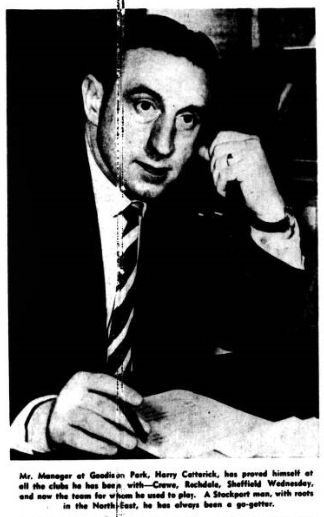
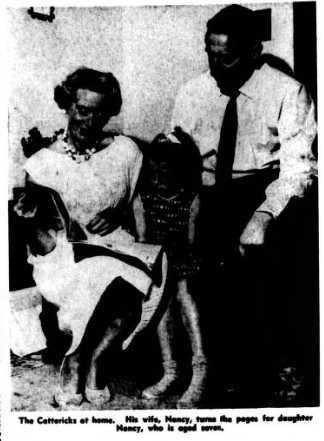
EUROPEAN CUP CAN BE TOUGH
Liverpool Echo & Evening Express - Saturday 17 August 1963
By A Special Correspondent
The European Cup is not all glamour. It can be tough when tempers are roused. And though we areapt to take it for granted that our players are flying into the sun every time they play abroad, some ties have been fought out in conditions every bit as miserable as we have experienced on a wet winter afternoon on Merseyside. For confirmation we have only to refer to Alex Scott, who became one of Britain's most experienced European Cup fighters in his days with Glasgow Rangers, and can claim to be one of Britain's leading goal scorers in the tournament. Scott will remember a nasty night in Brussels four seasons ago when the Belgian champions, Anderlecht reacting furiously against a heavy defeat in the first leg in Glasgow, played it so hard that the right winger was sent crashing against the barriers outside the touchline and played on pluckily with his head swathed in bandages. Scott, too, could tell you about his only previous European Cup trip to so-called “sunny Italy.” Like Everton this year. Rangers had to visit the city of Milan. Their opponents in 1957, however, were A.C. Milan, the present holders. Well-beaten in Glasgow, the Scots had a weary trip as fog caused the diversion of their plane to Turin and the journey was completed by bus.
EXPERIENCED
On the night of the match it was teeming with rain. The realistic Italians, knowing that their supporters would not turn out in strength in such miserable conditions, used an old, small stadium in the city and Rangers were beaten again before a crowd of only about 3,000. To-day, Alex Scott must be easily the most experienced European Cup fighter attached to any English club. His old club has played in 22 games to date and his youthful Scottish rival, Willie Henderson, only came into Rangers’ European Cup team during their last campaign in season 1961-62. Everton right winger also has the distinction of being included in the most recent complete list of leading European Cup scorers, which was compiled last year in one of the publications of L’Equipe, the famous French sporting paper which started the tournament in 1955.
STEFANO LEADS
Place of honour in this list, of course, went to Real Madrid’s Alfredo Di Stefano, with (at the time) 43 goals since the start of the tournament. The best British scorers were Denis Violett (13) and the late Tommy Taylor, of Manchester United (12). Scott was credited with nine goals and also had the highest total for any Scottish club in one season with five – including a hat-trick. Centre-forward Alex Young also had European Cup experience, though on nothing like the same scale. He was absent on Army service when Hearts were knocked out by the Belgians Standard of Liege, in 1958, but played in the home and away ties against Benfica two seasons later. It is worth recalling that the fair-haired Scot might not have come to Merseyside at all if he could have pulled out his best form in the away game, for Emil Osterreicher, then technical director of Real Madrid, flew to Lisborn to watch him. Alex, did not have an impressive match in a well-beaten team and Osterreicher’s snap verdict at the time was “A very clever technician, but too slow for the best Spanish football.”
WOLVES BEGAN IT
The European Cup, which at some time next season, will record its 15,000,000th spectator, started in a comparatively modest way in 1955. It was the inspiration of the managing director of L’Fquipe, M. Jacques Goddet, and the story goes that two impressive games by Wolves against top foreign opposition in the previous year, played their part in giving birth to the idea. After Wolves had beaten Honved (Hungary) and Moscow Spartak at Molineux an English nations) paper announced with brash confidence; “Wolves are the champions of the world.” In an editorial a few days later L’Equipe commented acidly; “Perhaps it would be better to wait for the return games in Budapest and Moscow before proclaiming the invincibility of Wolverhampton. There are of course, other clubs of high standard like Milan and Real Madrid…However; the idea of a club championship of the world ought to be seriously considered.”
F.I.F.A. BLESSING
In 1955 the directors of L’Equipe approached the European Union to suggest the launching of the European Cup, like official soccer bodies the world over, the U.E.F.A. was slow to make up its mind about a new venture. But when the newspaper director went ahead themselves by inviting representatives of selected clubs to a meeting in Paris the world body, F.I.F.A., stepped in to give its blessing to the tournament, and authorized the European Union to take over the organization. Eighteen clubs were invited to play in the first competition. The Scottish F.A gave permission to Hibs, of Edinburgh, to participate although the club, which was invited had finished only sixth in the Scottish League. Chelsea were invited as England’s representatives, but decided not to accept as the Football League frowned on the idea. In the first tournament Hibs set an encouraging pattern for future British participants by reaching the semi-finals before being knocked out by the French champions, Rheims. Since then Manchester United (twice), Tottenham, Glasgow Rangers and Dundee have boosted British prestige abroad by reaching the last four. Though Rangers have played more European Cup-ties than any other British club, Manchester United achieved a more impressive record with the fine team which disintegrated so tragically in Munich. Probably their best performance was in the 1957 semi-finals when Real Madrid, then at the height of their power, won 3-1 in Spain and were held to a 2-2 draw at Old Trafford. Earlier in the same season United hit the headlines by thrashing Anderlecht 10-0 at Old Trafford. Though “cricket scores” are occasionally recorded when clubs from the weaker countries have the misfortune to meet the aristocrats of European football, no other club from a well-organized soccer country has ever taken such a thrashing in the tournament. It became clear after the first two competitions that, like knock-out tournaments everywhere, the European Cup had its weak members. The all-in draw soon gave way to the system of a preliminary round, though this is now organized roughly on a geographical basis to avoid long journeys in the earliest stage. This year, incidentally, politics have also influenced the method of making the draw. Everton and other British representatives, for instance, went “into the hat,” against another group which excluded the East German champions, who could not be given visas to visit the United Kingdom.
HOLD BACK
There is no dot but that inclusion year after year of weak teams notably from Scandinavia, Ireland, Luxembourg, Greece, Rumania. Turkey and Bulgaria—has been responsible for the growth of the notorious “two-leg technique which can spoil European Cup tie; as a spectacle. Strong teams drawn away from home in the first leg deliberately hold back their full power with the idea of drawing or winning by the odd goal so that their own fans will be convinced that they are going to see a close fight in the return match. The victim is then "taken apart" before a big and enthusiastic crowd. Incidentally.Everton’s opponents are vast masters in this technique. In their Fairs Cities Cup ties they were quite capable of holding as many as eight reserves in away games against opponents they regarded as inferior. On their last visit to Britain, they turned out seven reserves against Hearts in Edinburgh and were clearly playing well within themselves for a goalless draw when one young forward decided to make the most of his temporary promotion by scoring a brilliant goal. Manager Herrera did not seem particularly pleased by this effort, and one cynical Italian sports writer suggested that the match-winner would probably be fined for disobeying instructions. It is also a fact that Benfica were relieved when Alex Young scored Hearts goal against them in a 2-1 European Cup result in Edinburgh…an English-speaking director of the Portuguese club said frankly after the match; “If the result had been 2-0 for us it would have knocked about 10,000 off the gate in Lisbon.”) Judging from Herrera’s comments after the draw for this year’s first round, Everton fans can rest assured that Internazionale will not take any chances this time. The manager made the Merseyside team a very difficult opposition.
PEAK SEASON
Since the start of the tournament, attendances have grown. In 1955-56 a total of 912,000 spectators watched all the games. In 1958-59 the aggregate passed the two million mark for the first time. The peak season so far 2,780,000 in 1959-60, and it is a feather in Scotland’s cap that a 135,000 attendance at Hampden Park for the Real Madrid-Eintracht Frankfurt final helped towards this figure. In contrast the poor crowd at Wembley this year for the Milan-Benefica final was comparatively little more than the worst attendance ever recorded for a final- 35,000 at Berne when Benefica beat Barcelona in 1961.
NEEDS NEW BLOOD
Complete figures for last year’s tournament have not been issued yet, but they will not approach the record. The elimination of Real Madrid in the first round must have been a blow to the men who count the takings. For similar reasons U.E.F.A will not be too happy about some of the pairings in this season’s first-round draw, Everton, Rangers, Real Madrid and Internazionale are four of the best-drawing clubs in the whole competition. All four can greatly exceed the average attendance of over 42,000, which was based on the final figures for all ties played in season 1961-62… and only two of them will reach the second round. The Everton-Internaionale clash is particularly unfortunate, from the organisers’ point of view, as both these powerful newcomers to the European Cup might have been counted upon, in other circumstances, to make their presence felt until the later stages. The tournament needs a touch of new blood to boost interest for, up to now, the honours have not been spread wisely.
Five in a row
In the eight tournaments played since 1955, no club outside the Latin bioc has won the trophy. Pride of place, of course, goes to Real Madrid, who won five times in a row, Benfica took over to win twice in succession and were defeated in their third successive final by A.C. Milan at Wembley this year. Both these great sides are aging and, with the exception of Eusebio (Benfica) and Muller, Real Madrid’s French wing half back, none of the newcomers has yet proved to be up to their former standards. Recently a French magazine published a list of 14 “greats” of the European Cup, based on results since the start of the competition. Only six of them – Real Madrid, Benfica, A.C. Milan, Rangers, Dukla Prague, and Standard o Liege –will be competing this season. The list was presented in the form of a league table, with real Madrid well out in front at the top. The lack of a sustained challenge is reflected by the fact that Benfica, who have only jumped to the forefront in the past, three seasons, are second.
AGEING SIDE
Although they played only 16 European Cup games, Manchester United’s record of nine wins and three draws are good enough to earn them fifth rating, while Rangers’ 12 wins and one draw in 22 matches placed them 12th. Third place, incidentally, is still held by Barcelona, another ageing Spanish side which has declined steadily since it played its one and only final against Benfica in 1961. No, few of the “greats,” in this unofficial table occupy their positions on up-to-date merit, and the entry of Everton and Internazionale was warmly welcomed by the organisers.
TROUBLE SPOTS
One threat to the future of a great competition is the trouble which is occasionally sparked off among excitable supporters –and players – on these tense occasions when national prestige is at stake. The most notorious trouble spots so far have been Austria –where one tie had to be abandoned – Albania and Greece, where, it seems, the local, fans have a fondness for throwing fireworks and smoke bombs on to the pitch from time to time. No English team so far has run into serious trouble, but Rangers have had their share, notably in their 1956 matches against the then French champions O.G. Nice. In the first match at Ibrox Park, Referee Arthur Ellis had to stop play to deliver a “cut it out” lecture, mainly directed at the French players- who didn’t know what he was saying, anyway. One player in each team was ordered off in the return match and there was a spate of injuries when a deciding match had to be played in Paris. Rangers’ players were showered with small coins by any French fans when they knocked out St. Etienne in the following season. So much trouble was stirred up last season in the two games between Rheims and F.K. Austria of Vienna –Austrian players insisted after the match in Paris that they had been afraid the crowd would break in and attack them- that the newspaper L’Equipe launched an appeal to soccer officials and journalists throughout Europe to wage a campaign for better behavior all round to save the good name of the tournament. From then on the remaining teams in the Cup played with exemplary sportsmanship on the whole…Let’s hope that this spirit is maintained in the 1963-4 competition.
VERNON, LAW, MATCH-WINNERS
Saturday, August 17 1963 Liverpool Football Echo & Evening Express
BUT POWER ‘HALVES’ COULD CLNCH IT
By Leslie Edwards
Manchester United, Everton's opponent’s to-day, were the first winners in 1908 of the F.A. Charity Shield. Though not much importance is attached to this annual showpiece test between League champions and Cup holders, some prestige attaches to victory and you can be certain that neither side to-day will be taking it easy. The win bonus and the rivalry which has existed between the clubs for many seasons will ensure that the spectator gets value for money. I think Everton will win, but if their opponents put on a show similar to that which helped them to beet Leicester City at Wembley last May they will have to work harder than they did when clinching the championship against Fulham in the final game last season. Manchester United bristle with personalities in their side and in their "back- room." The man behind them, Matt Busby, has special links with this city. He was for some seasons Liverpool's captain and right half-back and he hadn't an enemy here—not even among Evertonians. I don't say that contemporary Manchester United half - backs match his artistry and sill, but they are as good as can be found in Britain. The strength of the respective middle lines will be the decisive factor to-day. There is power- plus in both departments: in the respective attacks are two men (assuming, as everyone hopes that Law is fit to play) who can win matches off their own moments of genius. The other, of course, is Roy Vernon.
HARD TO FIND BETTER
It would be hard to find two better matched, or more powerful sides. Everton's League record against United is excellent: United have the edge in years in Cup games. The going following yesterday's downpour should be perfects if a little stamina- testing. It will suit at one member of the Everton side, Alex Young, whose tender-soled feet always bother him when grounds are hard at the start or finish of a season. The club and their expert specialists (and hundreds of Echo readers) have not been able to put their finger on a cure. So Alex must grin and bear it and hope for the rain we holiday makers usually endure at this time of year. The meeting of the Cup-holders and League champions has not been seen in this city for all too long. This fundamental difference between the qualities required to win the trophies is sustained endeavor in one and avid acceptance of scoring chances in the other. Beyond doubt the League test is the more severe one. The glamour of Wembley and all that cannot disguise the fact that luck plays, a tremendous part in a side’s success in the knock-out tournament. Oddly, players and clubs attach more importance to Wembley than success over his long, long road of 42 matches against all comers. League success does clubs more lasting good at the gate and at least promises that they have the players to repeat the performance the following season…
One of the first men to admit this, I am sure, would be the Manchester United Chairman Mr. Harold Hardman, whose fame as an amateur footballer came from his association with Everton in the pre-First World War era of Sandy Young, Harry Makepeace, and Jack Sharp father of the present Everton director of that name. Matt Busby has always had the advantage of his expert guidance as an old player and as a legal man who knows most, if not all, the answers. Mr. Hardman is now more than 80-years-old. It says much for his enthusiasm for football and for his club that he is still willing to join them on their long Continental tours, many involving long air journeys. The other Busby aide is the former Welsh International forward, Jimmy Murphy who held the fort for the guvnor in the testing months after the Munich crash. United thus have as great a "team" on the sidelines as they have on the field. It should be a fine game, whichever way it goes, but one hopes that players will appreciate all the time that we want an exhibition of football arts, not of temper or temperament.
LET IT BE WORTHY
That both sides are almost certain to be at full strength (Law was left out of the team in Germany more lasting good at more as a precaution than because his pulled thigh muscle made him a doubtful is all to the good. Mr. Joe Richards, President of the Football League will be present to hand the Shield tothe -winners. If they prove to be Everton none of us will be surprised! Victory would be the most fitting way of celebrating first use of the Bullens Road cantilevered “umbrella” roofing which covers new seating accommodation where terrace fans used to stand. Everyone hopes and believes that this will be the first of many showpiece games at Goodison Park in the new era. Everyone hopes that it will prove worthy of the clubs, the teams and of the patronage it will be given by Evertonians and Liverpudlians alike. Everton; West; Parker, Meagan; Gabriel, Labone, Kay; Scott, Stevens, Young, Vernon, Temple. Manchester United;- Gaskell; Dunne, Cantwell; Crerand, Foulkes, Setters; Giles, Quixall, Herd, Law, Charlton.
Tribute to Everton
Inter of Milan, Everton’s European Cup opponents, were the last Italian club to gather for training after the close-season. Manager Holenie Herrera, however, started themoff with a tough schedule, from August 10 onwards, in the mountain village of St. Pellegrino, near Bergamo. The 26 players he took from Milan included their three newcomers, centre forward Aurelio Milani and goalkeeper Guilio Sarti (transferred from Florentina) and German international wing half-back Horst Saymaniak, who Joined Inter last month in an exchange deal involving Brazilian half-back Chineshine, who has gone to Catania. Herrera, who set astiff pace from the start, told his players: "From now on everybody is against us aschampions. Events during the close-season mean that our enemies in the League will be stronger, notably Juventus, Milan, Roma, Fiorentina, Bologna and Torino. "We face hard battles-- but if we can beat Everton in the first round of the European Cup I will not fear any other opponents, however famous."
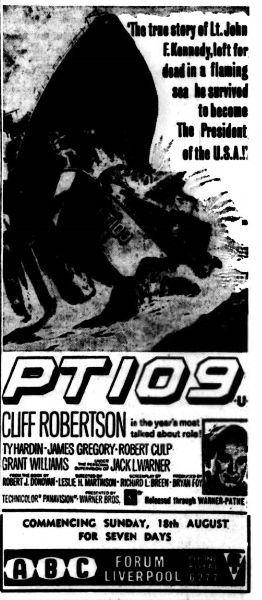
WELLINGTON V EVERTON RES
Saturday, August 17 1963 Liverpool Football Echo & Evening Express
Everton were well on top in the first 20 minutes of their friendly match against Southern League club. Wellington Town, Brown, the home goalkeeper, had to dive smartly to check inside left Wright and full back Whitehouse cleared just in time as Veall went to meet a corner kick from Shaw. Brown made a good save from Jarvis and later tripped over a free kick from Parnell. Wellington’s centre forward, Bentley made a fierce drive which Dunlop only just held. Half-time; Wellington 1, Everton Reserves nil.
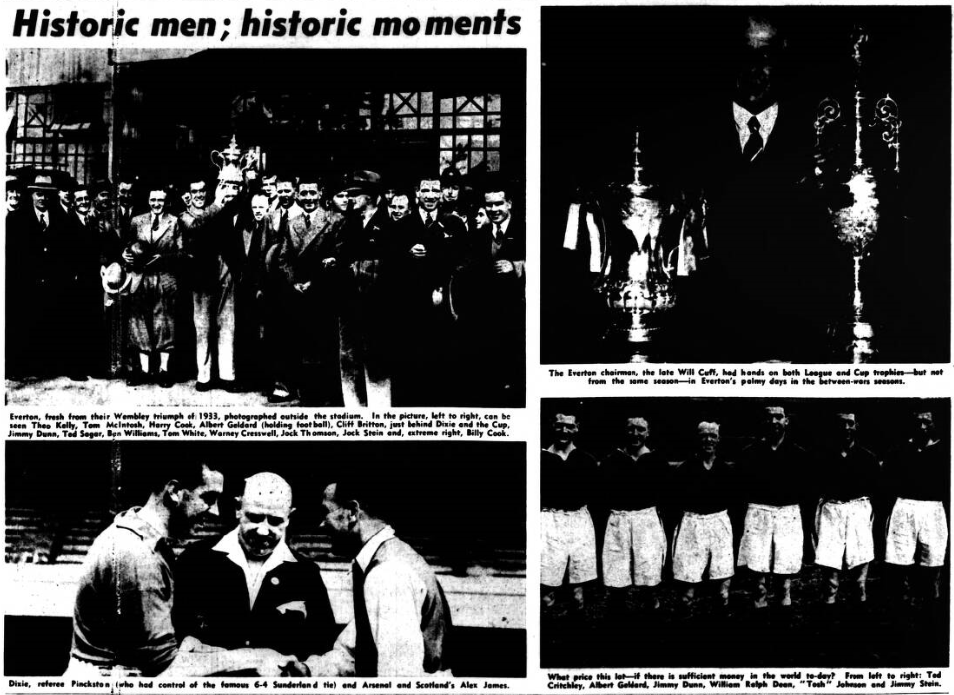
PENALTY DECISIONS SET TAME GAME ALIGHT
Saturday, August 17 1963 The Liverpool Football Echo & Evening Express
GOODISON ROARS AS THE UNITED GET TOUGH
EVERTON 4, MANCHESTER UNITED 0
By Leslie Edwards
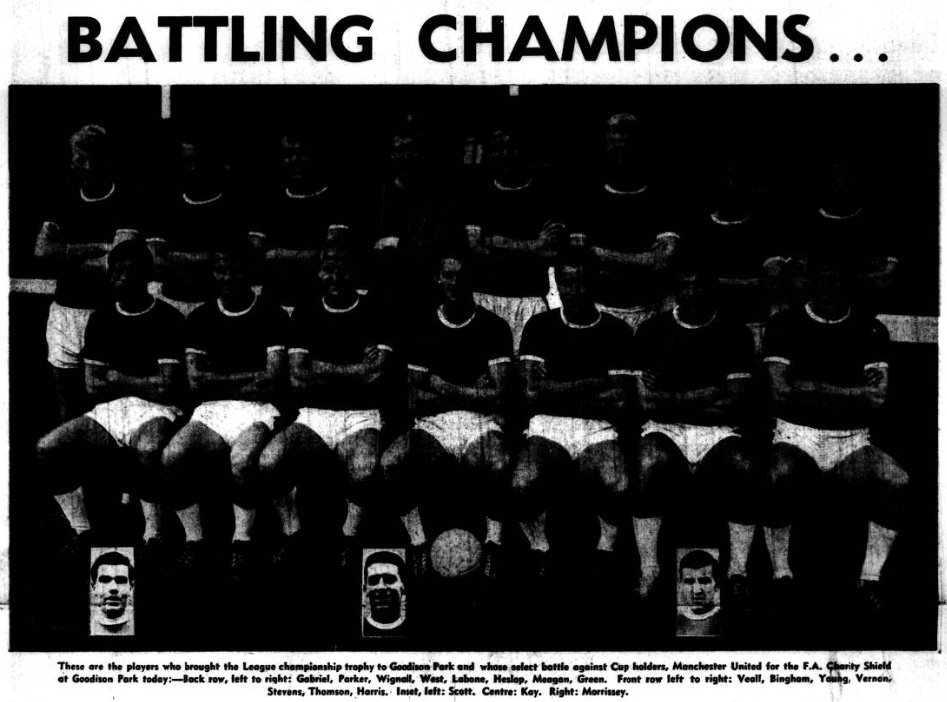
Everton; West; Parker, Meagan; Gabriel, Labone, Kay; Scott, Stevens, Young, Vernon (captain), Temple. Manchester United;- Gaskill; Dunne, Cantwell (captain); Crerand, Foulkes, Setters; Giles, Quixall, Herd, Law, Charlton. Referee; Mr. E. Crawford (Doncaster). It was a gala, shirt-sleeves order crowd at Goodison Park with a live band, a magnificent velvet pitch of green and the new Bullens Road umbrella in action to set off the match memorably. When Everton came out to their “Z cars” theme song they got a tremendous reception and the chant Everton was incessant from that moment. When Cantwell led out United, the cup-holders, all in white, except for red stockings, the reception was not so kindly.
LAW BARRACKED
United faced the sun with Everton taking the kick-off and defending the Park end goal; Stevens found Temple with a grand crossfield pass in the first minute and the winger weaved his way to a centre, but it was a weak one and was easily picked up and turned to the safe hands of Gaskell. United started rather tentatively and it was odd that Law was barracked immediately he touched the ball. Setters mistimed completely an effort to get the ball to the right but as a safety precaution Meagan nodded if for a corner. Everton looked the sharper team, United attempted the more studious sort of football but were rather too slow at the outset on the lush pitch to carry it through properly.
KEEN’S TACKLING
The ball tended to bang a bit on the thick turf, and thus judging the pace was difficult. Scott tried to work a free kick ruse by tapping the ball back to parker but nothing came of the movement, and so far the game had scarcely lived up to its showpiece label although the tackling especially Everton’s was keen and usually on the mark. Gaskell held high overhead the long free kick Gabriel delivered into the six yards area after Crerand had fouled Vernon. It was mostly, Everton with the initiative and so far Herd had been all alone, and mostly out-headed by Labone whenever the ball came through to him from a distance. An oblique pass from Vernon to Scott who had gone to inside-left all but undid United and when Dunne cleared. Young from a difficult position contrived to get in a lobbed shot which beat the bar by only a yard or two.
LITTLE LIVELINESS
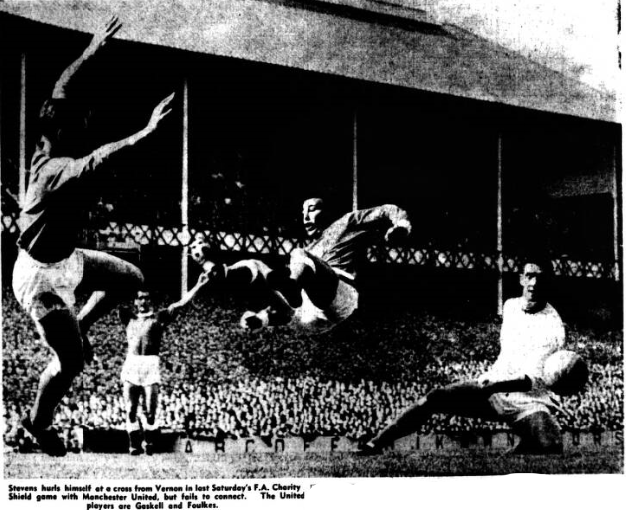
United were starting to hold the ball a bit and use it better but the game still hadn’t come to life with a decent shot or a goal to put the match to it. As expected the tackling of both half-backs was powerful and incisive and for that reason perhaps the game had very little continuity. Herd missed his first big chance of a big shot by attempting to make the opening ever better and as far as United were concerned one had the impression so far that they were not particularly anxious whether they won the F.A Charity Shield or not. Gaskell had to be like lightning to take possession before Temple after a swerved-in free kick by Kay, but the referee ruled that he had committed an infringement so if he had succeeded the score could not have counted. The United goalkeeper had to be sharp to the feet of Stevens a moment later, but although Stevens took possession, he ran the ball over the line for a goal kick.
FIRST STOPPAGES
Setters was flinging the ball about the field accurately and Crerand now did a magnificent solo turn to add still more to the pressure United had suddenly turned on. Herd was hurt in a tackle with Parker and then Foulkes got a knee across Vernon’s midriff. The crowd didn’t like this one and Vernon needed attention. Setters sucked the orange which was thrown on from behind the goal and then rolled it gently over the by-line. It was clear that neither side wanted any rough stuff in a match of this sort. Gaskell had to have attention for a damaged hand after going out to deny Scott following a free kick by Gabriel and the game was stopped for the second time. Before the game restarted the referee spoke to a constable parading the touchline and pointed towards Gaskell’s goal. Whether Gaskell’s injury came from the clash against Scott or from a missile was anybody’s guess. The game got a little contentions with Law and Kay at cross purposes and Kay on the receiving end of a free kick. Setters, having been guilty of a foul on Young tapped the victim on the head, and the game went on for Parker to make a one distance cross shot from the free kick which Gaskill reached with difficulty. Everton went ahead after 35 minutes through Gabriel. Young found Scott with a made-to measures pass which enabled the winger to cross the ball boldly to the far post where Young had taken up position and nodding the ball across beat Gaskell’s right hand and laid on the easiest of chances for Gabriel to score as he pleased.
EFFORT BY LAW
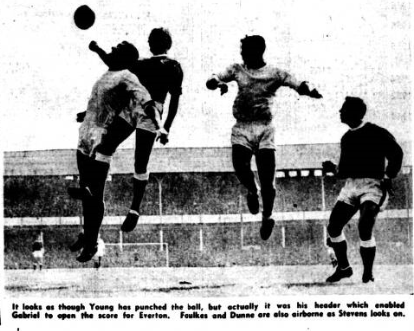
The goalkeeper, did better a moment later when making a fine catch from Gabriel, and Law, with a header from a pass by Giles all but brought the scores level. His effort flew just wide of the goal angle. Meagan steering “Herd’s centre from the left for safely gave away a corner rather needlessly hereabouts. There was not the fluency about the play of either side one gets when the teams are really in form and the heat of the day and the lushness of the turfy-clearly also contributed to the game not being anything like a classic. On the contrary it was a most ordinary match with not even Law or Charlton showing flashes of brilliance.
STERN TACKLING
Temple had seen little of the ball but when he had it he made good use of it and he was lucky at this stage to lose possession at the edge of the penalty-box. Law was still in the crowd’s bad books, this time for a foul on Young. The handshake of the innocent party did much to calm the crowd’s anger. Setters succeeded in bringing off a successful tackle against Vernon, but the referee ruled it a foul one, and insisted on the ball being placed a foot or two outside the penalty box dead in line with goal. There was a programme of wrangling before the kick was taken at the second attempt and Gaskell brought off a tremendous save from Vernon’s hard-hit drive. He still seemed to be having further pain from his damaged hand. Half-time; Everton 1, Manchester United nil.
During the interval the League championship trophy was paraded round the ground by Johnny Morrissey. The game restarted with another very bad foul this time by Crerand on Vernon, who was in full flight a yard or two outside the box when he was uprooted. This time Vernon tried a lob but it was a United head which steered the ball to safely. The game was a bit pedestrian and didn’t flow as one would expect it to between two such talented teams. Temple put life into the match by coming in and driving the ball hard for goal. Setters body deflecting it for a corner.
BUNDLED OFF
When Vernon headed the most perfect pass to Stevens standing almost on the penalty spot. Stevens was unceremoniously bundled off the ball without referee Crawford taking note of the offence. A big wild shot by Herd showed the big man’s frustration, and then we had another unseemly scene with referee Crawford awarding a penalty against Setters for allegedly bringing down Vernon who had beaten him for speed and who was denied only by the out coming Gaskell. United contested this award and no one more vociferously than Cantwell their captain. When Vernon shaped to take the penalty he stopped in his tracks as Cantwell stepped into the area, and Gaskell slipped up, and was made to look foolish. What Cantwell said to the referee caused his name to go into the referee’s black book.
KICK RETAKEN
When the kick was finally taken Gaskill saved brilliantly but could not hold the ball and had to make a second brilliant save at the feet of Gabriel who had followed up. You can judge United’s feeling when the referee ordered the kick to be retaken as the keeper had moved before the kick was taken. This time Vernon side-footed it in and got Gaskell moving the wrong way to such an extent he was yards from the ball when it crossed the line. The time when the penalty was given was 54 minutes, but there was an interval of some two or three minutes delay in the taking of it. A clear penalty offence in my view was the one which had happened a moment or two before to Stevens. Young severely angled, elected to find the few feet to the left of Gaskell’s hands and all but succeeded, the goalkeeper knuckling the ball for a corner after clearly expecting a lob to the far post in the first place. Everton’s third goal was worth waiting for. Crerand inadvertently found Vernon with a perfect pass, and the Everton captain’s lob to Stevens seemed to give him little chance because the United defence was massed against him. But Setters and Dunne were flatfooted and indecisive and Stevens not only sped past them but edged the ball passed the out coming Gaskell for a thrilling a goal as anyone could hope to get. The score came after 62 minutes. Law after handling intentionally came in for some barracking, and all told this was anything but a happy afternoon for United whose case was not improved when Vernon was hurt in a heavy collision with Gaskell. He needed attention, but recovered to show the crowd the damage had been accidental.
NOT A DAINTY DISH
West was out fast to stop Quixall and when Giles picked up the ball with the goalkeeper out of position the shot which came from the right, was also well and truly covered by the Everton man. With the management committee of the Football League and many F.A members present this was not a very delectable dish by any standards. Of one thing we were all certain and that was that Everton were the better side. It took a timely intervention by Gabriel to deny Law at this point, however, and United’s half-cock football still carried some menace.
MICKEY-TAKING
In the heat of the day the pace slackened but the football was now better than it had been at any stage with Everton occasionally doing a bit of Mickey-taking and with United stepping in to take the ball to show this was not a always a paying gambit. United were getting more than a little niggled at being three down and being so inept but there was little they could do about it. Everton were content to retain possession and make their opponents look foolish with a series of triangular passes which United did nothing to cut into. One of the few thrills is of an undistinguished final quarter of an hour was an Everton move which temple completed with a big shot across the face of goal. The Everton backs had both had a great afternoon, and Labone had come unscathed from his duel against Herd. At last Charlton brought down the house with a superb dribble beating two players as he pleased, then Law almost untied the Everton defensive knot as though to show that he too could do a bit when he chose. Everton rubbed in the indignity of the occasion when Vernon took the free kick and slid the ball through to Temple who fairly lashed it home from the closest range. This fourth goal came at 82 minutes, and for United must have been the last straw in a match they will always want to forget. The shield and mementos were presented to Everton by Mr. Joe Richards, president of the Football League on the playing field. Final; Everton 4, Manchester United nil.
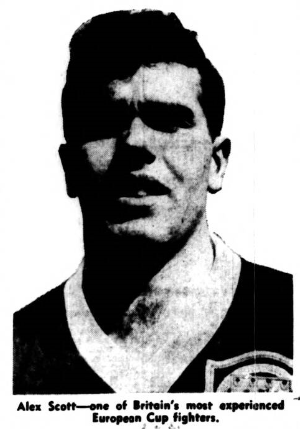
ALL READY FOR THE TREBLE CHALLENGE
Liverpool Echo & Evening Express - Saturday 17 August 1963
By Alex Young
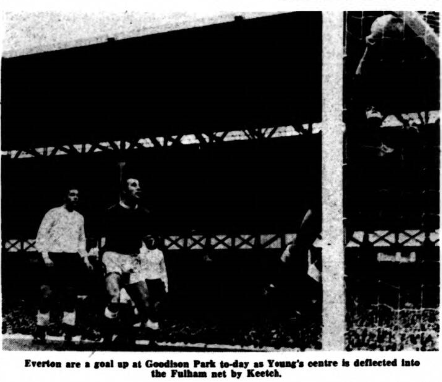
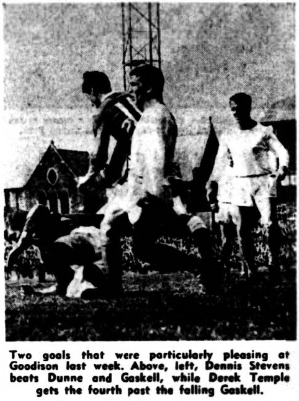
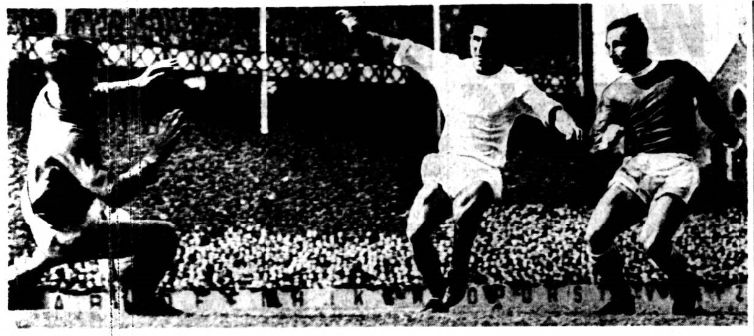
There has been a feeling of great excitement at Goodison Park in recent weeks as we have gone through the preparation routine for what could be the most important and thrilling season in the history of Egerton Football Club. With the League championship under our belt it's into Europe for the first time, and what could be more appropriate than to start the season with an F A. Charity Shield match against Manchester United, who look the first competitive step unto Europe in 1956. This season we face a treble challenge, for in addition to attemptingto retain the First Division championship and making an all-out bid to bring the F.A. Cup back to Goodison Park, we must also devote all our power and energy in an effort to become the first British winners of the European Cup. FIRST HURDLE
Our first hurdle in the European competition is a stiff one, but it is by no means beyond our ability. Inter-Milan are considered one of Europe's best team, but we have got to face the tougher opposition sometime, so why not straight away" In sport, one learns little if anything from playing against lesser opponent, so the first round draw against Inter could be a blessing in disguise. If we win, it will be a tremendous confidence booster: if we lose, then I am sure it will be a defeat from which we can benefit Last time I played in the European Cup, for Hearts against Benfica; the Scottish side was unlucky to lose. Since then Benfica have won the competition. That Hearts team was not as strong as the present Everton side, so it is encouraging to think that if they could give Benfica such a fight, then Everton’s chances against the best in Europe must be reasonable.
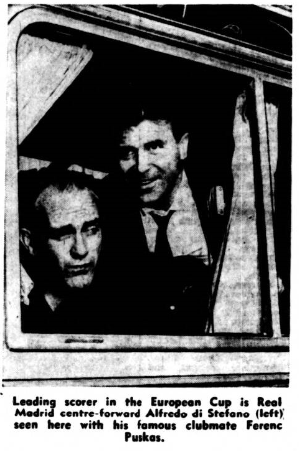
LITTLE CHANGE
On the home front, I foresee very little change in the teams challenging us for the First Division championship. Everton are maturing season by season and I feel that we can again finish as champions, but when one is looking around for possible dangers the name Tottenham Hotspur seems to stick out. I think we must be wary, too, of Liverpool and Leicester City, while Manchester United have a lot of talent and must surely produce a sustained run sooner or later. Of the others I would pick out Arsenal, under former Everton coach Leslie Shannon and the managership of Billy Wright. Here again there is potential and the Gunners started showing something like the form one would expect from them towards the end of last season. I personally have never felt fitter at the start of a season and all the boys at Goodison are in great trim. We have had a grand summer break, with the highlight that fortnight in Spain, at the clubs expense
WELCOME TO HILL
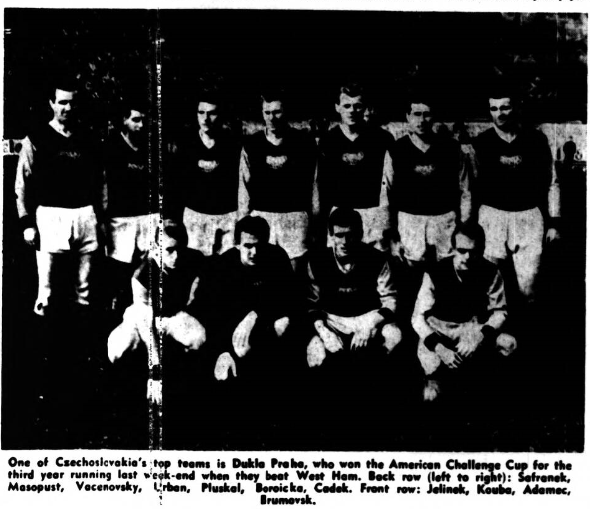
This holiday gave a great boost to the fine team spirit at Everton, and I hope we shall be able to show our appreciation both to the club and the fans who have supported us so loyally by living up to expectation, this winter. May I take this opportunity to welcome on behalf of all the Everton boys, Jimmy Hill, who joined us this week from Norwich City. From what I have seen in training so far. Jimmy is an astute and extremely clever player, and like that other Irishman, Billy Bingham, who left us recently for Port Vale; he has a tremendous knowledge of the game. Billy has our best wishes in his first season with the Potteries club and the same goes also for Frank Wignall, who has gone to Nottingham Forest. It is an interesting coincidence that we start our League programme on Saturday week against Fulham, whose last visit to Goodison in the final match of the season was such a pleasant occasion. Remember, however, that as champions everyone will be trying extremely hard to lower our colours and this season it would be dangerous to underestimate any opposition.
LITTLE TRAVELLING
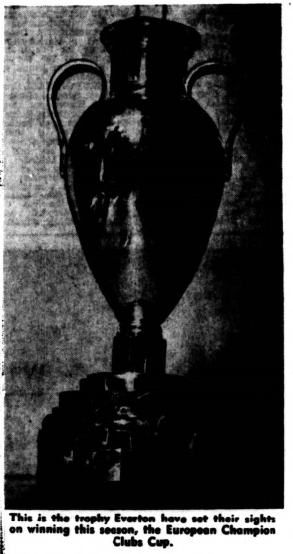
However, in starting with a home match and following up with four games in which me do not travel outside Lancashire, we are extremely fortunate. In a fortnight's time we go to Old Trafford to tackle Manchester United again, and this is followed by mid-week home and away fixtures against Bolton and a visit by Burnley to Goodison Park. Our League travelling does not really start until the middle of September, when a Saturday trip to Ipswich is followed by a mid-week game at Arsenal.
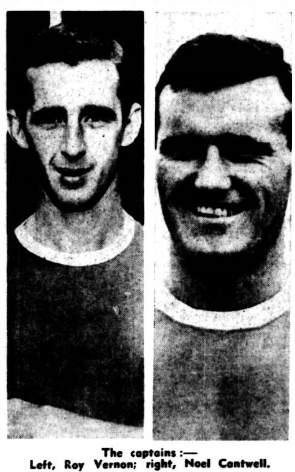
WHEN EVERTON WERE THE ‘MOONLIGHT DRIBBLERS’
Liverpool Echo & Evening Express - Saturday 17 August 1963
By Percy M. Young

STANLEY PARK
Opportunity, as it happened, was supplied by the secular arm, for the governors of Liverpool, quick off the mark after the Municipal Reform Act of 1833, showed early concern for the natural rights of its citizens and in 1870 the 100 acres of Stanley Park, acquired at a cost of £140,000, were declared open to the public by the then Mayor. In Stanley Park the Sunday school scholars played their early games. Reference to the general history of Association football—the Sheffield Club had been going for more than two decades before St. Domingo s commenced operations, and the football Association had been formed in 1863, with its Challenge Cup a focal point for mature ambition since 1871—indicates that Liverpool was somewhat tardy in recognition of its virtues. One powerful reason was the strength of the Rugby game, which had been consecrated by a try-out match, in which a ball borrowed from Rugby School itself has been used, at Edge Hill in 1857. In this match in which some Mancunians took part. 50 members of the more socially distinguished families appeared and inspired one observer to comment; “I never saw a finer or more gentlemanly assemblage.” Rugby football flourished Union Club was in being, but without respect to the “humbler classes.” Some 30 years later this body made an attempt to monopolise the title of Liverpool in relation to football, but was rebuffed. The Rugby game was more socially acceptable in and about Liverpool than in the centre of Lancashire, and middle-classpatronage of the Association game was delayed. For instance, R. F. Lthgoe, who had played both in goal and at outside- right for the Druids, found it impossible to start a comparable club in Liverpool where business brought him in 1877. To get a game he must go to Birkenhead and it was in Bootle that his missionary spirit was satisfied by the institution of a new club. Lythgoe, formerly secretary of the Druids, had a genius for organisation and his secretaryship of the Bootle club as a steppingstone to larger responsibility. In spite of the prevailing conditions St. Domingo's Football Club flourished, and within a year of its inception gave notice of its ambitions by adopting a new, more embrasive, name; it became the Everton Football Club and as such played its first match, which was won. against St. Peter's on December 23. 1879.
SIX FORWARDS
In February, 1880 a match was played against Lythgoe’s team from Bootle. The Everton team was; W. Jones in goal; T. Evans, and J. Douglas at, full-back; C. Hiles, and S. Chalk who, was captain at half-back; and R.W. Morris, A. White, F. Brettle, A. Wade, Smith, and W. Williams, as forwards. The formation –with two half-backs and six forwards –was the convention at that time in the Liverpool neighbourhood. Classification mattered little, however, for, for the time being, the team divided into those who were skillful and those who were strong, the latter, whatever their place, being expected to undertake most of the tackling. During 1880 Everton became a member club of the Lancashire Association and took part in that Association’s Cup competition. A visit to Bolton brought a meritorious draw with Great Lever, and in this match George Bargery, a bank clerk in Liverpool, played so well that he was invited to join the Accrington club, which for a short time he did. The replay was less satisfactory, for Great Lever won by 8-1. Nevertheless in and about Liverpool the Everton team found few superiors, and outstanding victories, of 5-0 and 7-0, were gained at the expense of clubs calling themselves Liverpool and Birkenhead respectively. By now settled into the competitive spirit of the nascent Lancashire Association. Everton -- guided by J W. Clarke, at whose public house, the Queen’s Head, all official and some unofficial business was now transacted- emulated their fellows. First some sort of supervision was exercises over more junior bodies so that promising young men were persuaded from St Peter' St. Benedict's, the Stanley Parkists, and the United Church Club, but care had to be taken to see that such piracy was accomplished before Bootle could offer more enticing invitations. At first the Everton boys wore blue and white striped shirts, while their recruits from elsewhere wore their own strip. Uniformity. However, appeared desirable, and the multi - colours were regularized by black dye, the resultant black shirts then being relieved by a red sash two inches wide. Further aesthetic experiment led to the temporary adoption of salmon jerseys (a fashionable colour also briefly won by Bolton Wanderers) and blue knickers, then ruby shirts with blue trimmings, next blue and white quarters, until the present royal blue was adopted.
PROTEST
The best clubs at that time also had emigrant Scotsmen on their playing strengths, and the first to reach Everton was James McGill, who came to Everton during 1880, having previously played with Glasgow Rangers. McGill, a stirring centre-forward, was the first notable Everton player, and he won wider honours than in club football, first Ayrshire and then with Lancashire. Training was a problem and the nocturnal enthusiasm of Everton won them the passing sobriquet of the “Moonlight Dribblers,” but ardour in preparation was a necessary part of the ethos, and Clarke saw that it was thoroughly done. There was also the legal side to be considered. Many matches in those days were won by supplementary post-cards rather than by the number of goals scored, and on November 15, 1880, the Lancashire Association were compelled to consider one from Everton which protested against a recent defeat by great Lever (themselves a litigious brotherhood on the grounds that the referee, being a Great lever man, could not have been considered impartial. The protest was up-held and the match ordered to be replayed. During the next season, when J.W. Clarke was succeeded as secretary by Tom Evans, 15 matches were won, and four drawn, out of 22 played, with a goal aggregate of 70 to set against 16. The principal goal-scorers were McGill and Provan, while Bob Morris’s tackles and Tom Marriott’s “luges” were singularly effective in defence.
LOST 13-1
In local football Everton were impressive, but to lose to Bolton wanderers by 13-1 and to Turton by 3-1 showed that there was still some way to go before the team could appear with confidence in a wider sphere. However, there was a meritorious 2-0 victory over the Cheshire Cup-holders —Northwich Victoria to record in October, even though the Northwich men took - ample revenge in the return match by 6-2. During 1882 the organization of the club underwent further change R.W. (Bob) Morris was elected captain, with Marriott as sub (or vicest captain. Evans as secretary and treasurer, until his removal to Garstang up-graded his assistant, Frank Brettle, and let in F. Watson as assistant secretary. The committee saw that their intentions—the principal being to establish local supremacy—could be fulfilled only if certain conditions were forthcoming. It was, for instance, now necessary to obtain an enclosed ground. In March a meeting was held in John Houlding s Sandon Hotel and an agreement entered into to take a field off Priory Road, belonging to a Mr.Orritt, for the 1883-4 season. Further there teas the overriding obligation to educate the public to accepting Saturday afternoon football as the best form of recreation. To do these standards must be raised, partly by choosing the best available player, partly by giving opportunity for good performers from elsewhere to be on view. At the beginning of 1882 Everton had so far succeeded in their mission that when the Liverpool Daily Post reported the match at Marsh Lane, Bootle, of January 14, it observed that these two clubs stood out “in advance of all others playing under the rules of the Association in this neighbourhood." Everton won this match by 4-1 and were represented by: J. Bargery; T. Evans. J. Marriott: R. Morris. W. H. Parry; J. Richards, W. Roberts. A. Proven. J. McGill (now captain), W. Williams. D. H. Williams. The Everton umpire was J. Asbury. Bootle being R. E.Lythgoe-who by now had inaugurated the Liverpool Football Association. Rev. A. W. Keely refereed the match and there was an attendance of 500. Bootle, in the meantime, had shown initiative in inviting to Marsh Lane for the Saturday following, the second string of the famous Glasgow team Queen's Park. The club were to be commended, said the Daily Post, for so assisting the general raisin; of standards and their enterprise was rewarded in that representatives of many other clubs attended to see what they could learn. In between friendly matches with such teams as Haydock, Crewe, Eagley, Liverpool Ramblers, and Liverpool. Everton staged one or two exhibition matches in Stanley Park. That played on March 18 between Mr. T. Evans’s team and Mr. R.M. Sloan’s team, comprising what the Press called “the total experts,” attracted 1,400 spectators who saw good defensive play on the one side from Parry and Marriott play on the other by Provan and McGill.
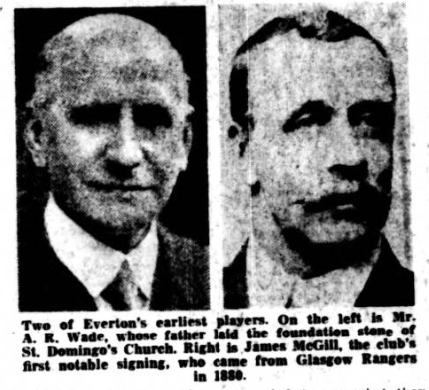
In the autumn of 1882. McGill spending a three-month sabbatical leave with Accrington, Everton went to Blackburn to play against the Rovers in the Lancashire Cup. Before they went it was said that they had no chance. They hadn't: they lost by 8-0. But on January 8. 1883, the return of McGill brought a victory by a like margin over the Liverpool club. During the same month a tough match with Bootle- who included W. Wilson, of St Peter's, in goal, and Jack Brodie, of Wolves, at centre forward was left contentiously unfinished as the players, dissatisfied with the standard of play of their opponents and the refereeing, walked off. Bootle claimed a win. Everton a draw.
RIVALRY
The “borrowing” of players was becoming a menace and Bootle could be found with representatives from as far away as Druids, Darwen and even Brentwood, in their ranks. By now the old rivalry between Bootle and Everton had acquired a sterner tone and there was little over lost between them. In the early part of 1883, then, a 3-1 defeat by Bootle in the semi-final of the Liverpool Cup was hard to bear. So it was that in Everton legends developed about the adjacent township, of which the most engaging referred to “tricky Bootle where the bugs wear clogs and fly backwards to keep the dust out of their eyes.” A characteristic episode in this briefly turbulent history occurred at Bootle three years later, when in the first round of the Liverpool Cup, the crowd broke into the field of play and Everton claimed the match!
MORE NEXT WEEK
Percy M Young 1963
From “Football on Merseyside,” to be published by Stanley Paul and Co Ltd, London, price 21st.
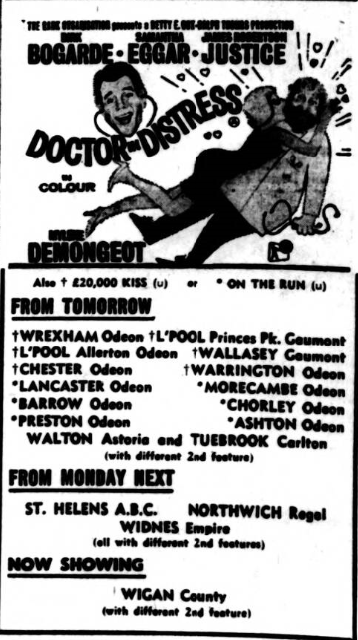
EVERTON RES HAD CLASS
Liverpool Daily Post Monday August 19 1963
WELLINGTON 1, EVERTON RES -
-Although there was no score at half-time in this friendly match at Wellington the Everton team looked well in command. But later the Southern League side made a determined rally and although they could not match the class of their opponents they managed to score after 80 minutes and then their defence held out. Full-back George Thomson prompted many Everton raids, and Ray Veall was also prominent, but in front of goal the Wellington defence covered very smartly. Right half Jarvis and centre-half Heslop had a busy time against Wellington’s rally, which brought success through a splendid goal by centre-forward John Bentley.
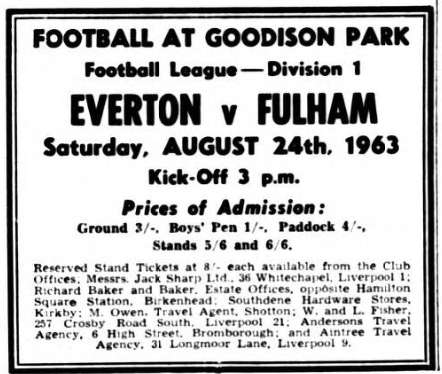
ALL’S WELL WITH EVERTON
Liverpool Daily Post – Monday August 19 1963
NO PRIZE SEEMS BEYOND THEIR POWERS
SUPREME DEFENCE AND SPARKLING ATATCK POINT WAY
EVERTON 4 MANCHESTER UNITED 0
By Horace Yates
All’s well with Everton! “Champions” is a title from which they will not easily be divorced. All the early evidence suggests that given reasonable luck in freedom from injury of key players they might well surpass the deeds of last season and no achievement may be beyond them, for the increased maturity expected from young battle-tested players is already manifesting itself. The outlook could not be brighter. One match, I know does not make a programme and in allowing enthusiasm to run high, one must make allowance for the at time near mediocrity of some of Manchester United’s efforts. While Everton boss, Mr. Harry Catterick, presented with a silver salver by the directors to mark the winning of the title, can afford to smile confidently at folding ambitions, his United counterpart, Mr. Matt Busby, must be a perplexed and disappointed manager. The F.A Cup on his club sideboard earned with a final display which suggested that at long at long last team building enterprise was about to reap its reward has a mocking sparkle, for unless United discover composure and temperament to match individual reputation once again the League fixture may see them struggling.
ILL-TEMPER
There was no need whatever for the flashes of ill-temper and lack of control, of which some of their most experienced players were guilty, and it is to Everton’s credit that they did not seek to emulate them in this chapter of fiery waywardness. United were completely disorganized by a penalty award, surely one of the most remarkable incidents of its kind for many a year. Skipper Cantwell left the referee in no doubt as to his feelings on the decision given against Setters in a duel with Vernon. Only when the referee pulled out his notebook did Cantwell decide that discretion was the better part of valour. Like Cantwell I was convinced that Referee Crawford was in error in pointing to the spot, just as he was a little earlier, in deciding that Foulkes treatment of Stevens in the area was legitimate. The one error was merely compensation for the other. It was in an inflamed atmosphere than that Vernon placed the ball for the kick. Obviously to anyone who cared to look was the fact that Gaskell, a very different goalkeeper from the bundling, fumbling player of Wembley was standing two yards in front of the goal line . Nothing this. Vernon stopped in his run. Cantwell who had taken up an unusual position on the touch line side of the box, promptly penalty kick out a single miss in a rich harvest last term, slammed his shot high to Gaskell’s left and the goalkeeper saved. Again I am convinced that he saved only because he moved I anticipation of the kick and his guess was correct. Not for this reason, however, was the kick ordered to be retaken but on the intervention of s linesman, who observed that Cantwell had stepped into the box. At the third time of asking Gaskell flung himself precisely as he had done for the first shot (in my opinion, even to premature movement), but this time Vernon switched direction and the ball trickled into goal at the opposite end, yards away. A triumph and quick thinking! This undoubtedly was the end of the United, with 57 minutes gone. Long before this, however, their threat had been blunted almost out of existence by the competence of a defence which assuredly will be the cornerstone of future Everton achievements. Possibly it was their industry and skill that had reduced a United attack which had a opened brightly enough to a shimmering shadow of its possibilities. Giles that most dangerous little winger of Wembley memories found the thoughtful, stubborn Meagan a barrier beyond his ability to surmount and Parker took a similar grip on Charlton, neglected to the point of folly by his colleagues. The immaculate Kay, who so rarely puts a foot wrong football wise, reduced Law- costliest player afield- almost to the status of a blundering novice so that his wanderings to do battle with this terrier of a tackler hardly reflected great credit for intelligent thought. Everton paid £60,000for Kay. If they had paid twice the amount they would still have a better bargain than United with Law. Not surprisingly, no one hears these days any suggestion of the folly of bringing Kay to Goodison. Because Quixall did all his best work in midfield, Gabriel had opportunity in plenty in assume the attacking role, for which he is developing an increasing appetite. He scored the first goal in 36 minutes when he was on the spot to pay tribute to a Young, Scott, Young movement which had the Manchester defence utterly defeated. If he had twice scored again later on, it would have been no more than his due. Herd only once, from one of the few flashes of Law’s possibilities, looked remotely capable of gaining the better of an imperturbable, completely assured Labone. Against this vice-like defensive grip the United attack became increasingly important, and with the game won Everton, against a retreating defence, gladdened the hearts of their jubilant supporters with round after round of ball retaining combination, with a 22-caret Continental stamp. If Everton decided on such tactics to take temper out of the game they sadly miscalculated for United did not like it one little bit, and their response plainly showed it. Certainly it was like rubbing salt into an ever-widening wound. Still a vastly superior Everton streets ahead of their opponents in thought, skill and execution were coasting to inevitable victory. United were absolutely powerless to stop it.
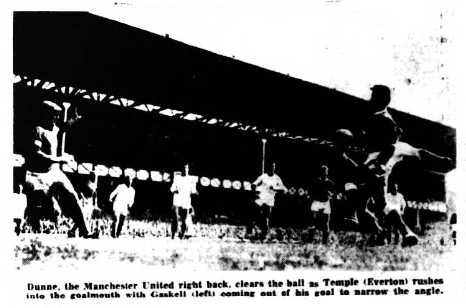
Young was the artist, with flicks and nods of telling accuracy but it was the rapier-like Vernon, making rags of any destructive reputation Crerand may have boasted, who threatened to tear United apart with his almost every move. The one worrying feature from Everton’s point of view was that it was a limping skipper who hobbled up to take the F.A Charity Shield from Mr. Joe Richards at the end of the bonanza. Let us hope it looked worse than it is. As fine as anything in the 90 minutes was the Vernon chip pass into the penalty area on to Stevens fastened to take goal No 3 in 63 minutes, and everyone who might have come to this match already to pick holes in the inside right, retired in complete confusion. Stevens is underrated and by Everton supporters of all people. Quite one of the most humorous incidents was provided by Kay when he gestured to Law to calm down, but it was advice not taken for Law was booked a little later for an offence against Kay and Temple steamed up to score the fourth six minutes from the end. As gratifying as anything to me was the increased power and threat provided by winger Scott and Temple. This decisive improvement by both players could easily prove a major factor in a forthcoming triumphant match of progress. There are indeed great days for the Goodison Park clubs. Everton; West; Parker, Meagan; Gabriel, Labone, Kay; Scott, Stevens, Young, Vernon (captain), Temple. Manchester United;- Gaskill; Dunne, Cantwell (captain); Crerand, Foulkes, Setters; Giles, Quixall, Herd, Law, Charlton. Referee; Mr. E. Crawford (Doncaster).
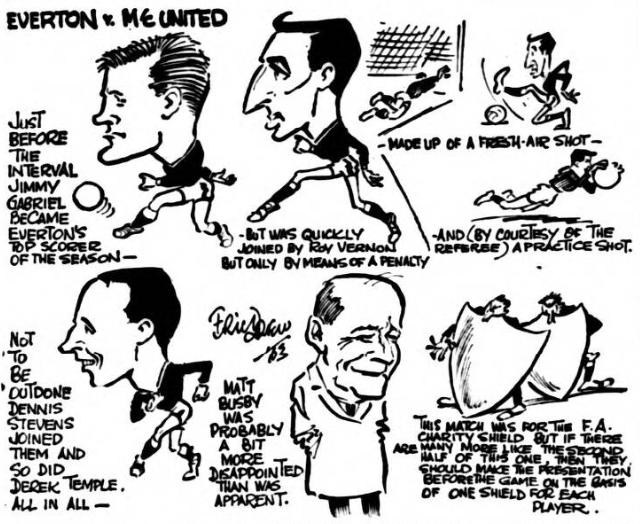
EXHIBITION? YES BUT OF THE WRONG SORT
Liverpool Echo & Evening Express - Monday 19 August 1963
By Leslie Edwards
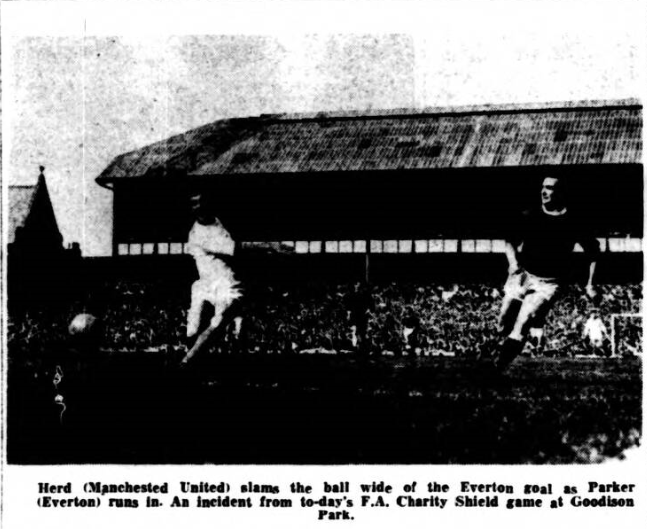
EAGER FOR THE REAL START
No wonder there was slow handclapping and some booing as the teams lined up for the presentation of the trophy by Mr. Joe Richards of the Football League. One wondered what the assembled Football League Management Committee thought of the game as something which should have provided every facet of football art. I was left eager to see Everton start their season on the same ground next Saturday against Fulham; eager to see a game the result of which mattered. To take this rather tawdry game seriously, as many spectators so evidently did, was surprising. I know it was the first match of the season; that the pitch was unhelpful; that the warm sun made the going tiring…Making allowances for all these things, it was a disappointing show and that is putting it mildly. The Everton won and easily was the only thing, for me, which the match remotely memorable. United looked a rather slow-moving, frustrated team. They were guilty of some reproachable behavior, if one could described the uprooting of certain players as that, and the penalty award from which Vernon ultimately put his side 2-0 ahead early in the second half (plus the peculiar circumstances in which it was taken” did nothing to simmer United’s anger; indeed, it had the reverse effect. Mr. Crawford, missing the penalty which should have been given in Steven’s favour a minute or two earlier thought otherwise. Vernon dummied to shoot from the spot and Gaskell dived to an imaginary shot and was made to look foolish. Then when the ball really came at him he brought off a brilliant save and a second one at the feet of Gabriel, who had followed up.
STEVENS’S WAS BEST
United’s dismay when they found the kirk ordered to be taken again (some defender must have infringed the laws) know no bounds. It was Cantwell’s disagreement with the referee on this point which caused his name to go into the notebook. After a delay of more than two minutes Vernon got Gaskell moving the wrong way and scored with a judiciously placed shot to where the goalkeeper wasn’t. It was remained for Stevens to take a fine opportunist goal from the pass Vernon dug up for him, having been given possession, inadvertently, by Crerand. Temple got the fourth. Gabriel had tapped the ball in from close range for the first, Young having not only found Scott was a pass but headed the winger’s centre across goal to where the scorer just got there first against the out-stretched hand of the goalkeeper. I liked Everton’s clear desire not to take revenge for some of the harsh treatment meted out of them; I liked the brainy reading of play by the two Everton backs whose heads were continually cutting out the far-flung Manchester passes to the wings; I liked Temple’s liveliness and ability on the few occasions he was given chances. For the rest there was little enough to become enthusiastic about. Law, barracked from the moment he set foot on the field, never showed anything like the real game. Herd, for a big man with a big shot, spent more of his time on the wings than in the centre, Quixall contributed some nice touches, but not effective ones. It would be idle to pretend that the match produced satisfaction or performance in the way that so many run-of-the-mill league game do. As a fixture which could have produced one of the finest displays of soccer ever seen it failed miserably.
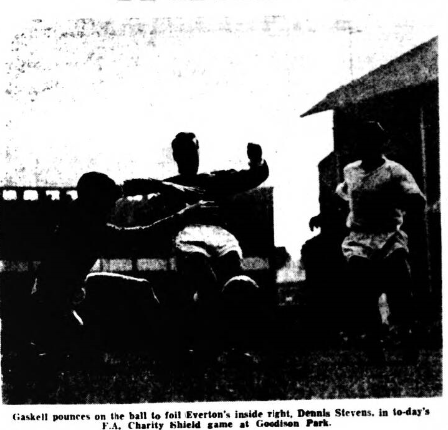
DIED AT MATCH
Liverpool Echo & Evening Express - Monday 19 August 1963
FORMER CITY POLICEMAN AND GEORGE MEDALLIST
A retired Liverpool police constable, Mr. Percy Green, aged 59, collapsed and died while watching the Everton versus Manchester United match at Goodison Park on Saturday. Mr. Green, who lived at 60 Parthenon Drive, Norris Green, Liverpool, leaves a widow. In October, 1941 Constable Green was awarded the George Medal for taking a leading part in the removal of explosive material while fighting a dockside fire during an air raid.
CATTERICK DENIES RUMOUR
Liverpool Daily Post – Tuesday August 20 1963
EVERTON SAID TO BE INTERESTED IN ‘BRONCO’ LAYNE
Last night came rumours from Yorkshire that Everton were preparing to enter the transfer market again, this time for David “Bronco” Layne, the Sheffield Wednesday goal-scoring centre forward. But when asked if there was any truth in the rumour Mr. Harry Catterick, the Everton manager who was formerly with the Hillsborough club, said; “This is absolute rubbish. Everton have made no contact whatever with Sheffield Wednesday.” Layne, 24, and scorer of 30 League and Cup goals for Wednesday last season –his first in the First Division –said yesterday “I am not making any comment what so ever.” Of Layne is transferred it will be his fifth club in four years. He moved from Rotherham to Swindon for £500in 1959 and then to Bradford City for £6,000 the following year.
SMASHED RECORD
Then, after breaking the Bradford club’s scoring record with 36 goals in a season, he signed by Wednesday team manager Mr. Vic Buckingham last close season for £20,000. Last night Mr. Buckingham said he had not heard of Everton’s interest in the player. He said; “I know nothing at all about it. If Everton come with a bid that’s a bridge we shall cross when we get to it.” Layne would have a great deal to consider before agreeing to another move. Married with two young children he recently took over a restaurant business near the Hillsborough ground.
LAYNE IS HAPPY AT SHEFFIELD
Liverpool Echo & Evening Express - Tuesday 20 August 1963
NAME LINKED WITH EVERTON
HAYNES FIT
By Leslie Edwards
“Bronco” Layne, Sheffield Wednesday centre forward, whose name has bene linked with Everton’s in rumours of an imminent transfer, knows nothing of a possible move. “I ‘m happy here and am looking forward to a good season,” he said to-day. Mr. Vic Buckingham, manager of Sheffield Wednesday, is equally in the dark about Everton’s interest in Layne. Layne recently took over a restaurant in Sheffield. A Sheffield man, he played for Rotherham, Swindon and Bradford before he went to Hillsborough. Manager Harry Catterick joined Everton from Sheffield Wednesday. He signed half-back Tony Kay from his old club last season. The forward he wanted from Wednesday last year was Fantham but nothing materlised.
GOODISON COMEBACK
Johnny Haynes begins his fight to regain his England place when he plays for Fulham against Everton at Goodison Park, on Saturday. Fulham team manager Bedford Jezzard, yesterday announced in Spain, Haynes’s return to League soccer. He said Hayes’ right knee had shown no signs of strain after Sunday’s game with Bilbao. But the player will be rested for Fulham’s match today against Portugese cup holders, Sporting of Lisbon. Maurice Cook and Bobby Robson, both injured against Bilboa, also stand down. Haynes tested his knee at the Bilboa stadium yesterday. While the rest of the team played a five-side game. Haynes spent the time driving right-foot shots at Fulham’s duputy goalkeeper Dave Underwood, once a Liverpool player.
JIMMY DUNN DIES
Liverpool Echo & Evening Express - Tuesday 20 August 1963
FAMOUS EVERTON INTERNATIONAL
Jimmy Dunn, Everton F.C veteran and former international Soccer forward, has died at his home at 391 Hawthorne Road, Bootle. Jimmy, who was 62 was one of the original Wembley Wizards, the Scotland side which beat England 5-1. He was in the Everton team which topped the Second and First Division and then won the F.A Cup- all in three seasons. He joined Everton in 1928 from Hibernian. An inside right he played for Scotland six times. Best-known of his three footballing sons is Jimmy, who played for Wolverhampton Wanderers and Derby County. Young Jimmy won a Cup medal in 1949 and they were only the third father and son combination to achieve this feat. Mr. Dunn joined Everton from Hibernian in 1928 remained at Goodison Park until 1935, when he was transferred to Exeter City. Subsequently he played for Runcorn in the Cheshire County League.
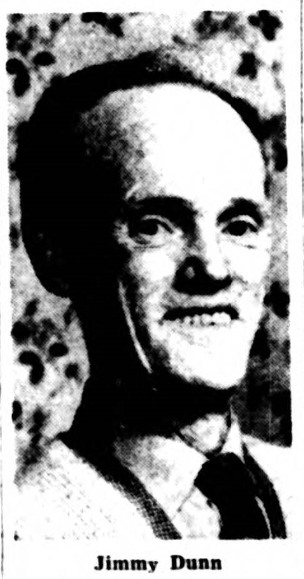
HILL WILL BE KNOCKING AT THE DOOR…
Liverpool Echo - Wednesday 21 August 1963
By Leslie Edwards
The visit of Fulham to Goodison Park on Saturday —and there appear to be good chances of Johnny Haynes being in their team—will bring back happy memories of Everton's title-settling victory on the some ground in the last match of the season. It will also recall to the few who travelled down to London for last season's game the rather tempestuous meeting of those teams of Craven Cottage. If Fulham's trial runs against teams in Spain and Portugal this week do them no more good than Manchester United's last week Everton's task should be easy. United looked more like a side finishing a long tiring season than on eleven fresh for the kick-off for season 1963-64. It was Haynes In his 'teens who impressed many people at Goodison Park in the days when Nobby Fielding spent many of his Saturday afternoons sitting at the back of the Press box. Fielding, an Edmonton townee of the Fulham player in his boyhood days, always said he'd be a great player. He has been proved right, though Haynes long absence from the game after that Blackpool car crash last year must make his future rather doubtful. He has been testing out his damaged knee by aiming shots at Fulham's goalkeeping deputy. Dave Underwood, who used to be at Anfield. Everton's new forward. Jimmy Hill, who has repute as a fine player and a very nice man—qualities which do not always go hand in hand!—is well known to the former Everton back and F.A. coach. Willie Cook, who was at Norwich when Hill was successfully switched from the wing to an inside position. Willie say: "Make no mistake about it, this chap can play and when he strikes form it will be hard to keep him out of the senior side. His international appearances have proved him to be top class; I claim to have been instrumental in helping to get him his first chance in the Northern Ireland team for which he has now appeared three times.”
Not an embarrassment
Are Everton likely to be embarrassed by their acquisition of new talent. If they were not in the European Cup the answer could be yes, but they face many commitments and the possibility of injury to one or other of their stars is so ever-present I think they are wise to bolster their reserve strength. In pre-war days there were few positions at Goodison Park in which the first team occupant could not feel a capable reserve breathing down his neck. This has not been so in recent times. It is part of Harry Catterick's job to recruit new players and still keep first-teamers happy. It is good to have men like Hill, Brian Harris and others ready for the first team when required, but handling them and a team composed of many other top-class footballers is no sinecure. In the most successful days Arsenal had a hard core of some 14 or 15 first-teamers who could be used, if necessary out of position, when need arose. If Everton are to be a force in world football they must improve their reserve side, because when injuries occur sides are only as good as their reserve strength allows. All told, during their championship season, Everton were lucky over freedom from injury. There are times when one injury is followed by another and the club which hasn't budgetted for this likelihood is inevitably bound to lose its place at the top. Of the Everton first teamers Mr. Catterick has signed West, Stevens. Scott, Veall, Hill and Morrissey; it would seem that others, if not necessarily aimed to go straight into the senior eleven, are on the way…
VERNON; LATE DECISION IS LIKELY
Liverpool Echo & Evening Express - Wednesday 21 August 1963
INJURED KNEE
FULHAM MATCH
By Leslie Edwards
Everton F.C stated today that it will be Friday at the earliest before a decision is taken whether Roy Vernon will be fit for the opening game of the season against Fulham at Goodison Park. His right knee, damaged in the match against Manchester United, is responding to treatment. Were Vernon unfit, the club have a ready-made deputy in Jimmy Hill, Northern Ireland international, signed recently from Norwich City. Fulham are back from their Continental tour and it is expected that Johnny Haynes, who played so few matches for them last season. Following a car crash, will be in the side against Everton.
A PETITION AGAINST INDESCRIMINATE PARKING
Liverpool Echo & Evening Express - Thursday 22 August 1963
By Leslie Edwards
The system of parking in streets outside Goodison Park (one which to me seems to work very well indeed) on match days does not suit Councillor Reg. Flude, Conservative member for the County Ward. He says the proclamation of the Lord Mayor of 1960 (Alderman J. Leslie Hughes) detailing single-line parking in certain streets is not being obeyed; indeed he knows of streets where cars are parked three abreast in certain cases. This produces hardship, he maintains, for householders and shopkeepers and even for churches in the area. A keen football fan himself who follows Everton and Liverpool week by week he has nothing against the clubs or against the fans who arrive by car, but he does insist that parking should be according to law, or alternatively that space should be taken in Stanley Park to provide parking space for the several thousand vehicles which cannot, in existing circumstances, find authorized parking space near Goodison Park. Not having made progress with inquiries of the Watch Committee, Councillor Flude has decided to distribute some 2,000 leaflets inviting householders in County Ward to sign a petition to the Lord Mayor "drawing attention to the indiscriminate parking of cars outside our respective homes." The leaflet reads; does the indiscriminate parking of motor vehicles when Everton F.C. are playing at home affect you in any way. Do you consider that this is a danger to your children? When an evening match takes place, are your children unable to sleep because of the banging of car doors and the running of motor vehicle engines? Are vehicles parked in your back entry. Are vehicles parked three abreast in the road where you live? Are vehicles parked on the footpath where you live. Are you prevented from parking your own car outside your own home when a match is being played’ can you have coal or any other household requirements delivered to your home then a match is in progress. If you are a shopkeeper, can you receive or deliver goods when a match is in progress if the answer to any of these questions is "Yes", then you should sign the petition. Councillor Flude thinks that increasing numbers of cars on the roads must lead to the situation worsening in the next five years. That is why he is anxious that this problem should be tackled now . . .
MICKEY-TAKING, TWO VIEWS
Critics of my Everton v. Manchester United report dare me to print their letters, though many of them don’t dare to print their address. Some say that mickey-taking triangular movements are just the thing to beat blanket defence: others agree that people don't pay good money to see this negative time-wasting copying of the worst aspect of football as played on the Continent. Because I had my say and it is only right for people who disagree to have theirs here are the views of those in disagreement:
Mr. Francis J. Phillips 109 Watling Avenue, Litherland, says: "For years I have been a regular reader of your column and an admirer of your unbiased reports. However with regard to Saturday's game I am afraid I disagree. Some of your colleagues seem to be better informed than you or they saw what to me was obvious at Goodison Park. "I refer to what you describe as the mickey-taking triangular movements. To me these are obviously the method of beating blanket defences, such as Everton will meet in the European Cup. I applaud Mr. Catterick and the club for taking the opportunity to practice these tactics against top-class opposition.”
“Mr. L. Massey (90 Gloucester Road, Liverpool 6)comes in with "Well you are a corker all right. You talk about antics, most of them from United players. I beg to differ. All the antics came from United. I'd put the lot in with Liverpool City where they could indulge in their hands-off and body slams. “Regarding the slow handclaps this was all aimed at United for a pathetic exhibition by them. If this is the best the Cup winners can do then the sooner European teams come here the better. If Law with his wheeling round in his own length is worth £l00, 000, Alex Young and company are worth twice that sum. "Mickey-taking? That was where I really slated Everton. If we get much of this in our precious 90 minutes we might as well stay at home. “Busby’s babes should grow up and act like men."
A SUFFERING RED!
E. Booth (8 Haverstock Road, Fairfield) writes; - “May I congratulate you on your cold, calm summing up of the Everton-Manchester United fiasco. I think the majority of sports writers must have searched their dictionaries for superlatives last week-end to described the victory. What a cold douche for fanatics to read your indictment of how football should not be played.”
And from E. Mandaluff, 20 Vipond Street, Liverpool 6, the parting shot; “I certainly don’t need a crystal ball to see that you are one of those suffering reds!” writing of the death, aged 62, of Jimmy Dunn, James A McMahon, 1 Eaton Street, Prescot, says;- “Jimmy Dunn’s death brings to mind the days when good little ‘uns beat good big uns. Scotland’s inside trio of those days were all below average height. These three-all of them were with English clubs- were also great powers in League football. People will say “Ah, but football in the days of Alex James, Hughie Gallacher and Jimmy Dunn was so many sowers then.” Agreed, but the unarmed combat type of tackle was more in evidence then than it is today.
“Ask W.R. Dean –and he was no weakling! “These three wee fellows formed the pattern that moulded the present day greats, such as Stefano, Suarez and company. Their method was that quick thinking is more important than being fleet of foot. “At the same time they were no slow coaches.
LACEY AND GRACIE
Ron Yeats' reference on Saturday to the return of Bill Lacey to Merseyside prompts a question from Mr. G. McGough who has been following football here since 1906. He says: “I have tried to convince a friend that Lacey used to be an Everton player. I say he was concerned in a double transfer—Lacey and Gracie from Everton to Liverpool and Harold Uren, a winger, from Liverpool to Everton. It was I think around 1911." Mr. McGough Is right and so are half-a-dozen other readers of this column who point out that Everton were making their fourth, not third, appearance in the F.A. Charity Shield when they beat Manchester United. The one the F.A. missed when they gave me Everton's record was their victory, by 5-3, against Newcastle United in 1932 33. One correspondent who makes this point says: "Continue reporting games as you see the others would like me to report games as they see them. One, F. Parry, accuses me: "You have reduced our own 'Derby' games to games of handshakes and now you want other matches to be matters of "How do you do? And glad to meet you' “No, Mr. Parry, I asked that the Shield game should be an exhibition match. It was, but of the wrong sort. Did this match improve the image of football in the eyes of the public? I doubt it.
AJ. Higgins,of Kaigh Avenue, Great Crosby, comments: "Although the present Everton team is good enough to go places I think they could do even better with another such as wily Wally Fielding in the line. "Although Temple. like the much-maligned Stevens, is performing adequately I would like to see another like Tom Ring on the left—l was at that tragic match at Stamford Bridge when Tom's leg went after a scintillating display. "Unfortunately, Fieldings do not grow on trees, much as Mr. Britton seemed to think they did. Ball players are at a premium to-day. What really good ball players have we got? And which of the few is for transfer?" David Dunkley. A grandson of the late Jack Sharp, who played for Everton and England at soccer and Lancashire and England at cricket, may yet follow his illustrious forbear in the cricket sense. Playing for Liverpool last week-end he hit 58 not out against Wallasey and then 104 not out against Wigan. David, who is in his early 20's and learned his cricket at Sandbach Grammar School, is something of a cricket fanatic. He is largely self-taught.
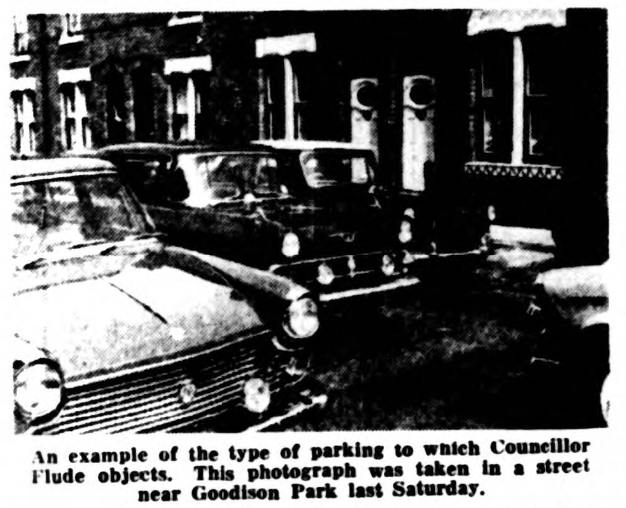 /
/FULHAM HIT BY INJURIES
Liverpool Echo – Evening Express Thursday 22 August 1963
ROBSON, COOK AND LEGGAT
VISIT EVERTON
Injuries to forwards Graham Leggatt and Maurice Cook and half back Bobby Robson during their pre-season tour of Spain and Portugal force Fulham to delay the choice of their side to visit Everton on Saturday. Robson and Cook were hurt during the Fulham’s 4-3 defeat by Athletico, Bilboa on Sunday and Leggatt received a knock in their 2-2 draw against Sporting Lisbon, the Portuguese Cup holders on Tuesday. The side did not return to London until late last night and team manager Bedford Jezzard announced that all three would have tests before the team was selected. “I expect them to be fit,” commented Jezzard. In that event the team is expected to be similar to that beaten 4-1 by Everton at Goodison Park at the end of last season, except that Bill Dodgin, who missed most of last season with a broken leg, may return at centre half. Out of the side is left winger Brian O’Connell in a training match, but Johnny Haynes is certain to play.
ROY VERNON ADMITS
Liverpool Daily Post – Friday, August 23 1963
THOSE PENALTY KICKS HAD ME ON EDGE!
As long as I play football I don’t think I shall ever experience a more intriguing penalty kick, or series of kicks as it turned out, than that against Manchester United last Saturday. It almost earned a place I a stranger-than-fiction series. Puzzling as it all was to us on the field, it must have been even more bewildering to the fans. Let me give you my view of the two minutes that seemed like ten. In the first place I stopped in my vision too soon, which suggested he was out of his goal. The second time I hit the ball quite well and it went exactly where I had planned to out it. Gaskell saved, and this convinced me he must have moved before the kick was taken, for I have tried this penalty kick routine hundreds of times in practice and Gordon West our own goalkeeper, has never been able to touch them. Nobody can tell me that Gaskell is a faster mover than Gordon, or that he has a longer reach. What is more West knows where the ball is going, but it has never made any difference.
OFF MARK TOO SOON
The only conclusion then is that Gaskell was off the mark too soon. I profited by the two dummy runs when I came to take the kick a third time, for I had seen Gaskell fling himself to his left on both previous occasions, and I guessed that he would do the same again.? That is the reason I tapped it into the other end of the goal. No previous penalty in my experience has had me on edge as this did. I thought I was proof against penalty-kick nerves.’ Last season you may remember I scored eight penalties from eight shots, although I never tired of warning that sooner or later the best spot kicker in the game missed one. Now I am hoping the shot Gaskell saved in vain will prove to be my one miss and that there will be plain sailing for the rest of the campaign. In my view Everton played extremely well, especially taking into account the fact that Manchester United had already had two games in real earnest. I admit that in the first twenty minutes I thought it was going to be a close match. We set out to try and fall into a rhythm and most people will agree we achieved that quite satisfactorily for a pipe-opener. I thought I was never going to get into the game and I have been told that eight minutes had gone before I touched the ball. When our manager reads this I hope he does not decide to cut my wages accordingly. The lads were delighted with the Press reactions to our efforts, but I would like to correct a fallacy that in the second half we were taking the mickey out of United with our inter-passing stuff
HERD LEFT ALONE
What happened was that David Herd was left alone chasing about between five Everton players. The rest had all dropped back and become defenders. Now if anyone can tell me how to get through ten men packed in defence, I would suggest there is a coach’s job waiting for him. We had a draw United out of their shell and we thought this was the easy to do it. It worked, too, for Derek Temple was desperately unlucky not to score when they found themselves forced to do something about our counter-plan. I ran into Ronnie Yeats (not literally, I am glad to say) over the week-end, and he told me he had spent good money to watch us, and thought of making an application for a refund, for he was so disillusioned by Manchester United that he could stand it no longer.
IF ONLY…
He said the thought that kept flashing through his mind was; “If only we had beaten Leicester City.” Ronnie reckons that if Liverpool had played United at Wembley instead of Leicester City, the Reds would have beaten Unite out of sight. I tried to explain that United were only as good as we allowed them to be, and we didn’t happen to be in a charitable mood. United looked world beaters at Wembley and must be capable of reproducing that form on occasion. All I hope is that they don’t do it in either of the two League games against Everton. Which reminds me, we are at Old Trafford tomorrow week. If the task proves as hard as it did last season, my it will be tough.
BUT HAYNES WILL BE THERE
Liverpool Echo & Evening Express - Friday 23 August 1963
By Leslie Edwards
Everton have been plagued all week with the fear that Roy Vernon may not be fit for the start-of-the-season match against Fulham. Fulham, without Johnny Haynes, their captain, when Everton beat them in the final game of their championship season, have been plagued with doubts about Haynes's fitness for months, but stated a day or two ago that he would be in their team to play at Goodison Park. It is hoped that both will line up. If Vernon did not make it Everton would have a ready - made opportunity to show their followers that they bought wisely when they took Jimmy Hill from Norwich as deputy-in-chief for their inside forward positions. It would be ironic if at the outset of the season both clubs found themselves handicapped through injury arising from pre-season matches of no special Importance. - Vernon cot his knock in the Shield final against Manchester United: Fulham have three players—Leggat. Cook and Robson—having intensive treatment for injuries sustained in the club's tour recently of Spain and Portugal. Fulham already have left winger O'Connell out of action with a broken collar bone, sustained in a training match; centre half Dodgin, out of the team most of last season owing to a broken leg, bas a chance of timing his big come-back with that of Haynes.
EVERTON’S TWO INJURY SHOCKS
Liverpool Echo & Evening Express - Friday 23 August 1963
VERNON, HILL
By Leslie Edwards
Everton have two star players out of action before the first ball of the new season, beginning to-morrow, is kicked. Roy Vernon, inside left and captain, can't play against Fulham, at Goodison Park, because he has strained the ligaments of a knee. The man Everton bought for 20,000 pounds to act as deputy if Vernon or Stevens were, injured Jimmy Hill from Norwich— is himself unfit through injury. He trained his left leg between the ankle and knee in a trial game at Bellefield earlier this week. Manager Harry Catteriek said to-day: "This is bad luck coming at the start of the season. Bill was near to tears to-day hen he failed a fitness test and missed the chance of making his debut in Roy’s place. “I’ve brought Derek Temple to inside-left and filled the blank at outside left with Johnny Morrissey, Tony Kay will be captain. “We were reasonably lucky over injuries last season. Now we have two players damaged before the season’s start. That is why one can only hope to steer clear of trouble. “I was in Scotland in midweek looking at a player or two for future reference. Now I come home to this… That’s football!” Everton; West; Parker, Meagan; Gabriel, Labone, Kay; Scott, Stevens, Young, Temple, Morrissey. Fulham; Macedo; Cohen, Keetch; Mullery, Dodgin, Robson; Leggat, Brown (S.), Cook, Haynes, Chamberlain.
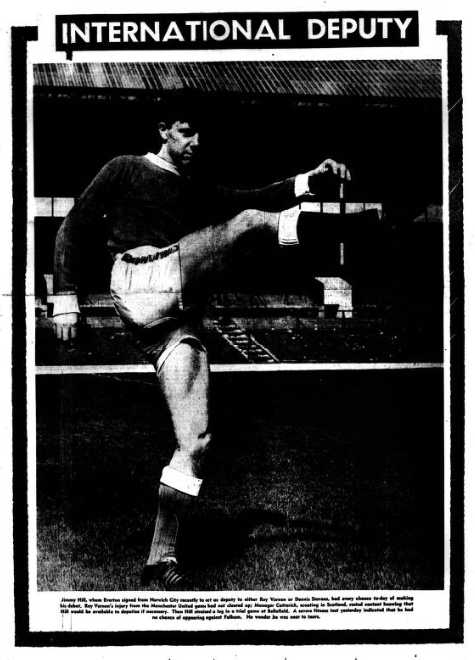
VERNON AND HILL ARE INJURED
Liverpool Daily Post – Saturday August 24, 1963
EVERTON OPENING GAME
MANAGER HARRY CATTERICK RISES BRILLIANTLY TO TEAM SELECTION CHALLENGE
By Horace Yates
After the curtain raiser of last week, the full treatment today, Everton make the headlines again in a way they would have preferred not to do so, for skipper Roy Vernon (that is what I convinced he will be, except in emergency, and barring any serious loss of form) is out of action with knee ligament trouble for the visit of Fulham to Goodison Park. Tony Kay, freely tipped in many quarters to be nominated captain, takes the reins, but I don’t think this is in any way the shape of things to come. Competition for this sort is not so fierce as some members of the public might imagine, for there are many players who consider it an additional obligation, the worry of which they are better without. Whether they would change their outlook if it carried an extra rewards is quite another matter, but manager take the view that the prompting, guiding and instructing comes almost exclusively from then and that skippers to-day have less responsibility than ever. The Vernon limp I detected at the end of the United game has proved more troublesome and serious than was thought and even now I understand no one can say with any degree of certainty whether the Welshman will be back in his vital role next Saturday, there being no mid-week game for the champions.
IRONY OF FATE
It is the irony of fate that Jimmy Hill the man who came from Norwich as an insurance against just such an accident is a training injury victim and so his debut is delayed, a disappointment indeed for an ambitious young man. Manager Harry Catterick, I consider, has risen to the team selection challenge brilliantly. Temple shooting record, was at heart an inside-forward until he was wise enough to see the possibilities opening up to him on the left wing, and imagine the effort Morrissey will put into his game at this unexpected chance! We have only to recall that Vernon scored three of the four goals by which Fulham were crushed in the concluding match of last season, to realize how difficult he is to replace, but so well are Everton moving that I don’t expect a Johnny Haynes reinforced Fulham will cause them to start off on the wrong football.
BIG GUNS
With Vernon out, it is imperative for the other forwards, all of them, to be completely attack conscious. There are enough big guns in the line to ensure that the wonderful home record is not impaired. Jim Langley, skipper in the absence of Haynes last season, is ill and is replaced at left back by Keetch. Dodging, recovered from a broken leg, has the job of trying to control the mobile Alex Young. The point occurs to me, who will take any penalty kicks that may come Everton’s way? While there has been no official pronouncement, I have no doubt sight has not been lost of it. Everton; West; Parker, Meagan; Gabriel, Labone, Kay; Scott, Stevens, Young, Temple, Morrissey. Fulham; Macedo; Cohen, Keetch; Mullery, Dodgin, Robson; Leggat, Brown S., Cook, Haynes, Chamberlian.
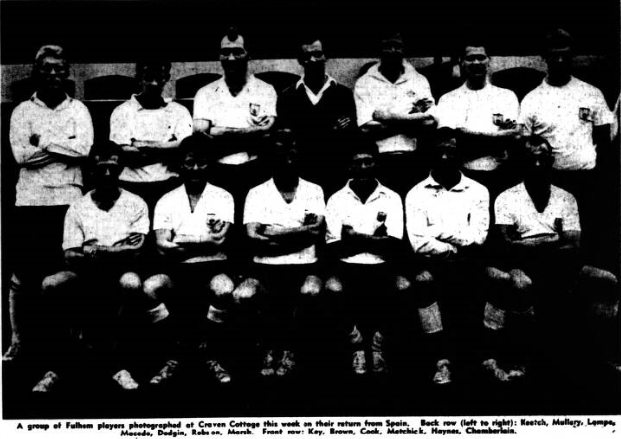
EVERTON REDEPLOY THEIR ATATCK
Liverpool Echo - Saturday 24 August 1963
VERNON AND HILL UNFIT, MORRISSEY ON WING
By Leslie Edwards
A week ago the chances were that Johnny Haynes of Fulham would be absent and Roy Vernon very much present and correct for the opening match of the season today at Goodison Park. In fact, just the reverse is the case. And what makes things even worse is that the man Everton signed to replace either of their inside forwards if injury hit them- Jimmy Hill of Norwich – is himself victim of injury. Hestrained a leg badly in a trial game at Bellefield in mid-week. When Manager Catterick returned yesterday from a scouting mission in Scotland he was shocked by news that neither Vernon nor Hill could play in the vital opening game. He has redeployed his attack by bringing Derek Temple to inside left, and introducing Johnny Morrissey into the vacant outside left place. The Everton manager was philosophical when he said yesterday of the blows which had befallen his team; “That’s football!” He realises as few other do that success in soccer is linked up with good fortune in having star players fit for most of the season. Injuries seldom come one at a time. It is more important than ever this European Cup season that Everton should be reasonably free from serious damage. Happily, Vernon’s injury is slight. He should be ready for the game a week today. Fulham, one of the most experienced sides in the League, have had more than their share of misfortune last season and this, Jim Langley their back, is out of today’s match through tonsillitis. Haynes will be making his big return to football after a long spell of inaction following his Blackpool car crash nearly 12 months ago; he partners “Tosh” Chamberlain, a Fulham favourite who is as go-getting as the big man Brian Labone, faces –Cook at centre-forward.
NO STRANGER
Derek Temple has rarely played in the inside-forward positions in recent seasons, but in the days when he came back to Goodison Park after a spell in the Army he cracked great number of scoring shots from the inner positions, so he will be no stranger to the role. The absence of Vernon, who is so often the generating force in the Everton attack will be considerable and Dennis Stevens will naturally be the man to shoulder most of the burden. If Haynes is back to peak form Fulham have some sort of chance. They did beat Everton in a rather tempestuous game soon after the start of last season, but that was at Craven Cottage and Everton had not the solidity they possess to-day. Everton; West; Parker, Meagan; Gabriel, Labone, Kay; Scott, Stevens, Young, Temple, Morrissey. Fulham; Macedo; Cohen, Keetch; Mullery, Dodgin, Robson; Leggat, Brown (S), Cook, Haynes, Chamerlain.
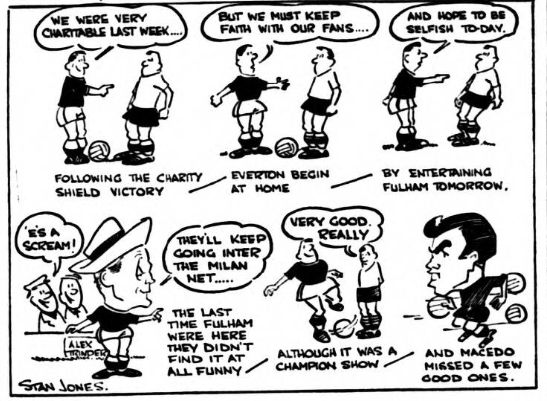
YOUNG SHOWS THE WAY IN GREAT GOODISON OPENING
Liverpool Echo - Saturday 24 August 1963
Champions coast to convincing victory
EVERTON 3 FULHAM 0
By Michael Charters
Everton; —West; Parker, Meagan; Gabriel, Labone, Kay (captain); Scott, Stevens, Young, Temple, Morrissey. Fulham.—Macedo; Cohen, Keetch; Mullery, Dodgin, Robson; Legget, Brown, Cook, Haynes, Chamberlain. Referee. Mr. A. W. Luty (Leeds). The overnight rain had made the pitch in perfect condition for Everton's opening League game of the season against Fulham this afternoon. The heavy clouds gave a hint that there could be more rain during the match, and we were spared, therefore, the usual heat-wave conditions which we have come to associate with the opening of the football season. Everton, playing the team against whom they clinched the championship in the final match last season. Werewithout their skipper Vernon through injury and brought Temple to inside left with Morrissey on the left wing. It was strange to see a Fulham side without the veteran Langley, the former England full back, who was injured in training. There was a flurry of rain as Everton came out captained by Kaye to a tremendous roar of applause from their supporters. Everton opened on the attack but neither Gabriel nor Scott could force a way through and Fulham retaliate, with a stood looking move in which Haynes played a major part. They earned a corner when Meagan headed away and from Leggat's kick West turned the ball over the bar. From the third corner the ball ran out to Mullery whose first time shot was deflected by Leggat with West way out of position but Parker cleared off the line. After six minutes Everton took the lead rather luckily with a goal by Young. From a long clearance by Parker, Young collected the ball near the goal line beat Dodgin, and his attempted centre glanced off Keetch to deceive Macedo who could only turn the ball into the net with a backward dive.
ATTRCTIVE MOVES
Everton took control of the game with the impetus of this goal. Both Kay and Gabriel were plying their forwards with plenty of the ball and Everton were moving attractively. There was another heavy shower now as long as a long pass from Gabriel intended for Stevens skidded off the damp turf and gave Stevens no chance of collecting it. A good move between Scott and Temple ended with Temple trying a low shot which Macedo saved well, and then Young delighted the crowd with a typical piece of artistry as he pushed the ball between Dodgin’s legs to Temple who was off-side.
CHANCE MISSED
Fulham were now doing as well as Everton in mid-field but without making any real impression on the Everton defence. Cook had a chance of putting Fulham on terms when a quickly slipped through pass by Haynes beat the Everton defence, but he shot tamely straight at West. Everton were not playing with the greatest conviction, however, and the best thing from them for some minutes was an astute pass by Meagan (which Scott collected in the inside left position and hit the side netting with his shot. Gabriel was ever ready to move up into the attack and twice he was only inches away from receiving a 1-2 pass from Young as he raced into the penalty area.
YOUNG DELIGHTS
Young's ball distribution was delighting the crowd and he suddenly looked Everton's best forward at this stage. Morrissey chased one of the centre forward's passes and caught it just on the line, but rammed the ball into the side netting as he went hurtling into the photographers. Everton were in a strong attacking groove now with Young brilliant. He very nearly turned a centre from Scott into goal with Dodgin lucky to intercept, and then he hit a 20 yards shot with great power which Macedo saved.
BRILLIANT SAVE
Only a brilliant save by Macedo prevented Everton from going two up. It was Gabriel who sent the ball through to Temple for an instant shot which Macedo turned over the bar with a flying save. From the corner Young contrived to work the ball through a forest of legs and then put a deliberate shot inches wide of the far post. Morrissey made a fine header from a right-wing corner which beat Macedo but slipped over the bar, and Everton could hardly have been more dominant at this point. Young’s performance was superlative. The first Fulham shot for some 20 minutes—a weak one —came from Haynes, and then Macedo made a lucky grab at a centre by Scott and was fortunate to collect it at the second attempt. West made a good save from a long shot by Mullery which came through a crowd of players, and then it was Everton back on the attack again without producing a shot to test Macedo. Half-time. Everton 1. Fulham nil.
A heavy shower during the interval made the turf even more slippery and the referee also changed the ball before the second half started. Early in the second half Young flicked the ball through for Temple to chase, and it took a despairing dive my Macedo to turn Temple's shot away. From the corner the ball ran out to Temple some 25 yards away and he hit it back instantly, the ball just sailing over the bar. Six minutes after half time Temple scored Everton's second goal to put something like a fair reflection on the run of play. From Scott's centre Young made a good header which Macedo beat out and the ball went Kay who mis-hit hip shot which turned out to key good pass to Temple who hit the ball on the volley into the net.
WEST IS FOULED
Immediately afterwards Fulham gained a corner on the right after a brilliant save by West who punched the ball over the bar from Brown's volleyed shot. From another corner Cook beat West, but obviously fouled him in so doing, and although Fulham claimed a goal the referee's decision to award a foul against West was perfectly correct. Everton were varying their corner kick-taking intelligently and from a short corner to Parker the ball went to Morrissey over on the right and his quickly hit shot went just wide.
CROWD ANNOYED
The referee has annoying the crowd with one or two decisions against Everton, and there certainly seemed a case for a penalty when Robson up-ended Young on the edge of the penalty area, but the decision became a throw in. Brown showed his power of shot again with a good effort which West saved at the second attempt, but generally speaking Everton were in command, playing grand football in mid-field, but not shooting so accurately as their build-up play deserved. Cook, well held by Labone, showed his annoyance that he did not receive a penalty award when he rolled dramatically several times after a Labone interception. The Fulham player's action may have looked good on the stage, but it had no effect on the referee.
OVERHEAD KICK
The game by now had lost some of its first half pace and fire and with the sun blazing down it was not surprising. Gabriel was constantly up in the penalty area for Everton corner kicks and he tried an acrobatic overhead kick when Dodgin headed the ball out and came quite close to surprising Macedo. Then Morrissey. going through from Kay's pass, hit a swerving shot which , Macedo did well to have, and Everton were lacking that little bit of luck in their shooting to really consolidate their superiority. Young's distribution continued to be inch perfect, and he headed through one pass to Steven's which could not have been better. Stevens did well when hampered on each side by Fulham players, to get in his shot, which went narrowly wide.
APPEAL IGNORED
Again the referee ignored Everton's appeals for a penalty justified in my opinion when Temple appeared to be knocked over from behind by Cohen. Then Scott, having one of his best games for the club, raced through and his fast centre was deflected by Dodgin on to the cross bar and over for a corner. Scott put Everton three up with one of the most spectacular goals seen on the ground for years. It followed a corner and the ball came back to him via a back-heel pass by Stevens, and Scott, standing outside the penalty area and only five yards in from the goal line, hit a tremendous angled shot which struck the inside of the far upright and was in the net before anybody could move. Final; Everton 3, Fulham nil. Official attendance: 49.520
KIRBY HAT-TRICK
Former Everton player George Kirby scored a hat-trick for Southampton in the first 15 minutes against Charlton at The Dell.
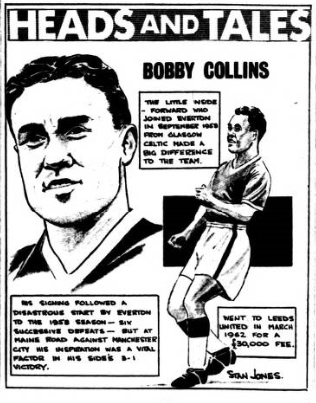
INS AND OUT OF PENALTY
Liverpool Echo - Saturday 24 August 1963
By Alex Young
There seems nothing quite like a penalty kick to start the fans talking, for while few people will question the justice of the award to us last Saturday against Manchester United, it nevertheless provoked much discussion. I thought there had been two earlier tackles by Manchester defenders which it might have warranted penalty awards, so in many ways this incident proved that third time sometimes really is lucky. In fact, Roy Vernon also approached the ball three times before he actually scored. On the first occasion, he saw Dave Gaskell the United goalkeeper, move as he ran towards the ball, so he did not take the kick. The second time Gaskell saved the shot, but the referee ordered the kick be re-taken. I am not sure whether this was because Gaskell moved again, or whether a United defenders stepped into the area too soon. The third time, Roy made so mistake. Have you ever thought which position you would rather be in for a penalty kick- goalkeeper or shooter. Personally, I would take the goalkeeper’s job every time. Looking job every time. Looking through the eyes of a forward, I see his position as one in which he has everything to gain and nothing to lose. If he saves there are congratulations and cheers, if he misses then no one complains.
ANXIOUS
On the other hand, the shooter has the odds in his favour and is expected to score. When he converts the kick he has just done what is expected of him, but if he misses then (to put it mildly) he is embarrassed. A team always feels anxious before the first match of the season, wondering whether the form they have been showing in training can be reproduced in an actual match. This is perhaps why it took Everton 20 minutes or so to get the measure of United, who had already played two full-scale practices in Glasgow and Germany. In the early stages United moved a little more easily than we did, but after Jimmy Gabriel had chalked up our first goal, our play improved tremendously.
STEVENS GOAL
I'll guarantee, too, that this is not the only goal we shall see from an Everton half-back during the season, for there is a hit of friendly rivalry between Jimmy and Tony Kay for the position of leading defender on the scoring list at the end of the season It wouldn't surprise me, either, to see Alex Parker putting in a challenge. Remembering the bad luck he had in front of goal last season, it was very pleasing to see Dennis Stevens nipping in to score a grand goal against United. Derek Temple, too, got a fine goal and I am sure we will see many more from him this season. This was a convincing start by Everton, but I expect to find United a different side when we visit Old Trafford next Saturday. They were well and truly beaten at Goodison and I feel this will make them keener than ever to level matters. I thought one of the United failings in the Charity Shield game was that they passed the ball too squarely and this is the kind of mistake I cannot see Matt Busby allowing them to make twice. You might have wondered, to,what happened to those famous accurate long cross-field passes for which Pat Crerand is so famous. The fact is that we saw them coming well in advance and plans were made beforehand for our wingers to drop back and cut off these dangerous Crerand moves a job they did exceptionally well. Outside training hours recently most of the Everton players have been busy distributing and selling the brochure we have produced to com have been showing in train-championship success. May Ipass on the thanks of the players to all who have supported our efforts by purchasing a copy.
CLUB SUSPENDED AFTER THREE CUP REPLAYS
Liverpool Echo - Saturday 24 August 1963
By Percy M. Young
Everton went about things with dignity, and before time move to Priory a declaration was circulated to the influential: "Allow us," it ran, "to introduce to your notice the position attained by time above-nomad organisation (Everton F.C.) and to solicit your most valued sympathy and support. “Established in 1879, it has gradually improved in strength and importance, until it now occupies a position second to none in the district; nor do its claims to consideration rest here, for as the club has, season by season, grown in strength, its effect upon the public has been both marked and encouraging, so much so that at any of its important fixtures there are large gatherings of persons numbering 500 to 2,000 seeking the Saturday afternoon's recreation, which the public parks are intended to provide for." The first match at Priory Road brought in a grand total of 14s. It was clear that a new ground could hardly be supported at this rate. At this point two characters came into prominence in the affairs of the club for different reasons. Both were, in different ways, benefactors. The headmaster of the Prince Edwin Street School was a remarkable Scotsman —Samuel Murdoch Crosbie, who was born at Kirkcudbrightshire in 1849. Crosbie had a rare devotion to education and after making up for the deficiencies in his own, by attending the Liverpool Institute to study Latin, Greek and German, became a pioneer in further through the evening con-education in in Liverpool through the evening continuation school and through classes for the police.
NEEDED MONEY
Frank Brettle was a member of staff at Prince Edwin Street and took him to see the Everton matches. (In his turn Crosbie took George Mahon —later to be a conspicuous figure in this story—to see the matches, and it was the football played by Preston North End that eventually determined Mahon to devote himself to the culture of the game.) Hearing that Everton needed money, and considering the social gains to be made through the encouragement of football. Crosbie arranged a concert by his Teachers' Choral Society at the Hand-in- Hand Club (later the Y.M.C.A) in Foley Street, and was able as a result to add £20 to the meagre club funds. John Houlding, already mentioned as landlord of the Sandon Hotel, was a different type of man, but equally representative of the Victorian era: the local boy who made good. Houlding was born in Everton in 1832, and, without benefit of much schooling, became an errand-boy the Custom House. He left this to assist his father as a "cow-keeper." but found himself out of occupation when cow-keeping was prevented by the cattle plague
LORD MAYOR
Young Houlding started once again at the bottom of a different ladder, in W. Clarkson's Brewery in Soho Street. Here he became a foreman and then a chief brewer. From this position he struck out independently, first as a licensed victualler, and then as the owner of a small brewery in Teignmouth Street in Everton. In due course he entered the City Council and became Lord Mayor. Sometimes they refer to Houlding as “honest John,” more often (since there was a rival for this title) as King John. The great man, however,made enemies and in midcareer their opposition to his interests caused much personal bitterness and a football crisis which belongs to the next chapters. Into his multifarious activities Houlding fitted a keenness for football that grew out of his own early participation in the game. As a young man he was also a keen swimmer and cricketer. In the latter capacity belonging to the Breckfield Cricket Club. Now Houlding esteemed football for its own sake, but he also perceived, at a time when it was clear that the game was likely to play a great part in Provincial social life and to achieve a great degree of popular appeal, that patronage bestowed on it might well bring certain advantages. Patronage always does. So it is that Houlding is now remembered not because he was a Mayor of Liverpool but because he played some considerable Part in building up the city’s football traditions. At this point then we ran summaries the main impulses which led to the establishment of the Everton Football Club: the Church, represented by St. Domingo's: education, through Crosbie and Brettle: and business, of which the symbol was the self-made Houlding. Moreor less, those are the fundamentals of every major English football club, though in each case the proportions of partnership differ. In the season 1883-4 Everton continued to play friendly matches against widely differing opposition that ranged from the Cheshire village team of Hartford St. John's (whom Everton defeated by 3-1) to the current holders of the Staffordshire Cup – Burslem, who beat them by 1-0 in Liverpool, but, deprived of the services of two players through injury, were held to a 2-2 draw in the Potteries. The Liverpool Cup competition began on November 19, 1883, Everton beating St. Peter’s. In the next round they defeated Liverpool Ramblers and, in the final, Earlestown. While thus involved they elected as a member of the club a young goal-keeper named Jimmy Trainer, who represented a type of footballer now becoming more evident. He saw a possible career in the game, and when the Everton committee felt that they could not displace Lindsay and that Trainer therefore must bide his time in the reserve team he went off to Bolton. Thence he progressed to Preston North End, and in the course of a long and distinguishedcareer became an international player for Wales. However, the Liverpool Cup had been won and in January. 1884. It was handed over to John Houlding, now president of the club. Ata meeting at the Sandon Hotel. The successful players received silver medals, as a gift from the vice-presidents. The Everton umpire, one Gunning, was accorded a special vote of thanks.
NEW HOME
In 1884 the committee faced a crisis Mr. Orritt found that football in his field was a growing distraction, and for domestic peace he gave the club notice to quit. However, a new home was quickly found. Mr. John Orrell of Orrell's Brewery had two fields and one of them he was disposed to turn over to the Everton club, subject only to the club agreeing " that we . keep the existing walls in good repair, pa, the taxes, do not cause ourselves to be a nuisance to Mr. Orrell and other tenants adjoining, and also pay a small sum as rent, or subscribe a donation each year to the Stanley Hospital in the name of Mr. Orrell." In this matter Houlding artfully arranged to act as the club's representative and to collect the annual subvention. It was not long before this caused trouble. In the meantime, however,the club looked forward to their new ground at Anfield Road. The first match at Anfield Road was against Earlestown on September 23, and the Everton team, which won by 5-0, was: Lindsay; Marriott, Morris; Pickering, Preston; Richards, Parry, Gibson. Whittle. J. McGill, Higgins. The season followed an amiable and satisfactory course, with a strengthening of the fixture list, which included teams as strong as Blackburn Rovers and Blackburn Olympic, Accrington, andBolton Wanderers. Locally there sere the by now customarily ferocious encounters with Bootle, and Cup engagements with hopeful combinations such as Toxteth Wanderers. In all, 32 matches were played of which 10 were lost and four drawn: 80 goals were scored against 13. In 1885 the toleration of professionalism by the FA, inevitably brought changes to Everton, by now in no two minds about the course they were to follow. George Dobson was acquired from Bolton. George Farmer from Oswestry and Alec Dick from Kilmarnock. Money was now not so tight, for the income from spectators at Anfield Road was £200. The committee thought it should have been more and gave instructions regarding a closer check Lin the gate receipts
STATE OF FLUX
The officers were also in a state of flux. At the annual general meeting in 1884 Brettle -recovering from a broken leg sustained in a reserve match became secretary, to be succeeded first by Thomas Higgins and then by Alec Nisbet, who held the reins in 1886. When Parry, also incapacitated through Injury, resigned the captaincy he handed over his duties to George Farmer, whose team for the 1885-6 season generally comprised: Joliffe: Dobson, Dick; Kirkwood, Gibson. M. Higgins; Fleming. Briscoe, Wilding, Farmer, Costley. This now conventionalized formation was strong in defence and after losing to Bolton Wanderers (3-1 )and Rawstenstall (4-3) went on to account for St. Benedict's (5-0), Darwen (1-0), Stanley (3-1), Accrington (2-1), Astley Bridge (4-0), Derby County (4-1). Rossendale (3-0), and South Shore,(Blackpool) (5-0). But the Lancashire Association found Everton below the high standard they required and on August 5. 1886, resolved "that Everton be not allowed to play for the Senior Cup until they show proof of their ability : a disappointment for Liverpool in a year in which local pride had risen to a peak through the visit of Queen Victoria (for whose pleasure the Indefatigable Crosbie conducted a choir of 60,000 schoolchildren) to the Liverpool Exhibition. A year later, after Everton, now reinforced by R. R. Smalley, J. Weir, and R. Stephenson, had won the Liverpool Cup again, the County Association relented, resolving on September 6 1887, that “the application by Everton F.C to play in the Senior Cup Competition be granted.” The autumn of 1887 was distinguished by Everton’s valliant endeavours to pass through the first round of the F.A Cup (In the previous year Everton had entered but when Glasgow Rangers arrived to play the tie, Everton, suddenly discovering their best player ineligible, withdrew and substituted a friendly match). Success in the competition during that period was often due to an appreciation of legal arguments rather than to actual skill in football, and so it proved in this case. On October 15 Everton went to Bolton, where the Wanderers won by 1-0. The credentials of Bolton’s best forward, William Struthers, having been questioned and investigated, the F.A ordered a replay. This drawing an attendance of 5,000 on October 29, ended nugatoryat 2-2. On November 13 Everton went back to Bolton and an attendance of 6,000, this game “ended in darkness and in a draw.” Thus a fourth meeting was necessary a week later. The gate increasing again by 1,000, the rival committee saw no reason why the series should come to an end when profits were to be reaped; thus after Everton had won by 2-1, the Bolton officials lodged a hopeful protest against Weir (formerly of Third Lanark) and Smalley (formerly of Losock Hall). The F.A having left sufficient time for Everton unsuccessfully to play Preston in the next round, ruled against Everton, held that players who were not, had been registered as amateurs and suspended the club for a month.
VILLA BATTLE
After these alarums, time passed more amiably, Farmer, whose clever co-operation with Fleming was an effective factor in the team’s successes, was selected as the reserve outside-left for the North side which played the South at Derby on January 7. There were praiseworthy victories over Port Vale and Burnley, an exciting, rumbustious draw against Derby County and a thrilling battle against the Villa premonitory of the 1897 Cup Final on March 24. This attracted a gate of 6,000 (exceeded a fortnight later when West Bromwich Albion, with whom Everton long retained fraternal associations through their willingness to play in West Bromwich in aid of local charities, drew 10,000). This match was magnificently balanced, with Dick and Dobson conspicuous in the home defence, and Devey in that of the Villa, and with elegant and thoughtful football coming from Fleming Farmer and Briscoe in Briscoe in one forward line one forward line and Hodgetts, Allen and Hunter in the other. The outcome of this contest was a narrow 2-1 win by Villa, but Everton’s display was worthy of the highest commendation. They were rightful candidates for election to the Football League to begin operations in the autumn.
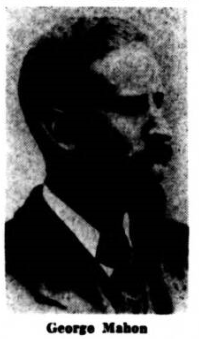
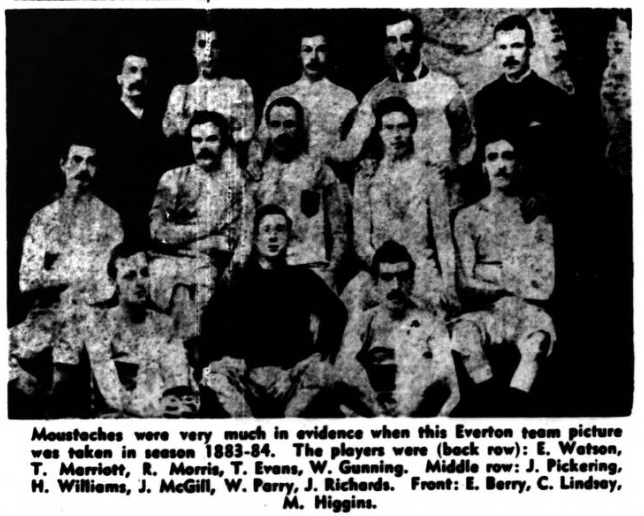
PRESTON RES V EVERTON RES
Liverpool Echo - Saturday 24 August 1963
Preston N.E Res; Barton; Donnelly, Nettleton; Kendall, Jacques, Lapot; Lee, Barber, Hapier, Alty, Watt.
Everton Res; Rankin; Parnell, Thomson; Sharples, Heslop, Harris; Humphries, Harvey, Rees, Hurst, McKenzie. Referee; Mr. R. Harding (Salford). There were six changes in the Everton Reserves team that visited Preston. Everton were quickly to the fore with several attacks, one of them giving Rees a good shot at goal which Barton held. At first more consolidated in attack than Preston they occasionally showed themselves lacking as when Lee dribbled unopposed for 20 yards towards the Everton goal. They were very lucky when Barber missed a hard shot with Rankin on the ground. On the left wing McKenzie centred near the bar, but Barton flicked the ball out and it went to Humphreys. He passed to Rees, who gave Barton no second chance with a close shot to put his side one up after 39 minutes. Half-time; Preston N.E Res nil, Everton Res 1.
LEAD LEAGUE IN GOAL AVERAGE
Liverpool Daily Post – Monday August 26 1963
EVERTON 3, FULHAM 0
By Jack Rowe
Not so long ago it would have been heresy to suggest that anyone could take the place of Dixie Dean, the finest of all centre forwards in the minds and hearts of Everton supporters for his spot in the Goodison Park Hall of Fame in the shape of Alex Young.” True, they played in different area and with Dean still holding the record for the highest number of goals in a League season, but even if Young is unlikely to smash that feat his contribution to what is a great Everton side and his ability to charm and entertain a rapidly putting him in position where he may outshine the Dean memory.
YOUNG SUPREME
Young scored in this game at Goodison, but it was his superb control, brilliant footwork and accurate passing with foot, and head which made him my star. Where Young is so supreme is in his ability to take immediate control of the ball and he ready for his next move, while an opponent is still trying to find a challenging position and if the chances he made had been taken Everton must have won by another three goals. If Vernon had been playing that would have been the case, for although Temple did well (and scored) he lacks the quickness of the Welshman with the half chance. Everton showed, even when not at full strength, they are a side capable of keeping the championship, for Fulham, after the opening ten minutes were never given the opportunity to make a match of it. Gabriel, Labone, and Kay saw to that although it was which gave Leggat a chance, when Parker kicked off the line with West beaten. That completely dominant that even Haynes disappeared, not once making a really penetrative pass.
ALMOST IMPUDENT
From the strength of Everton’s middle line stemmed a display of confident football which at times bordered on the impudent. Fulham, in comparison were a mediocre side and sterner feast, but it was the way they went about things that was impressive. They had confidence in their ability the occasions the ball was cleared without thought of construction were negligible and they have the art of injecting their game with power when necessary. Small wonder then that Fulham were shut out to a point where West had only to make a couple of real saves while Macedo was constantly thwarting the Everton attack in the second half. He made two fine stops from Temple before Derek got his goal in 51 minutes. It was remarkable that we had o wait until the 80th minute before Scott made it 3-0 with an angled drive of terrific force, which was in net before the goalkeeper made his move. Scott joined Young and Gabriel as Everton’s outstanding players. He gave Keetch a nightmare of a match especially in the second half, and his goal was the most spectacular happening of the game. This, however, was a team triumph, because every player did his part, and if one picks out Young it is because his genius makes him such a crowd pleased.
TINGLE OF FORTUNE
There was a tinge of fortune about the goal he scored in six minutes, but not in the way he beat three men near the line before chipping towards the other side of goal. It touched Keetch, so that Mecedo, moving out of his goal, had to twist backwards and although he got his hands to the ball he could not keep it out, goal, had to twist backwards and although he got his hands to the ball he could not keep it out. Young made the headed pass, following a Scott corner, which led to Temple’s goal, and the ball skidded, Temple whipped round and drove it high into the net. Then came Scott’s whiplash and if you worked out goal average after only one game Everton are still top of the First Division! Haynes flourished for a few minutes, but the only Fulham players who took much of an eye were Macedo, Cohen, Mullery and Brown. Everton; —West; Parker, Meagen; Gabriel, Labone, Kay (captain); Scott, Stevens, Young, Temple, Morrissey. Fulham.—Macedo; Cohen, Keetch; Mullery, Dodgin, Robson; Legget, Brown, Cook, Haynes, Chamberlain. Referee. Mr. A. W. Luty (Leeds). Attendance 49, 520.
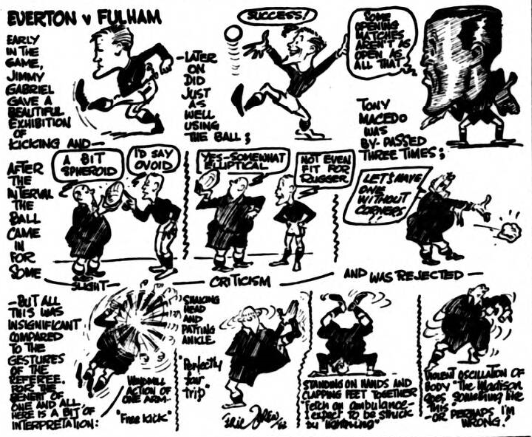
PRESTON N.E. RES 0 EVERTON RES 1
Liverpool Daily Post- Monday August 26 1963
Preston North End Reserves did well to restrict a more experienced Everton Reserves side to the only goal of a scrappy Central League game at Deepdale. Rees scored the goal from short range when a wing-to-wing attack had spread-eagled North End’s defence in the 40th minute.
PLAY AND DEPORTMENT SUPERB!
The Liverpool Echo & Evening Express, Monday, August 26 1963
By Leslie Edwards
Some good came of the inopportune absence through injury, at Everton forwards Roy Vernon and Jimmy Hill. A redeployed attack, with Derek Temple at inside left and Johnny Morrissey as his partner demonstrated its effectiveness so thoroughly against Fulham Manager Catterick now has a useful extra permutation of players for what is bound to be the busiest season in the club’s history. But the men of the match were not the two introduced at the eleventh hour. They were deputy skipper Tony Kay and outside-right Alex Scott. Kay red-haired but not fiery as he used to be played brilliantly at little more than walking pace, generalling his side sliding his passes accurately and at such unexpected angles the Fulham defence were flustered if not flabbergasted by them. This was Kay’s best since he joined the club from Sheffield Wednesday. He should have credit, too, with the rest of his team for accepting without demur all adverse decisions. Everton have become more matured in this respect this season and their play and reputation is all the better for it. If chairman John Moores’s excellent advice to players to let the referee be the policeman is kept in mind, Everton’s path to the top in British and world football will be the smoother. Scott, too, had his best game since he came to Goodison Park. He has always had speed now he showed craft and a big shot with either foot. He may have been fortune to score down such a fine angle but his fluent weaving style and the amount of work he did on Saturday at least called for his name to be among the scorers. If he centred more promptly after getting a clear opening to do so I think his effectiveness would be greater but this is a small point. He had a great day and with Kay earned an ovation of their own.
IT HAD EVERYTHING
For me the match was refreshing compared with the one against Manchester United. Although the wind blew half a gale, although Fulham are not reckoned to be in the same street as United, although it rained and the ball tended to fly fairly fast off the tremendous turf the match as a spectacle could hardly have been bettered. It had everything. Fine shooting, fine goalkeeping, sustained movement and command by Everton almost from first to last, though Fulham kept plugging away in the hope that they might fight their way to a point. There was more sustained interest and excitement in five minutes than there were in the 90 of the Charity Shield contest. The tempo was set by Kay who moved at his own pace, doing cheekily the fundamental chores of the half back making it all seem so easy where, in fact that kind of football is desperately difficult. Kay left the attacking role to Gabriel he elected to play deep giving assistance to Labone and Meagan in turn. And it was not that they ever needed much. Indeed, the solid Cook, who led the Fulham line, became so frustrated at Everton’s barrier reef line of defenders he indulged himself in protestations which brought him warning from Referee A. W. Luty. The crowd got on his tall too. A pity because although Cook was fated not to succeed his play for 45 minutes at least showed him to be a more talented header of the ball than we ever suspected. Fulham often had moments of inspiration, prompted by Haynes who looked good as ever and the ball often slipped to a Chamberlain out on his own on the left-wing but singularly little came from that flank because Parker prevented his man from coming inn on “the inside.”
THE PERFECT PASS
Everton won 3-0 but might well have won by twice that margin. Macedo made some fine saves, the best the one-handed involuntary movement to Temple shot after Gabriel had produced the opening. Macedo had earlier crowded Temple shot from the most perfect five-yard lateral pass by Young- the pass of the day. Parker had done his day’s good deed with an off the goal-line clearance when Young put Everton in front. His dug-up centre, deflected off the body of Keetch, fell just under the bar where Macedo in trying to keep the ball out only succeeded in putting it on to the under-side of the bar and so into the net. Temple checked a lovely left foot shot after picking up a Kay shot which had been deflected to out his side 2-0 in front. Scott came along with the third off a tremendous cross shot, truly hit with the crowd rising to him for the goal and for the weight of work he had undertaken. A Brown half volley, which West saved magnificently one-handed, and a low hard hit shot by Mullery plus a goal probably from an offside position were the only consolations Fulham could take from a match in which they were almost second best, but never completely humbled. If the veteran Langley and not Keetch had faced Scott the Londoners might have come off better but their main lack was power and finish in the attack and ability to tame an Everton attack which could scarcely have had the ball better presented from Gabriel, Kay, and company. Considering Everton had Vernon and Hill on the side-line their makeshift attack could hardly have done better. Temple cracked one volley inches over the top- perhaps the best shot of them all- and fitted happily into his fairly unaccustomed position. Full marks to Everton for a solid clean competent show.
VERNON IMPROVING
Liverpool Daily Post – Wednesday August 28 1963
By Horace Yates
I understand there is better news for Everton fans of the conditions of skipper Roy Vernon. There has been a noticeable improvement in the last day or so and if progress is maintained when Vernon reports to Goodison Park today, it is probable he will be back in training. Then we shall have to see how he stands up to exercise after more than a week of enforced idleness, but it is encouraging to think there is at least a chance that Everton may have him back in action for the match with Manchester United at Old Trafford on Saturday. Another addition to the Everton injured list is George Thomson who is nursing a damaged ankle, which could keep him out for several matches. Injuries, always unwelcome, have struck early at Goodison Park. Let us hope their bad luck in this respect has run out and that they can face the tasks ahead at full strength.
Another feature of Tranmere’s good week-end was the performance of the “A” team, which beat Everton “A: 3- at Greasby in the Lancashire League, Everton, champions of their League last season, have an older-team on a verage than the Tranmere youths and Mr. Russell is full of praise for his promising youngsters.
FOOTBALL PARKKING
Liverpool Echo - Tuesday 27 August 1963
The wide measure of support for Councillor Flude in his campaign to improve parking at the Liverpool and Everton matches shows how great was the need for action. Speedy cooperation has been forthcoming from the Chief Constable, and it is to be hoped that with the better arrangements residents in the area will have no cause for complaint in the future.
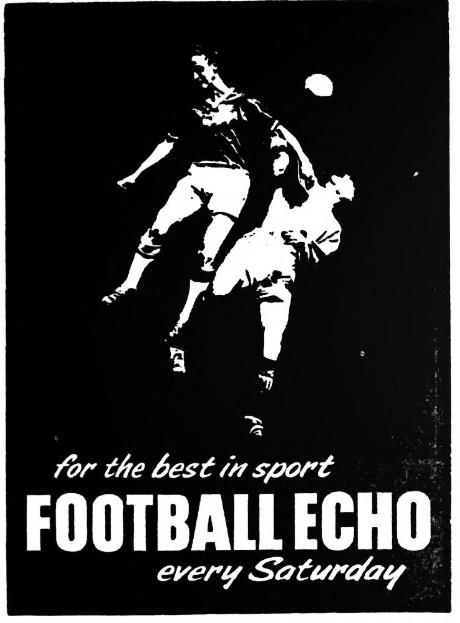
EMHEMERAL FAME
Liverpool Echo & Evening Express – Wednesday, August 28 1963
By Leslie Edwards
Football fame is often ephemeral. Take the case of Jimmy Dunn the old Everton forward and one-time Scottish blue devil (he played in that most famous Wembley win against England. At his funeral on Saturday only a few old timers remembered –Dixie Dean, Ted Sagar and Billy Cook of his old club and Alf Hanson, Tom Scott and Cyril Done, of the enemy camp at Anfield. Yet in Everton’s hey-day Jimmy was as much an idol as any of the men who graced the clubs present attack.
A phone message from Tony Kay (Penrose Avenue West, Liverpool 14 tells me of his painful experience at Ewood Park on Saturday. He was watching the game and minding his own business on the terrace on the terraces, behind the city goal and when a bottle flung from behind, landed on the back of his head and knocked him cold. He came to in the dressing room where a doctor put two stitches in the largest of the cuts on his head. “I was glad it hit me and not the kiddie standing a yard or two away, he said. “There had been a schemozzle between fans and police. I don’t think the missile was aimed at me, but that is little enough consolation.”
Tom Connor (79 Upper Warwick Street) will applaud the Blackburn Chief Constable’s edict that he children shall watch the game from inside the barriers when Everton and Liverpool next play at Ewood Park. Mr. Connor say; “I write complaining bitterly at the ridiculous incidents which occurred at Blackburn. My friend and I always get into the grounds early so that they may get a place at the front and miss nothing of the play. We had a good spot by the wall until the children started to sit on the forms in front of the wall. “Although, through their bobbling up and down we must have missed seeing a quarter of the game. When Liverpool got their penalty it was only by super-human efforts that we managed to see anything of it.
FOLKS –AND THINGS THEY DO
Everton soccer star Tony Kay, and several other players, have a fixture tomorrow evening at a hostelry in Zante Street, Liverpool 5. Tony is “knocking down” a column of money built up by customers for the spastics. Landlord I, M Isaacs reckons the cash will total around 90 pounds
MORRISSEY AND HILL DOMINANT
Liverpool Daily Post – Thursday, August 29, 1963
BOLTON RESERVES 0, EVERTON RESERVES 3
Smart play by Everton’s experienced left wing partnership John Morrissey and Jimmy Hill the former Norwich inside forward, had a great part in the victory at Bolton last night. Morrissey opened the scoring in the 19th minute after a clever cross from right winger Shaw. In the second half Bolton were without their centre half Hatton suffering from concussion and they conceded two goals in the last ten minutes to Shaw and Sharples. Bolton fought strongly with their depleted side and the late goals resulted from defensive slips.
BID TO AVERT CITY RAIL STRIKE
THREAT TO “SPECIALS”
ON SATURDAY
NEGOTIATIONS ARE TAKING PLACE BETWEEN British Railway and Merseyside officials of the National Union of Railwaymen in an attempt to avert an unofficial one-day strike at Liverpool Central station on Saturday. One hundred and fifty railwaymen could be involved in the stoppage, which could affect the operation of more than 130 trains. These would include three football excursions which British Railways plan to run to Manchester for the match between Everton and Manchester United.
RESIDENT’S PETITION
FOR ACTION ON STREET PARKING
TELL LORD MAYOR; VICTIMS OF CONGESTION
A petition signed by 600 residents against indiscriminate parking on football match days was handed to the Lord Major of Liverpool (Alderman J. McMillian) at the Town Hall today. The petition was handed over by Councillor Pat Wall, of County Ward, and Councillors Eric S. Heffer, prospective Parliamentary Labone candidate for the Walton Division. It read; “We, the undersigned adult residents in the streets surrounding Goodison Park football ground, being victims of growing congestion and intolerable nuisance on football match days was handed to the Lord Mayor of Liverpool (Alderman J. McMillian) at the Town Hall to-day. The petition was handed over by Councillor Pat Wall., of County Ward, and Councillor Eric S. Heffer, prospective Parliamentary Labour candidate for the Walton Division. It read; “We, the under-signed adult residents in the streets surrounding Goodison Park football ground, being victims of growing congestion and intolerable nuisance on each occasion a senior match is played, petition you to take immediate action to store our rights as ratepayers and citizens. We demand that the City Council alone, or in conjunction with the Everton F.C., provide adequate parking facilities for all football patrons. We further demand that at least one public toilet is provided in the vicinity of the ground.”
NOT SATISFIED
It also asked that a number of measures concerning parking and police supervision be immediately implemented in the interim period. Councillor Wall later told the Echo that although conditions were somewhat better on Saturday following the efforts of the Chief Constable, Mr. J.W. T. Smith, to improve the position, they were still not satisfied. “Double parking still existed last Saturday although things were better and entries were used as public toilets.” He said that a public meeting was to be held to-morrow night at Arnot-street School and that a motion was being put on the Council agends for next week’s meeting asking that the terms of the Lord Major’s proclamation of 1960 governing parking in the area be strictly carried out. Councillor Heffer said he wished to make it clear that they were not trying to stop anyone going to the games. He was a football fan himself, but the welfare of the residents in the area had to be considered.
ROY VERNON SAYS…
Liverpool Daily Post – Friday, August 30, 1963
WORMS EYE VIEW WAS AN EXPERIENCE
There is always something new in the life of a footballer – even when he is not playing. Last Saturday my colleagues in distress, Jimmy hill and I, watched the match against Fulham from the trainer’s box, and the worm’s eye view was quite an experience. While we had quite a good view of the game I don’t think there is any game I don’t think there is any doubt that a stand seat is infinitely better, mainly because from an elevated position you can see the moves unfolding. But at the same time, near the pitch the atmosphere is more live, you are nearer the players and feel more in the game and I found myself thinking that if I were on the pitch I would be doing this or that. It all seemed so very much easier and I found myself wondering why I found many of the games so hard! Of course, some of the spectators have known for a long time that they could do better themselves. Perhaps, like me, they would find it harder out there in the middle instead of on the sidelines. I don’t need to be told that Fulham are not the toughest opposition in the land, but looking on at this first game in real earnest I found no reason to revise my view that the Championship is staying at Goodison Park. I thought our lads were so much in command that had Fulham been able to score Everton could promptly have swept down and put another goal or two past Macedo. They did enough to win comfortably and nobody can ask more of any side.
SEVEN WITHOUT REPLY
You may have noticed that if we include the Charity Shield match Everton have scored seven goals without response. That is the sort of average that kills off opposition quicker than anything, it was said last season that Everton conceded goals more grudgingly than any other team. If that be true, I think you will find we are going to becomes real misers this season. Any team that scorers goals against us will have to earn them and, as the back-bone of every side in its defence, Everton could hardly be in better health. The first “derby” game this season is at Anfield at the end of September. We will do our best to keep our record intact for this meeting and, if Liverpool can play their part as well, what a game it will be! There is nothing a player hates more than being out of action through injury, and so I admit I have spent a worrying few days wondering just how serious my leg injury was going to be. Happily things are on the mend and I am looking forward to the verdict “You play on Saturday.”
WELL DONE, STOKE
An injury at this time of the season is upsetting, for it prevents training at the very time when the two-games-a-week programme are giving players an edge to their fitness that helps them through the rest of the programme. In December or January a player is so fit from match practice that a week’s lay off is neither here nor there, but it can be an awful climb back before that peak is reached. I am not alone in thinking that a good start to the season is of tremendous importance to a club and on that reckoning Stoke City must be delighted with themselves. It is a tremendous start and I wish them well, but it is one thing starting well, and another keeping it up through the programme and with all the good will in the world, I cannot see Stoke City being challengers for the title. As the season unfolds, I think club will be developing a healthy respect for the young and powerful West Ham side. They have the power to stay the course and I would not be surprised to find their defence second only to Everton. We were a bit disappointed with the size of the crowd for the opening game. I know Fulham are not a Manchester United (who opened our Goodison fixtures last season with a 60,501 crowd) and that the circumstances were different from the last occasion when Fulham played at Goodison before 60,578 spectators but last week’s gate was nearly 2,000 down on the season’s average of 51,423. Still, I expect we shall make up for that before many weeks have passed.
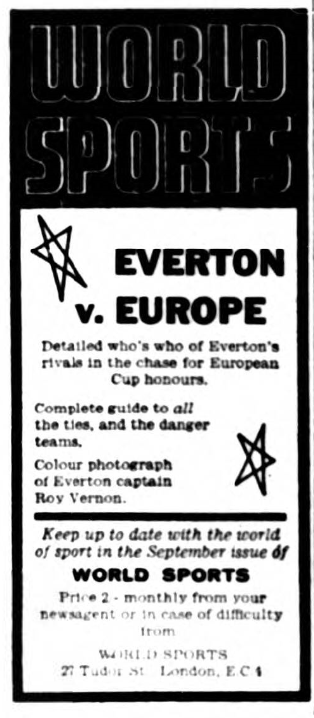
EVERTON AT OLD TRAFFORD
The Liverpool Echo & Evening Express – Friday, August 30, 1963
By Leslie Edwards
Before I deal with Everton’s attempt to bring off a quick double against Manchester United I must thank the many who wrote pointing out my mistake when I said that Johnny Haynes was missing from the Fulham team at Goodison in the final match last season. Haynes did play in this game and although I did not see it I should have remembered. The nearness of Old Trafford and the nature rivalry between Matt Busby’s Busby’s old champions and the new Everton ones plus the several ‘niggles” of the Charity Shield game at Goodison Park a fortnight ago make tomorrow’s meeting likely to be merrier than meek. It could be that United will be keener to produce their Cup winning form this time than they were when any last faced Everton. The question arises “Who is going to take the mickey out of whom.” On the evidence we have seen Everton are the more solid and certainly the move mature team. The five of League competition with United anxious to add to the these points from four they have already collected with Everton just as anxious to climb into top position again, makes this the most dynamic match of them all. One naturally hopes that the few who travel away with our ides and make themselves a nuisance will appreciate at last that the world of soccer is looking eagle-eyed to denounces the majority rather than the few. The pity is that hope is all we can do. Given as good a performance as the one against Fulham, Everton would succeed. Much depends of course whether their opponents are at their mercurial best –or worst.
QUICK QUOTES
The answer is simple. Don’t let youngsters sit on the track. Why Blackburn do it I don’t know. It does not happen at Anfield and Goodison Park. Blackburn should build a boy pen “M. Clifton and E. Growney, 27 Groveside West Kirby.
What do Blackburn want. The cry has been of lack of support by most clubs. If our youngsters could not raise a cheer and a bit of enthusiasm when their team-scores we would certify them, as Zombies, Heaven help Blackburn if the West Indies ever tour out a soccer team-W.E. Smith, ! Dyke Street, Everton.
Evertonians have been heard saying that their team could do with an outside-left. What’s happened to Johnny Morrissey, said to be the buy of the season?” I will say this, Johnny has a steady job for one year carrying the league championship-trophy round the Goodison Park pitch. Len Griffiths 17 Castle Street, Birkenhead.
GREEN IS BACK
Former Everton amateur inside-forward Chris Green who missed the mid-week game against Mossley due to injury, is expected to return to Northwich Victoria attack against Congleton Town tomorrow.
CHARLTON IN FORM
Liverpool Daily Post – Saturday, August 31 1963
By Horace Yates
Charlton had rediscovered his elusive form, but the task of keeping in subjection will hardly prove any more difficult for Alex Parker than was that of trying to cope with Moir at Old Trafford last season. This time Moir has switched wings and the headache is transferred to Mick Meagan whose cool, calm approach to situations of challenge makes him ideally equipped to cope with a player who can pose quite a problem. Gregg is in the United goal but I doubt if he will prove more of an obstacle than did Gaskell at Goodison Park. Look at the position as you will, and remembering that Everton will have almost as many supporters to cheer them on as will United, it is difficult to make out a case for United to reverse the verdict, even though goals may not be so plentiful as at Goodison. While Everton were able to make light of Vernon’s absence against Fulham, it is cheering to see him back again and the forward line restored to its normal formation. Accepting that it was Young who counted for Everton last Saturday and not a Macedo own goal that leaves only Vernon and Stevens of the forward line to open their League account. Today is as good as any to put that right. Manchester United; Gregg; Dunne, Cantwell; Crerand, Foukles, Stiles, Moir, Chisnall, Sadler, Law, Charlton. Everton; West; Parker, Meagan; Gabriel, Labone, Kay; Scott, Stevens, Young, Vernon, Temple.
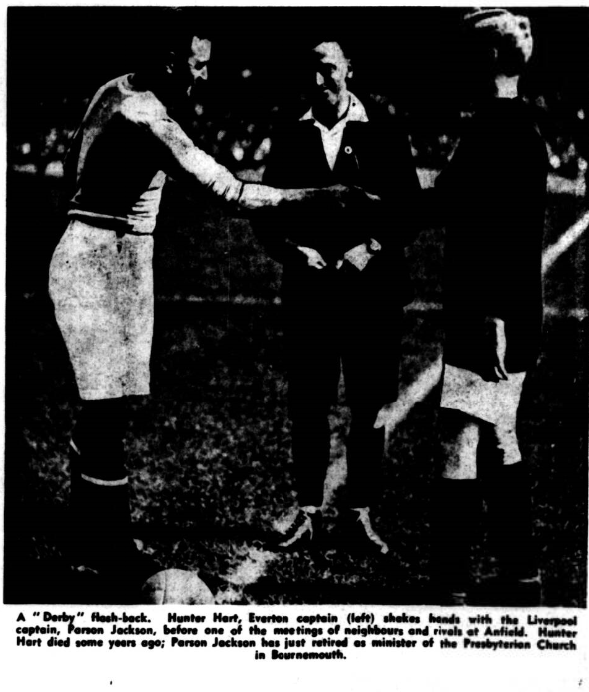
EVERTON HIT BY UNITED ONSLAUGHT OF FIVE GOALS
Liverpool Football Echo & Evening Express- Saturday, August 31 1963
MANCHESTER UNITED 5, EVERTON 1
By Horace Yates
Manchester United;- Gregg; Dunne, Cantwell; Crerand, Foulkes,Stiles;Moir, Chisnall, Sadler, Law, Charlton. Everton; West; Parker, Meagan; Gabriel, Labone, Kay; Scott, Stevens, Young, Vernon, Temple. Referee; Mr. K. Howley (Billingham). With the knowledge that Charlton had rediscovered his shooting power, Everton were almost given a first minute opportunity to discover it for themselves when Sadler and Stiles teed up a chance for the left winger but Charlton blazed away over the bar. It was disconcerting to find that Moir had the beating of Meagan for speed and when he crossed the ball the intervention of Gabriel was timely.
STEVENS EFFORT
From the moment that Gabriel stopped Law inside the Everton half. Everton moved forward will be a long pass from Young to Stevens, who hit the ball first time. It was a terrific drive which Gregg smothered only at the second attempt. The United goal fell in sensational fashion in eight minutes. Cantwell crossed the ball to Crerand, whose pass was intercepted by Young and he pushed the ball forward to Vernon who hit a great shot which went into the net off the post. United struck back and Law pulled the ball just wide with West at the other side of the goal.
FINE MOVE
A line move by Everton was denied a goal only by an accurate grab by goalkeeper Gregg. It all began inside the Everton half when Vernon tapped the ball back to Gabriel who found Stevens in the open space to the right of goal. Stevens centred and up went Young with a header that was right on target until Gregg leaped across to pull it down. Again Everton struck with a movement covering almost the length of the field. It was a Gabriel, Vernon link-up which began it, and Young’s shot struck Foulkes. Everton were quick to intercept passes and United were lucky side not to concede another goal in 20 minutes when a terrific drive from Stevens shaved the crossbar. Vernon appeared for a penalty when Temple fell over Crerand’s legs. Just when it appeared that the fire had departed from the Law-Charlton menace. Charlton unleashed a shot which was pushed round the post by West for a magnificent save. The corner kick proved fatal for when West punched the ball out Moir headed back to Chisnall who hooked the ball beyond West in 24 minutes.
INSPIRED
The goal set the game alight, and United became a team inspired. Everton went down in 31 minutes and again Moir was the menace. Instead of pushing it out to his winger, he turned it inside to Chisnall who hit the ball first time and West’s dive was completely unavailing. A good approach by Everton through Scott might well have produced an equalizer had not Temple muffed his shot. Then Temple presented Young with a perfect shooting chance and the centre forwards drive was no more than a foot the wrong side of the post.
VERNON EXAMPLE
Vernon sought to set a captain’s example and when he found a solid red line of defenders in front of him he took the ball out to the right, worked it back to make a shooting position ad could scarcely have been nearer the target. This was not Temple lucky day for Gabriel cleared the goal with a centre from the touchline and Temple appeared to be taken by surprised when the ball cleared the defence to drop invitingly in front of him. All he could do was push the ball wide of the post.
Half-time; Manchester United 2, Everton 1.
It was revealed during the interval that Dunne had helped Vernon’s shot into the net for Everton’s goal. Moir was soon away from Meagan. He cantered down the wing and his shot beat West but was just wide of the target and when Charlton raced up to hit the ball he put it into the side netting. Now it was Everton’s turn to become ragged and disjointed. Law had come into the picture only occasionally, but his class was obvious when he found. Charlton with a magnificent pass. The winger repaid the compliment by putting the ball back to Law’s feet right in front of goal if the inside forward could have controlled the chance immediately he had a first rate scoring opportunity.
CHARLTON MOVE
Sadler scored another goal for in 53 minutes. It was Charlton who flashed the ball beyond West and when Meagan pushed it out Sadler was there to hit the ball into goal. After Vernon had been spoken to be the referee. Gabriel was booked by the referee. Everton fought back and Vernon, Temple and Young were all crowded out as they attempted to rain shots on the United goal. When Young drew Gregg out of goal and centred it seemed that Everton must score but Stevens pushed the ball outside. The game was held up while Temple received attention for a leg injury. United began to toy with Everton defence, it was a measure of the way United had taken command of the game that they were able to bring the ball out of their own terribly right up to the Everton goal, and Sadler only just rallied to beat West. Temple, still limping from his previous injury, was hurt again with 25 minutes still to go. Trainer Eggleston bandaged Temple’s leg just under the knee and as the winger bobbled painfully it seemed too much to expect that he could play and important role in Everton’s plans. Everton had neglected Scott and it was as if they realized that now they must play to the right, with Temple injured for Gabreil promptly switched play in that direction.
HAMMER BLOW
Everton’s much-vaunted defence took a hammer blow in 70 minutes when Law scored a fourth goal. Chrisnall made the initial approach and Sadler pushed the ball to Law, who was given any amount of room in which to pick his spot for a shot. If United needed any revenge for their Charity Shield defeat at Goodison, a fortnight ago, here it was in abundant measures. The crowd set up the chant. We want five Everton were lucky to get away without a penalty kick being awarded against them when Parker knocked down Charlton’s shot just inside the area. United duly got their fifth goal in 80 minutes when Crerand found Charlton in front of goal Charlton twisted round and gave West no hope of saving. Final; Manchester United 5, Everton 1. Official attendance 62,965.
Lancashire League
Everton A 8, Blackburn A3
Everton B 5 Blackburn B nil

SCOTT GOAL WAS ONE OF THE BEST FOR YEARS
Liverpool Echo & Evening Express – Saturday, August 31 1963
By Alex Young
We got away to the nice smooth start for which we hoped and (let’s be honest) expected, Fulham were not quite at full strength, but then, neither were we, and any disorganization which was suffered was shared between the two sides. The introduced of Derek Temple to the inside position was a complete success, which did not surprise me because Derek is a most competent footballer. I do not think that he himself knows how good he is, otherwise he would show a bit more confidence in his own ability, I am certain that his game against Fulham will have done him a lot of good in this respect. If you were at this game you cannot have failed to notice our second outside right…name of Parker. Those trips of his down the wing were a sample of the sort of attacking football which I think we are going to get from him this season. Alex has a tendency to put on weight and to combat that he has been on a diet which has knocked off 7lbs, that is quite a lot for a very fit man to lose, but it has shown more in the spread with which he can get about than anything. I have been to impressed with this that I am going to risk a long-range forecast and say that he will regain his position in the Scottish team this season. Mr. Ian McColl was at the match against Manchester United and Alex must have made an impression on him. Tony Kay captained the side in the absence of Roy Vernon, but the game coasted along so pleasantly that he had virtually nothing to do in the way of captaincy. I have known cases when being made skipper has affected a man’s game adversely, but they certainly does not apply to Tony. He was just the same solid enterprising half and a grand fellow to have behind you. I want to mention two of the goals. My own because I have been asked a lot about it. Frankly, I think I was lucky to get the ball into the net from that angle.
SCOTT’S GOAL
When I found myself so close to the goal line, my first intention was to whip the ball across the goalmouth, but I instinctively realized that this was impossible as full back Keetch was exactly placed to block this move. I had a chance the cross to a chip over his head hoping that it would either find someone in this centre or possibly lob over the keepers lead. If was all spilt –second stuff and I was luck in that the ball brushed the back which spun it into the goal. A number of papers give it as an own goal by Tony Macedo, but this is not correct. The ball had already crossed the line before his handy made contact. So much for my bit of luck. The other goal is, of course that scored by Alex Scott when he fairly belted the ball from an acute angle from about 20 yards out. It whistled just over my head, hit the goal and flashed into the net. My first thought was that I was glad I was not a few inches talker because I certainly would have been de-captained. After the game Alex had the nerve to ask why I hadn’t got up to “his perfect cross” We all though this one of the best goals seen in the ground for a very long time. It was grand to see Johnny Hayes in action again. Obviously after such a long layoff he was feeling his way and I did not get the impression that he was going flat out, I think that some games may elapse before we see the real Johnny again. There was one side to his character which I noticed had not changed he is just the same gentleman on the field as he was before his accident.
HILL’S PACE
A fellow with his reputation gets a lot of attention from the opposite wing halves but in all the times I have played against him I have never heard him complains or do anything other than get on with the game. He is one of the chaps to whom I would give top marks as a sportsman. Jimmy Hill, who might have made his debut last week, but for injury finds even in the practice games the pace of First Division football just that fraction faster than that played to the second Division. This was the experience of the Liverpool boys at the beginning of last season when it took them a few games to justice to themselves. Incidentically when you have an opportunity to see Jimmy am sure you will be impressed with him as a very good ball player and most competent footballer. He just wants a few games to get used to the new tempo. We have now had a couple of games and in both of them I have sensed a feeling of maturity in the team’s play which I know was not there last year I suppose that this can be accounted for by the fact that for a time we had the championship just within our reach and we had to gave everything to grisp, it. This strain went on for some considerable time and although at the time we found it very wearing I am sure that we are feeling the benefit or the experience. We all think that it is going to stand us in good stead and I should like our supporters to know that we feel that we shall give a good account of ourselves in the various competitions in which we shall take part this year.
EVERTON RES V MAN UTD RES
Liverpool Football & Evening Express –Saturday, August 31 1963
Everton Res;- Rankin; Payne, Harcombe; Sharples, Heslop, Harris; Shaw, Harvey, Rees, Hill, Morrissey.
Manchester United Res; Gaskell; Brennan, Lorimer; Nicholson, Tranter, Smith, Mitten, Quixsall, Herd, Pearson, McMillian. Referee Mr. H. Davey (Mansfield Woodhouse).
Everton were all over this first team flavoured United Reserve in the early minutes Heslop and company had the United forward line well in hand, and their upfield support to Rees and right winger Shaw were causing the Manchester defence a lot of trouble. Rees and Shaw combined well and were unlucky not to see at least one of their drives enter the net. However, completely against the run of play United went into the lead at the 8th minute in their first attack- a goalmouth scramble –Rankin pushed the ball out to the head of McMillan who made no mistake with the return. As with the United goal earlier Everton equalized when the play was running against them. A left wing shot from the ever dangerous Shaw was only parried by Gaskell and it went out to the waiting Hill. He rounded Gaskell and put the ball safely into the net at the 38th minute. Half-time; Everton Res 1, Manchester United Res 1.
EVERTON A V BLACKBURN ROVERS
Russell opened the scoring for Everton who then went further ahead with goals from Hurst, Wright, and Maher. After 36 minutes Tyler replied for Blackburn and four minutes later Worswick reduced Blackburn arrears still further. Wright increased the Everton lead a minute later. Half-time; Everton A 5 Blackburn Rovers A 2.
FOUNDER MEMBERS OF THE FOOTBALL LEAGUE
Liverpool Football Echo & Evening Express – Saturday, August 31 1963
By Percy M. Young
As soon on the League system –William McGregor’s brain-child –was introduced in the autumn of 1888 certain tensions which were already apparent grew stronger. There were the clashes of interest between amateur and professional, between south and North but, more important in this context, those between professional players and their employers, and between personalities on the inceasingly powerful club committee. At Everton, where a degree of unity was imposed by ambition there was an early and clear division between the players and the committee and a growing acrimony between the most powerful member of the committee and his colleagues. John Houlding viewed from one angle was the club’s chief benefactor. He had negotiation the occupation of the Anfield Road ground. He advanced money to erect grandstands and provide all the rest of the paraphernals of a first class football club. Thus the club could enter the group of 12 founder members of the Football League with amenities second to none, and with a guaranteed supporter from the largest and most cosmopolitan, regular attendance in the country. So far so good but Houlding was gaining ascendancy for reasons not all connected with football, that was irksome, and the means employed were subject to criticism. When Orrell’s offer to let Everton have use of a field was accepted Houlding arranged to be the club’s “representative” tenant! Which made him in effect the club’s landlord and the formerly loose agreement concerning an annual subscription changes into a firm contract to pay rent- to Mr. Houlding who also justified on a nominee of his own on the committee.
RENT INCREASED
In the three years previous to the inauguration of the League the rent remained constant at £100 a year. In the first year of the League a operation this was increased to £240, and a year later to £250. As the game increased popularity and the Everton team in reputation John Houlding (in spite of his claim to have imposed a lower than usual interest rate) saw that he was on to a good thing. Others saw this too, and a crisis was bound to occur sooner or later. The League career of Everton under the captaincy of N.J.(“Nick”) Ross began on September 8, 1888 with a victory by 2-1 over Accrington. Prefatory to this match the Everton players practiced systematically. In their early training methods they were indeed more rigorous than most; a policy which accounted for their successes in these days and for the style and combination which was generally acknowledge as characteristic. When the team in late August and early September went into their practice field off Belmont Road cricketers paused to watch the new heroes, and the public, to the extent of two of three thousand congregated. When Nick Ross turned up there was an ovation and it was gratifying when his transfer was affected just in time to allow him to play in the opening friendly against Padiham. Everton won by 4-1.
CATASTROPHE
Nor were there the only preparations. The field at Anfield Road, last seen as a grassless swamp had been re-seeded and looked fresh and inviting. There were 9,000 spectators at the first match, and a week later there were 7,000 to witness a similarly proportioned victory over Notts County. Of the first nine matches played up to the beginning of November 6 were won and three were lost with 22 goals scored against 16 conceded. Not one would have through an unsatisfactory position, particularly with the team standing fourth in the competition. The matter having been ever had been away from home (the only away victory having been at Derby County’s expense-6-2; and when on November 10 a further catastrophe occurred on foreign soil at Blackburn, there was a flare-up. On this occasion an under-strength side had taken the field because McKinnon refused to play. Under the heading of “Everton Football Fiascos” the Liverpool Review succinctly put the statements that were being generally noised abroad. Among them were these; that Ross was one of the best authorities on football matters in England, knowing more about the game than all the members of the committee out together that he was allowed no voice in team election; that while the club had a large number of registered professionals, some never got a fair trial while general arbitrary changes from week to week were disorganizing and the cause of defeat that certain reserve players were being unjustly kept out of the first team by inferior performers that top few active members of the club were able in proffer opinion on the club’s management. The matter having been ventilated correspondence flooded in but criticism was directed not all players but committee. The effect of such public disputation was not immediate and after drawing with Burnley away and defeating them at home December’s results included a goal-less draw at Stoke (against the least competent or the League widest a heavy defeat at Anfield Road by the omnipotent, invincible Preston, who attracted 15,000 spectators to the ground and an ignominious surrender to Accrington at Accrington. On January 5, there was a victory to record –over Blackburn –on a hard ground ad in an engulfing fog, but it was agreed, before commencing to call the game a draw in consequence of the ground being in an unfit condition,” Even so, there was a crowd of 6,000 so Everton could hardly complain that their fans were only fair-weather supporters.
INTERNATIONAL
The importance of Liverpool as a centre of football was recognized in its selection for international matches. In 1883 that against Ireland had been played on the cricket ground at Aigburth. Now on March 2, 1889, the same fixture was staged on Everton’s ground. The attendance of 6,000 was disappointing but the selectors it was averred had made a mistake in not choosing any local player. At the end of the League competition in February Everton were eight in the table, a position less satisfactory than it should have been in view of the amount on talent available. Consequences of discontent- which was hardly lessened by an end-of—season defeat by Bootle, still the closest local rivals –were the transference of Nick Ross –one of the greatest of full-backs and a football tactician whose influence on the game was profound – to Preston where he had first taken up his career outside Scotland unseemly behavior of some of the supporters on the round, and a shake-up on the committee. This body now welcomed two newcomers of considerable significance in George Mahon and Dr. J.C. Baxter. Mahon with a lifelong interest in football; was interest in football was head of a firm of solicitors in North John Street, and a member of the Walton Local Board. A man of tact, respected for his business acumen he was persona grata with the substantial men of Merseyside and his joining the committee was expected, it was opined, “to popularize “the great game? Amongst the better classes of our community.” James Clement Baxter (1857-1928) educated at St. Francis Xavier’s College, was a greatly esteemed medical practitioner in the Everton district with social principles that led him to serve as a Liberal on the City Council from 1906 to 1920. Baxter was the team’s medical adviser and after more than 20 years of service in that and his directorial capacity he landed on the succession to his son Dr. Cecil Baxter in 1954 who joined the Board in 1924 and was chairman for three years immediately after the Second World War. In the second season of the Football league Everton somewhat reshaped became a more formidable combination. The left-wing pair of Chadwick and Milward who had struck up the profitable partnership during the previous season was best in the country and in this season they found in Fred Geary the ideal centre-forward to translate their skill and artistry into goal.
POLICY PAID
In the first match Geary formerly with Notts Rangers scored two of the three goals that set back Blackburn Rovers (who however had their revenge in January in the Lancashire Cup when they won by 5-1. Everton put their emphasis on offence, and with speed and power in the forward line the policy paid dividends. Moreover the team became an attraction to spectators who then as now, paid to see action and were displeased when they were shown none. At the beginning of November the club sharing the lead which they had held fairly continuously since the beginning of the season with Wolverhampton Wanderers entertained the luckless Stoke and beat them 8-0. Since the half-time score was 6-0 it was clear that the second half was marked by a singular sense of indulgence towards the unfortunate Brady and Latta the Scots international scored two goals each. Milward one and Geary four. A number of matches stand out in which the forward line was entirely destructive and the results more or less far-reaching. After less-important holiday friendlies with Casuals and some of the Scottish teams –which were opportunities to experiment – Everton met Blackburn Rovers who had an apprentice Scotsman named Wilkie in goal. Wilkie saw supernatural forces at work behind for within the Everton forwards and although valiantly covered by backs and half-backs let four goals through. That the Rovers who finished third in the championship lost was, it was reported entirely Wilkes fault. After the match he went straight to his committee profuse with apology. He had said nervous. He was given for expenses went home the same evening the committee expressing their great regret at his inability to overcome this nervousness. A day or two later it was the turn of Aston Villa to be humiliated in shocking conditions which called for an agreement to play only 35 minutes in each half the Villa lost four goals before the interval and a further three afterwards without even looking to have the ability to stem the flood. A week later on January 11, in one of the many friendly matches that eked out the League programme. Everton played Geary’s old team, Notts Rangers and won 11-0. In the first round of the F.A Cup Derby County were hugely beaten by 11-2. It was a heavy ground, and not to the liking of the visitors. Nevertheless the County took the lead through Goodall and after Geary had equalized went ahead again when Smalley let the slippery ball go through his hands from Higgin’s shot. But before half-time two goals by Milward showed the fragility of the Derby defence. In the second half Milward, Geary and Brady each scored twice with additional goals by Kirkwood and Doyle. The team that day was Smalley; Hannah, Doyle; Kirkwood, Holt, Parry, Latta, Brady, Geary, Chadwick, Milward. Then for Everton had their curious in “consistence in the next round they fell apart against Stoke. Thos most alarming incident of the seaso, however was the defeat by Preston North End on November 1 1889. That was the match which effectively settled the championship. Everton were the leaders and the encounter draw a crowd of 20,000 to Anfield Road. At half-time the home team was a goal ahead and it looked odds on Preston being shown as at least fallible. But the energy to achieve mid-way apparently was impossible to maintain. It the second half, Everton collapsed and North End won in a canter by 5-1. Preston held tenaciously to their hard-won lead and gained the championship for the second year running.
August 1963